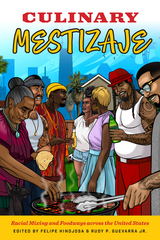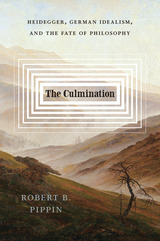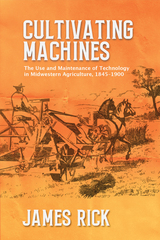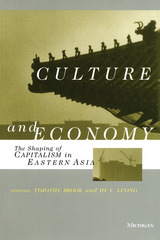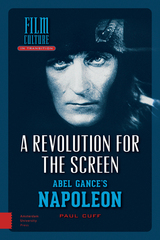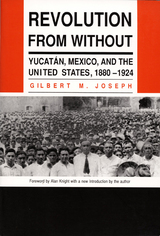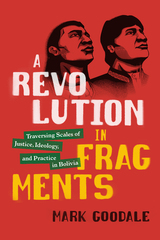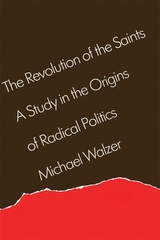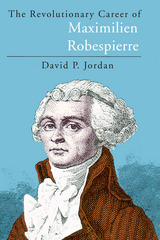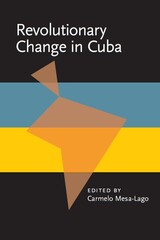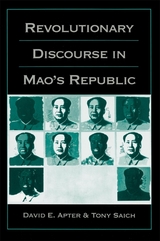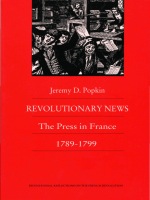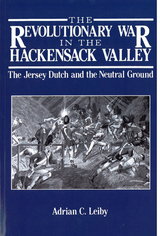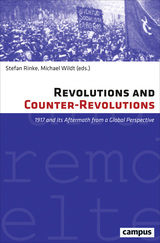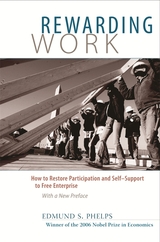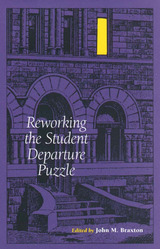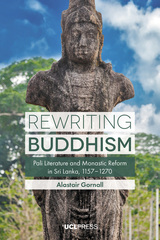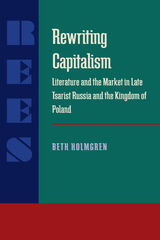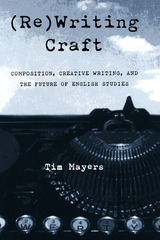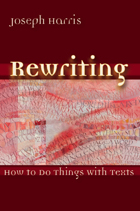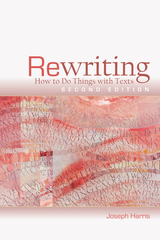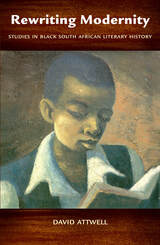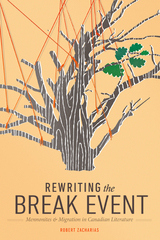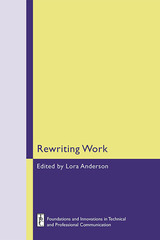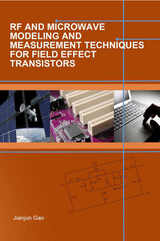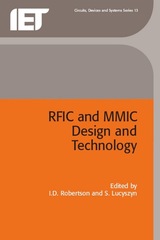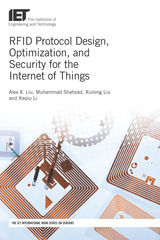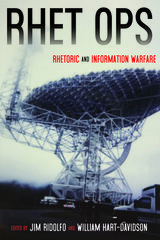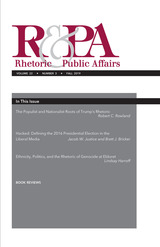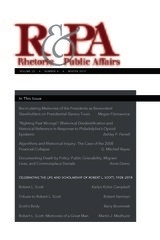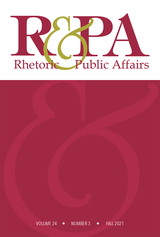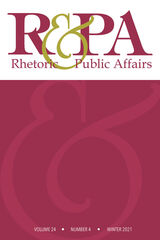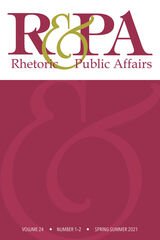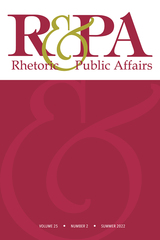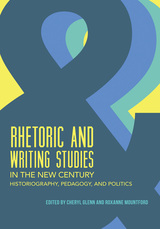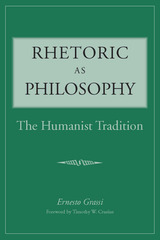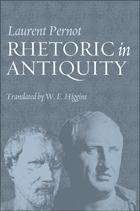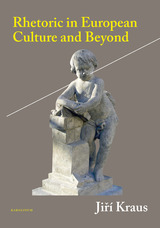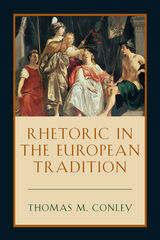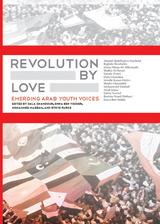 Revolution By Love: Emerging Arab Youth Voices
Dala Ghandour
Temple University Press Beginning in Tunisia and spreading across the Middle East and North Africa, everyday citizens stepped into the streets, staking their claim to a democratic future. The image of these protests captured the imagination of the world. Revolution by Love takes you inside these protests, onto those streets, and shares with you the stories of the individuals who made this historic moment possible. The book's contributors bear witness to the bravery of Libyans who faced down troops as they secured satellite technology to share with the world what was happening in Tripoli; the courage of doctors, facing gunfire, as they treated patients in Bahrain; and the everyday struggles of families in Gaza. At each moment, within every story shared, there is also a continual return to the love shared with friends and within families--a love that served as the foundation for the protests that changed the world. Contributors include: Ahmed Abdelhakim Hachelaf, Raghda Abushahla, Muna Abbas Ali AlBuloushi, Shatha Al-Harazi, Samah Elmeri, Dala Ghandour, Mirelle Karam Halim, Shadin Hamaideh, Mohammed Masbah, Amal Matar, Salma Nazzal, Ibrahim Yousif Shebani, and Emna Ben Yedder.
Revolution, Democracy, Socialism: Selected Writings of V.I. Lenin
V. I. Lenin
Pluto Press, 2008 This is an entirely new collection of Lenin's writing. For the first time it brings together crucial shorter works, to show that Lenin held a life-long commitment to freedom and democracy. Le Blanc has written a comprehensive introduction, which gives an accessible overview of Lenin's life and work, and explains his relevance to political thought today.
Lenin has been much maligned in the mainstream, accused of viewing 'man as modeling clay' and of 'social engineering of the most radical kind.' However, in contrast to today's world leaders, who happily turn to violence to achieve their objectives, Lenin believed it impossible to reach his goals 'by any other path than that of political democracy.'
This collection will be of immense value to students encountering Lenin for the first time, and those looking for a new interpretation of one of the 20th century's most inspiring figures.
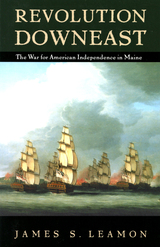 Revolution Downeast: The War for American Independence in Maine
James S. Leamon
University of Massachusetts Press, 1993 The history of the Revolution in Maine is the story of a people who did not really want a revolution--at least at first.
Since the middle of the seventeenth century, the powerful Massachusetts Bay Colony had exercised an increasing hegemony over the settlements downeast--a hegemony legalized in the Massachusetts royal charter of 1691. From then until 1820, when it became a state, Maine remained an integral part of Massachusetts. Geographically isolated from the Bay Colony by the province of New Hampshire, and dependent on Massachusetts for its very existence, Maine was indeed a colony, in every sense of the word.
The larger Massachusetts context has tended to obscure Maine as a legitimate object of study, nowhere more than in the period of the American Revolution. Even historians in Maine have slighted the period of the American Revolution. Where appropriate, town historians devote a chapter or so to the event, but only in the context of a particular community.
In his book, Leamon aims to meet that deficiency by drawing together town and general histories, specialized studies, and primary sources, both published and unpublished. He examines why and how Maine fought the Revolution and the changes that occurred in Maine during and after the war.
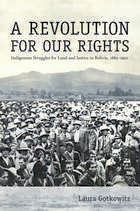 A Revolution for Our Rights: Indigenous Struggles for Land and Justice in Bolivia, 1880-1952
Laura Gotkowitz
Duke University Press, 2008 A Revolution for Our Rights is a critical reassessment of the causes and significance of the Bolivian Revolution of 1952. Historians have tended to view the revolution as the result of class-based movements that accompanied the rise of peasant leagues, mineworker unions, and reformist political projects in the 1930s. Laura Gotkowitz argues that the revolution had deeper roots in the indigenous struggles for land and justice that swept through Bolivia during the first half of the twentieth century. Challenging conventional wisdom, she demonstrates that rural indigenous activists fundamentally reshaped the military populist projects of the 1930s and 1940s. In so doing, she chronicles a hidden rural revolution—before the revolution of 1952—that fused appeals for equality with demands for a radical reconfiguration of political power, landholding, and rights. Gotkowitz combines an emphasis on national political debates and congresses with a sharply focused analysis of Indian communities and large estates in the department of Cochabamba. The fragmented nature of Cochabamba’s Indian communities and the pioneering significance of its peasant unions make it a propitious vantage point for exploring contests over competing visions of the nation, justice, and rights. Scrutinizing state authorities’ efforts to impose the law in what was considered a lawless countryside, Gotkowitz shows how, time and again, indigenous activists shrewdly exploited the ambiguous status of the state’s pro-Indian laws to press their demands for land and justice. Bolivian indigenous and social movements have captured worldwide attention during the past several years. By describing indigenous mobilization in the decades preceding the revolution of 1952, A Revolution for Our Rights illuminates a crucial chapter in the long history behind present-day struggles in Bolivia and contributes to an understanding of indigenous politics in modern Latin America more broadly.
A Revolution for the Screen: Abel Gance's Napoleon
Paul Cuff
Amsterdam University Press, 2015 Abel Gance's silent masterpiece, Napoleon, was given a limited run on its debut in 1927, but soon afterwards distributors in France and America, unwilling to deal with its nine-hour running time, subjected it to savage cuts - with devastating results for the movie and for film history. The struggle across ensuing decades to restore and reintegrate Gance's film has formed a backdrop to an array of formal, contextual, and ideological battles. In this book, Paul Cuff takes account of those battles and challenges received opinion on Gance's view of both his film and its subject.
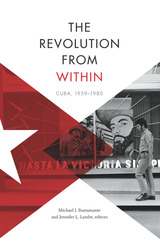 The Revolution from Within: Cuba, 1959–1980
Michael J. Bustamante and Jennifer L. Lambe, editors
Duke University Press, 2019 What does the Cuban Revolution look like “from within?" This volume proposes that scholars and observers of Cuba have too long looked elsewhere—from the United States to the Soviet Union—to write the island's post-1959 history. Drawing on previously unexamined archives, the contributors explore the dynamics of sociopolitical inclusion and exclusion during the Revolution's first two decades. They foreground the experiences of Cubans of all walks of life, from ordinary citizens and bureaucrats to artists and political leaders, in their interactions with and contributions to the emerging revolutionary state. In essays on agrarian reform, the environment, dance, fashion, and more, contributors enrich our understanding of the period beginning with the utopic mobilizations of the early 1960s and ending with the 1980 Mariel boatlift. In so doing, they offer new perspectives on the Revolution that are fundamentally driven by developments on the island. Bringing together new historical research with comparative and methodological reflections on the challenges of writing about the Revolution, The Revolution from Within highlights the political stakes attached to Cuban history after 1959.
Contributors. Michael J. Bustamante, María A. Cabrera Arús, María del Pilar Díaz Castañón, Ada Ferrer, Alejandro de la Fuente, Reinaldo Funes Monzote, Lillian Guerra, Jennifer L. Lambe, Jorge Macle Cruz, Christabelle Peters, Rafael Rojas, Elizabeth Schwall, Abel Sierra Madero
Revolution From Without: Yucatan, Mexico, and the United States, 1880–1924
Gilbert M. Joseph
Duke University Press, 1988 "In addition to the relevance provided by contemporary events, the republication of Revolution from Without comes at a particularly effervescent moment in Latin American revolutionary studies. An ongoing discourse among political sociologists, anthropologists and historians has greatly enriched our understanding of the political economy and social history of revolutions and popular insurgencies."—from the preface to the paperback edition
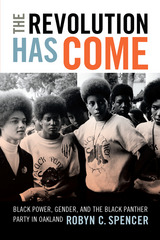 The Revolution Has Come: Black Power, Gender, and the Black Panther Party in Oakland
Robyn C. Spencer
Duke University Press, 2016 In The Revolution Has Come Robyn C. Spencer traces the Black Panther Party's organizational evolution in Oakland, California, where hundreds of young people came to political awareness and journeyed to adulthood as members. Challenging the belief that the Panthers were a projection of the leadership, Spencer draws on interviews with rank-and-file members, FBI files, and archival materials to examine the impact the organization's internal politics and COINTELPRO's political repression had on its evolution and dissolution. She shows how the Panthers' members interpreted, implemented, and influenced party ideology and programs; initiated dialogues about gender politics; highlighted ambiguities in the Panthers' armed stance; and criticized organizational priorities. Spencer also centers gender politics and the experiences of women and their contributions to the Panthers and the Black Power movement as a whole. Providing a panoramic view of the party's organization over its sixteen-year history, The Revolution Has Come shows how the Black Panthers embodied Black Power through the party's international activism, interracial alliances, commitment to address state violence, and desire to foster self-determination in Oakland's black communities.
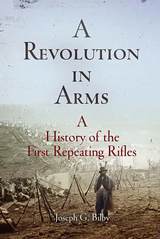 A Revolution in Arms: A History of the First Repeating Rifles
Joseph G. Bilby
Westholme Publishing, 2005 The Civil War-Era Invention That Changed How Wars Are Fought
Historians often call the American Civil War the first modern war, pointing to the use of observation balloons, the telegraph, trains, mines, ironclad ships, and other innovations. Although recent scholarship has challenged some of these “firsts,” the war did witness the introduction of the first repeating rifles. No other innovation of the turbulent 1860s would have a greater effect on the future of warfare. In A Revolution in Arms: A History of the First Repeating Rifles, historian Joseph G. Bilby unfolds the fascinating story of how two New England inventors, Benjamin Henry and Christopher Spencer, each combined generations of cartridge and rifle technology to develop reliable repeating rifles. In a stroke, the Henry rifle and Spencer rifle and carbine changed warfare forever, accelerating the abandonment of the formal battle line tactics of previous generations and when properly applied, repeating arms could alter the course of a battle. Although slow to enter service, the repeating rifle soon became a sought after weapon by both Union and Confederate troops. Oliver Winchester purchased the rights to the Henry and transformed it into “the gun that won the West.” The Spencer, the most famous of all Civil War small arms, was the weapon of choice for Federal cavalrymen. The revolutionary technology represented by repeating arms used in the American Civil War, including self-contained metallic cartridges, large capacity magazines, and innovative cartridge feeding systems, was copied or adapted by arms manufacturers around the world, and these features remain with us today.
A Revolution in Fragments: Traversing Scales of Justice, Ideology, and Practice in Bolivia
Mark Goodale
Duke University Press, 2019 The years between 2006 and 2015, during which Evo Morales became Bolivia's first indigenous president, have been described as a time of democratic and cultural revolution, world renewal (Pachakuti), reconstituted neoliberalism, or simply “the process of change.” In A Revolution in Fragments Mark Goodale unpacks these various analytical and ideological frameworks to reveal the fragmentary and contested nature of Bolivia's radical experiments in pluralism, ethnic politics, and socioeconomic planning. Privileging the voices of social movement leaders, students, indigenous intellectuals, women's rights activists, and many others, Goodale uses contemporary Bolivia as an ideal case study with which to theorize the role that political agency, identity, and economic equality play within movements for justice and structural change.
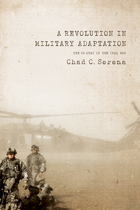 A Revolution in Military Adaptation: The US Army in the Iraq War
Chad C. Serena
Georgetown University Press, 2011 During the early years of the Iraq War, the US Army was unable to translate initial combat success into strategic and political victory. Iraq plunged into a complex insurgency, and defeating this insurgency required beating highly adaptive foes. A competition between the hierarchical and vertically integrated army and networked and horizontally integrated insurgents ensued. The latter could quickly adapt and conduct networked operations in a decentralized fashion; the former was predisposed to fighting via prescriptive plans under a centralized command and control. To achieve success, the US Army went through a monumental process of organizational adaptation—a process driven by soldiers and leaders that spread throughout the institution and led to revolutionary changes in how the army supported and conducted its operations in Iraq. How the army adapted and the implications of this adaptation are the subject of this indispensable study. Intended for policymakers, defense and military professionals, military historians, and academics, this book offers a solid critique of the army’s current capacity to adapt to likely future adversary strategies and provides policy recommendations for retaining lessons learned in Iraq.
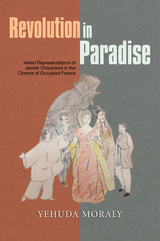 Revolution in Paradise: Veiled Representations of Jewish Characters in the Cinema of Occupied France
Yehuda Moraly
Sussex Academic Press, 2022 The era of the German Occupation of France constituted, surprisingly, a golden age for the arts. These works of art seem to be devoid of political impact. The purpose of this book is to show that, contrary to this accepted view, some of these films were intimately linked to the political situation. All five movies analyzed (Les Inconnus dans la maison;, dir. Henri Decoin, 1942; Les Visiteurs du Soir;, dir. Marcel Carn, 1942; L'Eternel retour;, dir. Jean Delannoy, 1943; Les Enfants du Paradis;, dir. Marcel Carn, 1943) present characters not identified as Jews but who exhibit negative "Jewish" traits, in contrast to the aristocratic characters whom they aspire to emulate. They demonstrate, implicitly, central themes of explicit anti-Semitic propaganda. Analysis of these films brings out the contradictory nature of European anti-Semitism. On one hand, the Jew is the anti-Christ, throttling the world with disgusting materialism while on the other hand, he is representative of an ancestral stifling morality, which it is time to abolish.
 Revolution in Psychology: Alienation to Emancipation
Ian Parker
Pluto Press, 2007 "A radical methodological approach to psychology that is open to social change - in an anti-capitalist, anti-racist and feminist politics." Antonio Negri
Psychology is meant to help people cope with the afflictions of modern society. But how useful is it? Ian Parker argues that current psychological practice has become part of the problem, rather than the solution.
Ideal for undergraduates, this book deconstructs the discipline to reveal the neoliberal sensitivities that underlie its theory and practice. Psychology focuses on the happiness of 'the individual'. Yet it neglects the fact that the happiness of the individual depends on their social and political surroundings.
Ian Parker argues that a new approach to psychology is needed. He offers an alternative vision, outlining how the discipline can be linked to political practice and how it can help people as part of a wider progressive agenda. This groundbreaking book is at the cutting edge of current thinking on the discipline and should be required reading on all psychology courses.
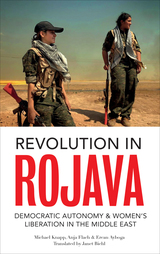 Revolution in Rojava: Democratic Autonomy and Women's Liberation in the Syrian Kurdistan
Michael Knapp, Ercan Ayboga, and Anja Flach
Pluto Press, 2016 “Their first-hand experiences and active participation in the anti-capitalist society being built in the region make this the first detailed account of the popular revolution….The definitive book so far on Rojava."― Morning Star
Revolution in Rojava tells the story of Rojava's groundbreaking experiment in what they call democratic confederalism, a communally organized democracy that is fiercely anti-capitalist and committed to female equality, while rejecting reactionary nationalist ideologies.
Rooted in the ideas of imprisoned Kurdish leader Abdullah Ocalan, the system is built on effective gender quotas, bottom-up democratic structures, far-sighted ecological policies, and a powerful militancy that has allowed the region to keep ISIS at bay.
Given the widespread violence and suffering in Syria, it's not unreasonable that outsiders look at the situation as unrelentingly awful. And while the reality of the devastation is undeniable, there is reason for hope in at least one small pocket of the nation: the cantons of Rojava in Syrian Kurdistan, where in the wake of war people are quietly building one of the most progressive societies in the world today. Chapters here include:
*Rojava's Diverse Cultures
*Democratic Confederalism
*The Liberation
*A Women's Revolution
*Democratic Autonomy in Rojava
*Civil Society Associations
*The Theory of the Rose: Defense
*The New Justice System
*Democratization of Education
*Health Care
*The Social Economy
*Ecological Challenges
This first full-length study of democratic developments in Rojava tells an extraordinary and powerfully hopeful story of a little-known battle for true freedom in dark times. With excellent first-hand background information about this important, but little understood struggle, Revolution in Rojava will educate and inspire the reader to learn more about Rojava, Syria, and the fight for change in one of the world’s most dangerous regions.
 Revolution in Science
I. Bernard Cohen
Harvard University Press, 1985 Only a scholar as rich in learning as I. Bernard Cohen could do justice to a theme so subtle and yet so grand. Spanning five centuries and virtually all of scientific endeavor, Revolution in Science traces the nuances that differentiate both scientific revolutions and human perceptions of them, weaving threads of detail from physics, mathematics, behaviorism, Freud, atomic physics, and even plate tectonics and molecular biology, into the larger fabric of intellectual history.
How did “revolution,” a term from the physical sciences, meaning a turning again and implying permanence and recurrence—the cyclical succession of the seasons, the “revolutions” of the planets in their orbits—become transformed into an expression for radical change in political and socioeconomic affairs, then become appropriated once again to the sciences?
How have political revolutions—French, American, Bolshevik—and such intellectual forces as Darwinism further modified the concept, from revolution in science as a dramatic break with the past to the idea that science progresses by the slow accumulation of knowledge? And what does each transformation in each historical period tell us about the deep conceptual changes in our image of the scientist and scientific activity?
Cohen’s exploration seeks to uncover nothing less than the nature of all scientific revolutions, the stages by which they occur, their time scale, specific criteria for determining whether or not there has been a revolution, and the creative factors in producing a revolutionary new idea. His book is a probing analysis of the history of an idea and one of the most impressive surveys of the history of science ever undertaken.
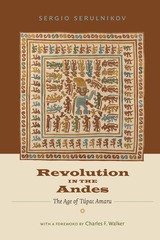 Revolution in the Andes: The Age of Túpac Amaru
Sergio Serulnikov
Duke University Press, 2013 Revolution in the Andes is an in-depth history of the Túpac Amaru insurrection, the largest and most threatening indigenous challenge to Spanish rule in the Andean world after the Conquest. Between 1780 and 1782, insurgent armies were organized throughout the Andean region. Some of the oldest and most populous cities in this region—including Cusco, La Paz, Puno, and Oruro—were besieged, assaulted, or occupied. Huge swaths of the countryside fell under control of the rebel forces. While essentially an indigenous movement, the rebellion sometimes attracted mestizo and Creole support for ousting the Spanish and restoring rule of the Andes to the land's ancestral owners. Sergio Serulnikov chronicles the uprisings and the ensuing war between rebel forces and royalist armies, emphasizing that the insurrection was comprised of several regional movements with varied ideological outlooks, social makeup, leadership structures, and expectations of change.
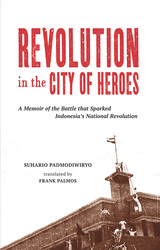 Revolution in the City of Heroes: A Memoir of the Battle that Sparked Indonesia's National Revolution
Suhario Padmodiwiryo
National University of Singapore Press, 2016 The diary of 24-year-old Indonesian medical student Suhario Padmodiwiryo,
alias ‘Hario Kecik,” Revolution in the City of Heroes is an evocative first-hand
account of the popular uprising in Surabaya. It vividly portrays the chaotic swirl
of events and the heady emotion of young people ready to sacrifice their lives
for independence.
Newly liberated from nearly four brutal years under Japanese control, the
people of Indonesia faced great uncertainty in October 1945. As the British
Army attempted to take control of the city of Surabaya, maintain order and
deal with surrendered Japanese personnel, their actions were interpreted by
the young residents of Surabaya as a plan to restore Dutch colonial rule. In
response, the youth of the city seized Japanese arms and repelled the force sent
to occupy the city. They then held off British reinforcements for two weeks,
battling tanks and heavy artillery with little more than light weapons and sheer
audacity. Though eventually defeated, Surabaya’s defenders had set the stage
for Indonesia’s national revolution.
Revolution in the Echo Chamber: Audio Drama's Past, Present and Future
Leslie McMurtry
Intellect Books, 2019 Revolution in the Echo Chamber is a sociohistorical analysis of British and American radio and audio drama from 1919 to present day. This volume examines the aesthetic, cultural, and technical elements of audio drama along with its context within the literary canon. In addition to the form and development of aural drama, Leslie Grace McMurtry provides an exploration of mental imagery generation in relation to its reception and production. Building on historical analysis, Revolution in the Echo Chamber provides contemporary perspective, drawing on trends from the current audio drama environment to analyze how people listen to audio drama, including podcast drama, today--and how they might listen in the future.
Revolution in Time: Clocks and the Making of the Modern World, Revised and Enlarged Edition
David S. Landes
Harvard University Press, 2000 More than a decade after the publication of his dazzling book on the cultural, technological, and manufacturing aspects of measuring time and making clocks, David Landes has significantly expanded Revolution in Time.
In a new preface and scores of updated passages, he explores new findings about medieval and early-modern time keeping, as well as contemporary hi-tech uses of the watch as mini-computer, cellular phone, and even radio receiver or television screen. While commenting on the latest research, Landes never loses his focus on the historical meaning of time and its many perceptions and uses, questions that go beyond history, that involve philosophers and possibly, theologians and literary folk as well.
 The Revolution in Venezuela: Social and Political Change under Chávez
Thomas Ponniah
Harvard University Press, 2011 Is Venezuela’s Bolivarian revolution under Hugo Chávez truly revolutionary? Most books and articles tend to view the Chávez government in an either-or fashion. Some see the president as the shining knight of twenty-first-century socialism, while others see him as an avenging Stalinist strongman. Despite passion on both sides, the Chávez government does not fall easily into a seamless fable of emancipatory or authoritarian history, as these essays make clear.
A range of distinguished authors consider the nature of social change in contemporary Venezuela and explore a number of themes that help elucidate the sources of the nation’s political polarization. The chapters range from Fernando Coronil’s “Bolivarian Revolution,” which examines the relationship between the state’s social body (its population) and its natural body (its oil reserves), to an insightful look at women’s rights by Cathy A. Rakowski and Gioconda Espina. This volume shows that, while the future of the national process is unclear, the principles elaborated by the Chávez government are helping articulate a new Latin American left.
 Revolution Interrupted: Farmers, Students, Law, and Violence in Northern Thailand
Tyrell Haberkorn; Foreword by Thongchai Winichakul
University of Wisconsin Press, 2011 In October 1973 a mass movement forced Thailand’s prime minister to step down and leave the country, ending nearly forty years of dictatorship. Three years later, in a brutal reassertion of authoritarian rule, Thai state and para-state forces quashed a demonstration at Thammasat University in Bangkok. In Revolution Interrupted, Tyrell Haberkorn focuses on this period when political activism briefly opened up the possibility for meaningful social change. Tenant farmers and their student allies fomented revolution, she shows, not by picking up guns but by invoking laws—laws that the Thai state ultimately proved unwilling to enforce.
In choosing the law as their tool to fight unjust tenancy practices, farmers and students departed from the tactics of their ancestors and from the insurgent methods of the Communist Party of Thailand. To first imagine and then create a more just future, they drew on their own lived experience and the writings of Thai Marxian radicals of an earlier generation, as well as New Left, socialist, and other progressive thinkers from around the world. Yet their efforts were quickly met with harassment, intimidation, and assassinations of farmer leaders. More than thirty years later, the assassins remain unnamed.
Drawing on hundreds of newspaper articles, cremation volumes, activist and state documents, and oral histories, Haberkorn reveals the ways in which the established order was undone and then reconsolidated. Examining this turbulent period through a new optic—interrupted revolution—she shows how the still unnameable violence continues to constrict political opportunity and to silence dissent in present-day Thailand.
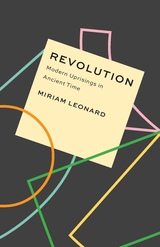 Revolution: Modern Uprisings in Ancient Time
Miriam Leonard
University of Chicago Press, 2025 A consideration of how modern revolutions have employed tropes of classical antiquity.
Despite its Latin etymology, “revolution” in its modern understanding arguably did not exist in antiquity, and revolution as we know it today is considered by many theorists to be a term born in modernity. While they certainly had times of momentous political upheaval, the Greeks and Romans tended to understand such events as part of a narrative of political continuity rather than novelty or rupture. Nevertheless, modern revolutions have repeatedly appropriated tropes of classical discourse, such as freedom, tyranny, tragedy, and fraternity.
With this book, Miriam Leonard offers a conceptual history of revolution, unraveling modernity’s yearning for the new and questioning why ancient concepts continue to play such an important role in political uprisings. Leonard looks at examples of appeals to antiquity during the French and Haitian Revolutions, in anticolonial struggles, and feminist and queer movements and considers works of theorists such as Karl Marx, Hannah Arendt, and Sigmund Freud that foreground an engagement with antiquity.
 The Revolution of 1800: Democracy, Race, and the New Republic
James Horn
University of Virginia Press, 2002 George W. Bush and Al Gore were by no means the first presidential hopefuls to find themselves embroiled in a hotly contested electoral impasse. Two hundred years earlier, Thomas Jefferson and John Adams endured arguably the most controversial and consequential election in American history. As the result of an intensely divided party process--the Federalists and the Republicans each convinced that the other would destroy the new nation if in control--the electoral system produced a tie, throwing the final decision to a House vote. Focusing on the wide range of possible outcomes of the 1800-1801 melee, this collection of essays situates the American "Revolution of 1800o in a broad context of geopolitical and racial developments in the Atlantic world as a whole. In essays written expressly for this volume, leading historians of the period examine the electoral, social, and political outcome of Jefferson's election in discussions strikingly relevant in the aftermath of the 2000 election.
Contributors
Joyce Appleby, University of California, Los Angeles
Michael Bellesiles, Emory University
Jeanne Boydston, University of Wisconsin
Seth Cotlar, Willamette University
Gregory Evans Dowd, University of Notre Dame
Laurent Dubois, Michigan State University
Douglas R. Egerton, Le Moyne College, Syracuse
Joanne Freeman, Yale University
James E. Lewis Jr., independent scholar
Robert M. S. McDonald, United States Military Academy, West Point
James Oakes, City University of New York Graduate Center
Jeffrey Pasley, University of Missouri, Columbia
Jack N. Rakove, Stanford University
Bethel Saler, Haverford College
James Sidbury, University of Texas
Alan Taylor, University of California, Davis
The Editors
James Horn is Saunders Director of the International Center for Jefferson Studies at Monticello and author of Adapting to a New World: English Society in the Seventeenth-Century Chesapeake.
Jan Ellen Lewis is Professor of History and Director of the Graduate History Program at Rutgers University, the author of The Pursuit of Happiness: Family Values in Jefferson's Virginia, and coeditor with Peter S. Onuf of Sally Hemings and Thomas Jefferson: History, Memory, and Civic Culture (Virginia).
Peter S. Onuf, Thomas Jefferson Foundation Professor of History at the University of Virginia, is the author of Jefferson's Empire: The Language of American Nationhood (Virginia).
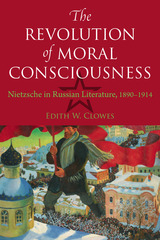 The Revolution of Moral Consciousness: Nietzsche in Russian Literature, 1890-1914
Edith W. Clowes
Northern Illinois University Press, 2018 No other thinker so engaged the Russian cultural imagination of the early twentieth century as did Friedrich Nietzche. The Revolution of Moral Consciousness shows how Nietzschean thought influenced the brilliant resurgence of literary life that started in the 1890s and continued for four decades. Through an analysis of the Russian encounter with Nietzsche, Edith Clowes defines the shift in ethical and aesthetic vision that motivated Russia's unprecedented artistic renascence and at the same time led its followers to the brink of cultural despair.
Clowes shows how in the last years of the nineteenth century a diverse array of writers and critics discovered Nietzsche's thought, embracing or repudiating it with equal vigor. The literary storm brewing around Nietzsche and the concurrent relaxation of censorship combined to attract a public eager to follow the new intellectual fashion. Young writers, such as Andreev and Kuprin, welcomed the idea of the "superman" as a promising path to personal fulfillment. The tragic fates of their protagonists and the alluring gospel of the vulgar Zarathustra-like characters of such bestselling authors as Boborykin, Artsybashev, and Verbitskaia found enthusiastic, if indiscriminating, audiences ready to be "taught" how to "find themselves." By considering this Nietzschean cult, Clowes draws fresh insight into the nature of the budding popular-culture industry in Russia and the fast-growing reading public.
From this ferment emerged the greatest Russian literary voices of the early twentieth century. The revolutionary romantics, Gorky and Lunacharsky, sought in Nietzsche's writing a new vision of total social and cultural change. Merezhkovsky led a generation of mystic symbolists in the search for a literary myth of resurrection. Ivanov, Blok, and Belyi appropriated the image of the "crucified Dionysus" as the central symbol of spiritual transfiguration. Their encounters with Nietzschean thought disclose an even more profound creative struggle with their own cultural past and its established formulations of nation and individual, culture and history. Clowes uses the term future anxiety to speak of a creative mentality that strove to assert itself by diminishing the impact of powerful literary precursors, such as Tolstoi, Dostoevsky, and Solovyov, and opening to the imagination the vision of a future full of vast creative possibility.
 The Revolution of Peter the Great
James Cracraft
Harvard University Press, 2006 Many books chronicle the remarkable life of Russian tsar Peter the Great, but none analyze how his famous reforms actually took root and spread in Russia. In The Revolution of Peter the Great, James Cracraft offers a brilliant new interpretation of this pivotal era.
Linking together and transcending Peter's many reforms of state and society, Cracraft argues, was nothing less than a cultural revolution. New ways of dress, elite social behavior, navigation, architecture, and image-making emerged along with expansive vocabularies for labeling new objects and activities. Russians learned how to build and sail warships; train, supply, and command a modern army; operate a new-style bureaucracy; conduct diplomacy on a par with the other European states; apply modern science; and conceptualize the new governing system. Throughout, Peter remains the central figure, and Cracraft discusses the shaping events of the tsar's youth, his inner circle, the resistance his reforms engendered, and the founding of the city that would embody his vision--St. Petersburg, which celebrated its tercentenary in 2003.
By century's end, Russia was poised to play a critical role in the Napoleonic wars and boasted an elite culture about to burst into its golden age. In this eloquent book, Cracraft illuminates an astonishing transformation that had enormous consequences for both Russia and Europe, indeed the world.
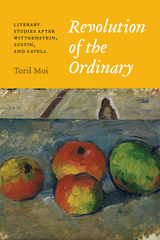 Revolution of the Ordinary: Literary Studies after Wittgenstein, Austin, and Cavell
Toril Moi
University of Chicago Press, 2017 This radically original book argues for the power of ordinary language philosophy—a tradition inaugurated by Ludwig Wittgenstein and J. L. Austin, and extended by Stanley Cavell—to transform literary studies. In engaging and lucid prose, Toril Moi demonstrates this philosophy’s unique ability to lay bare the connections between words and the world, dispel the notion of literature as a monolithic concept, and teach readers how to learn from a literary text.
Moi first introduces Wittgenstein’s vision of language and theory, which refuses to reduce language to a matter of naming or representation, considers theory’s desire for generality doomed to failure, and brings out the philosophical power of the particular case. Contrasting ordinary language philosophy with dominant strands of Saussurean and post-Saussurean thought, she highlights the former’s originality, critical power, and potential for creative use. Finally, she challenges the belief that good critics always read below the surface, proposing instead an innovative view of texts as expression and action, and of reading as an act of acknowledgment. Intervening in cutting-edge debates while bringing Wittgenstein, Austin, and Cavell to new readers, Revolution of the Ordinary will appeal beyond literary studies to anyone looking for a philosophically serious account of why words matter.
The Revolution of the Saints: A Study in the Origins of Radical Politics
Michael Walzer
Harvard University Press The Revolution of the Saints is a study, both historical and sociological, of the radical political response of the Puritans to disorder. It interprets and analyzes Calvinism as the first modern expression of an unremitting determination to transform on the basis of an ideology the existing political and moral order. Michael Walzer examines in detail the circumstances and ideological options of the Puritan intelligentsia and gentry. He sees Puritanism, in sharp contrast to some generally accepted views, as the political theory of intellectuals and gentlemen attempting to create a new government and society.
 Revolution on My Mind: Writing a Diary under Stalin
Jochen Hellbeck
Harvard University Press, 2006 Revolution on My Mind is a stunning revelation of the inner world of Stalin’s Russia. We see into the minds and hearts of Soviet citizens who recorded their lives during an extraordinary period of revolutionary fervor and state terror. Writing a diary, like other creative expression, seems nearly impossible amid the fear and distrust of totalitarian rule; but as Jochen Hellbeck shows, diary-keeping was widespread, as individuals struggled to adjust to Stalin’s regime.
Rather than protect themselves against totalitarianism, many men and women bent their will to its demands, by striving to merge their individual identities with the collective and by battling vestiges of the old self within. We see how Stalin’s subjects, from artists to intellectuals and from students to housewives, absorbed directives while endeavoring to fulfill the mandate of the Soviet revolution—re-creation of the self as a builder of the socialist society. Thanks to a newly discovered trove of diaries, we are brought face to face with individual life stories—gripping and unforgettably poignant.
The diarists’ efforts defy our liberal imaginations and our ideals of autonomy and private fulfillment. These Soviet citizens dreamed differently. They coveted a morally and aesthetically superior form of life, and were eager to inscribe themselves into the unfolding revolution. Revolution on My Mind is a brilliant exploration of the forging of the revolutionary self, a study without precedent that speaks to the evolution of the individual in mass movements of our own time.
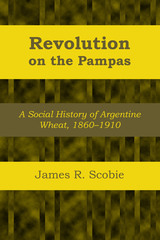 Revolution on the Pampas: A Social History of Argentine Wheat, 1860–1910
By James R. Scobie
University of Texas Press, 1964 On the Argentine pampas, between the years 1860 and 1910, a dramatic social and agricultural revolution took place. The haunts of wild cattle, native peoples, and gauchos were transformed into cultivated fields and rich pastures. A land that had produced only scrawny sheep and cattle became one of the world’s leading exporters of wheat, corn, beef, mutton, and wool. A country that had had only a sparse and scattered Spanish and mestizo population now boasted a metropolis of one and a half million, and a national population of eight million people, nearly a third of whom were born in Europe. These were significant changes, and wheat growing played a major role in all of them. This study traces the development of the Argentine wheat zone, focusing on the part wheat played in forming the Argentina of today. James R. Scobie begins his account with the first settlers who colonized Santa Fe in the 1850s and shows how they and thousands of other European immigrants converted this vast grassland into a world breadbasket. He explains why these small farmer-owners soon gave way to tenant farmers, and how crop farming developed primarily as servant to the predominant sheep and cattle interests. He expands on several factors responsible for this evolvement: the elimination of indigenous threat, the coming of the railroad, the agricultural policy—or lack of policy—of the Argentine government, and the urban orientation of the Argentine people. The railroads, by suppressing the building of other roads through the pampas, had the effect of isolating the wheatgrowers. By making the products of the pampas available to world markets, the railroads opened up new trade, which helped the growth of cities tremendously; but this very prosperity pushed the cost of land far beyond the wheatgrower’s ability to buy it. The result was a pampas without settlers, a frontier filled with migrant sharecroppers and tenant farmers, a land exploited but not possessed. Transiency as well as isolation became the common denominators of these families, who were forced to move every few years to make way for more valued tenants—sheep and cattle. They left behind them no schools, no churches, no roads, no villages. Immigrants came to labor but not to sink their roots in the pampas. Without sentimentality but with understanding and compassion, Scobie explores every facet of the lives of these laborers who created Argentina’s agricultural greatness. His examination of Argentina’s broad policies toward land, immigration, and tariffs shows that the national government had little lasting or effective interest in the country’s agricultural development. In a social sense, the thousands of immigrants who toiled the pampas were looked upon as the wild cattle or fertile soil—blessings which neither needed nor warranted official attention. Scobie’s conclusion is that Argentina got better than it deserved.
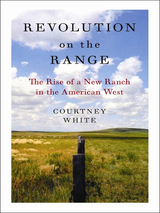 Revolution on the Range: The Rise of a New Ranch in the American West
Courtney White
Island Press, 2008 In the final decade of the twentieth century, the American West was at war. Battle lines had hardened, with environmentalists squarely on one side of the fence, and ranchers on the other. By the mid-1990s, debates over the region’s damaged land had devolved into political wrangling, bitter lawsuits, and even death-threats. Conventional wisdom told us those who wanted to work the land and those who wanted to protect it had fundamentally different—and irreconcilable—values.
In Revolution on the Range, Courtney White challenges that truism, heralding stories from a new American West where cattle and conservation go hand in hand. He argues that ranchers and environmentalists have more in common than they’ve typically admitted: a love of wildlife, a deep respect for nature, and a strong allergic reaction to suburbanization. The real conflict has not been over ethics, but approaches. Today, a new brand of ranching is bridging the divide by mimicking nature while still turning a profit.
Westerners are literally reinventing the ranch by confronting their own assumptions about nature, profitability, and each other. Ranchers are learning that new ideas can actually help preserve traditional lifestyles. Environmentalists are learning that protected landscapes aren’t always healthier than working ones. White, a self-proclaimed middle-class city boy, has learned there’s more to ranching than grit and cowboy boots.
The author’s own transformation from conflict-oriented environmentalist to radical centrist mirrors the change sweeping the region. As ranchers and environmentalists find common cause, they’re discovering new ways to live on—and preserve—the land they both love. Revolution on the Range is the story of that journey, and a heartening vision of the new American West.
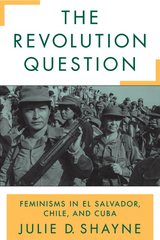 The Revolution Question: Feminisms in El Salvador, Chile, and Cuba
Shayne, Julie D.
Rutgers University Press, 2004 What do women do for revolutions? And what do revolutions do for women? Julie Shayne explores the roles of women in revolutionary struggles and the relationship of these movements to the emergence of feminism. Focusing upon the three very different cases of El Salvador, Chile, and Cuba, Shayne documents the roles of women in armed and unarmed political activities. She argues that women contribute to and participate in revolutionary movements in ways quite distinct from men. Despite the fact that their political contributions tend to be seen as less important than those of their male comrades, the roles that women play are actually quite significant to the expansion of revolutionary movements. Shayne also explains how, given the convergence of political and ideological factors, feminism is often born in the wake of revolutionary movements. As a result, revolutionary feminism is a struggle that addresses larger structures of political and economic inequalities. Based on extensive in-depth interviews with activists in all three countries, The Revolution Question offers new insight into the complex gender relations underlying revolutionary social movements and enables us to re-assess both the ways that women affect political struggle and the ways in which political struggle affects women.
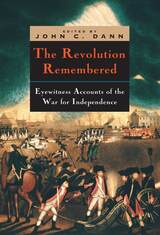 The Revolution Remembered: Eyewitness Accounts of the War for Independence
Edited by John C. Dann
University of Chicago Press, 1980 A classic oral history of the American Revolution, The Revolution Remembered uses 79 first-hand accounts from veterans of the war to provide the reader with the feel of what it must have been like to fight and live through America's bloody battle for independence.
"In a book fairly bursting with feats of daring, perhaps the most spectacular accomplishment of them all is this volume's transformation of its readers into the grandchildren of Revolutionary War soldiers. . . . An amazing gathering of 79 surrogate Yankee grandparents who tell us in their own words what they saw with their own eyes."—Elaine F. Weiss, Christian Science Monitor
"Fascinating. . . . [The soldiers'] details fill in significant shadows of history."—Henry Kisor, Chicago Sun-Times
"It's still good fun two centuries later, overhearing these experiences of the tumult of everyday life and seeing a front-lines view of one of the most unusual armies ever to fight, let alone win."—Richard Martin, Wall Street Journal
"One of the most important primary source discoveries from the era. A unique and fresh perspective."—Paul G. Levine, Los Angeles Times
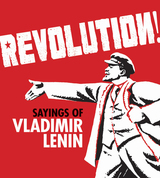 Revolution!: Sayings of Vladimir Lenin
Edited by the Bodleian Library
Bodleian Library Publishing, 2017 “Without a revolutionary theory there can be no revolutionary movement.” So wrote Vladimir Ilyich Lenin, leader of the Bolshevik Revolution and founder of the USSR. Lenin was profoundly aware of the power of words. As a prolific writer and orator, he used his words to launch a soaring critique of imperialist society and to theorize the development of the world’s first socialist state. Much of his writing was translated into English in order to further the socialist cause.
Revolution! Sayings of Vladimir Lenin is a compilation of Lenin’s most famous sayings, taken from speeches, lectures, letters, and recorded conversations. Together, they show his views on topics ranging from democracy to terrorism, from religion to Stalin’s untrustworthiness, and from education to music. Accompanied by a range of striking images, including contemporary propaganda posters, photographs, portraits, illustrations, and Soviet art, these aphoristic proclamations offer an insight into the atmosphere of pre- and post-revolutionary Russia and the mind of one of the twentieth century’s most defining political figures.
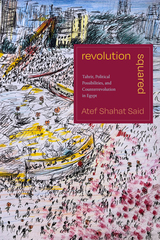 Revolution Squared: Tahrir, Political Possibilities, and Counterrevolution in Egypt
Atef Shahat Said
Duke University Press, 2024 In Revolution Squared Atef Shahat Said examines the 2011 Egyptian Revolution to trace the expansive range of liberatory possibilities and containment at the heart of every revolution. Drawing on historical analysis and his own participation in the revolution, Said outlines the importance of Tahrir Square and other physical spaces as well as the role of social media and digital spaces. He develops the notion of lived contingency—the ways revolutionary actors practice and experience the revolution in terms of the actions they do or do not take—to show how Egyptians made sense of what was possible during the revolution. Said charts the lived contingencies of Egyptian revolutionaries from the decade prior to the revolution’s outbreak to its peak and the so-called transition to democracy to the 2013 military coup into the present. Contrary to retrospective accounts and counterrevolutionary thought, Said argues that the Egyptian Revolution was not doomed to defeat. Rather, he demonstrates that Egyptians did not fully grasp their immense clout and that limited reformist demands reduced the revolution’s potential for transformation.
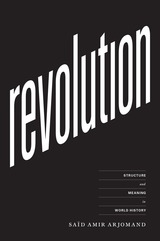 Revolution: Structure and Meaning in World History
Saïd Amir Arjomand
University of Chicago Press, 2019 A revolution is a discontinuity: one political order replaces another, typically through whatever violent means are available. Modern theories of revolutions tend neatly to bracket the French Revolution of 1789 with the fall of the Soviet Union two hundred years later, but contemporary global uprisings—with their truly multivalent causes and consequences—can overwhelm our ability to make sense of them.
In this authoritative new book, Saïd Amir Arjomand reaches back to antiquity to propose a unified theory of revolution. Revolution illuminates the stories of premodern rebellions from the ancient world, as well as medieval European revolts and more recent events, up to the Arab Spring of 2011. Arjomand categorizes revolutions in two groups: ones that expand the existing body politic and power structure, and ones that aim to erode—but paradoxically augment—their authority. The revolutions of the past, he tells us, can shed light on the causes of those of the present and future: as long as centralized states remain powerful, there will be room for greater, and perhaps forceful, integration of the politically disenfranchised.
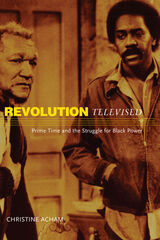 Revolution Televised: Prime Time and the Struggle for Black Power
Christine Acham
University of Minnesota Press, 2005 After a decadelong hiatus, African Americans once again began appearing regularly on television in the 1960s. Bill Cosby costarred on I Spy, Sammy Davis Jr. briefly hosted a variety show, and in 1968 Diahann Carroll debuted in the title role of Julia, the first television series to star an African American since the cancellation of Amos ’n’ Andy. Over the next ten years, shows with African American casts became more common; some, like Sanford and Son and Good Times, were hits with both black and white audiences. Yet many within the black community criticize these programs as perpetuating demeaning stereotypes and hampering the political progress made by African Americans.
In Revolution Televised, Christine Acham offers a more complex reading of this period in African American television history, finding within these programs opposition to dominant white constructions of African American identity. She explores the intersection of popular television and race as witnessed from the documentary coverage of the civil rights and Black Power movements, the personal politics of Flip Wilson and Soul Train’s Don Cornelius, and the ways in which notorious X-rated comic Redd Foxx reinvented himself for prime time.
Reflecting on both the potential of television to effect social change as well as its limitations, Acham concludes with analyses of Richard Pryor’s politically charged and short-lived sketch comedy show and the success of outspoken comic Chris Rock. Revolution Televised deftly illustrates how black television artists operated within the constraints of the television industry to resist and ultimately shape the mass media’s portrayal of African American life.
Christine Acham is assistant professor in African American and African studies at the University of California, Davis.
 The Revolution That Wasn’t: How Digital Activism Favors Conservatives
Jen Schradie
Harvard University Press, 2019 This surprising study of online political mobilization shows that money and organizational sophistication influence politics online as much as off, and casts doubt on the democratizing power of digital activism.
The internet has been hailed as a leveling force that is reshaping activism. From the Arab Spring and Occupy Wall Street to Black Lives Matter and #MeToo, digital activism seemed cheap, fast, and open to all. Now this celebratory narrative finds itself competing with an increasingly sinister story as platforms like Facebook and Twitter—once the darlings of digital democracy—are on the defensive for their role in promoting fake news. While hashtag activism captures headlines, conservative digital activism is proving more effective on the ground.
In this sharp-eyed and counterintuitive study, Jen Schradie shows how the web has become another weapon in the arsenal of the powerful. She zeroes in on workers’ rights advocacy in North Carolina and finds a case study with broad implications. North Carolina’s hard-right turn in the early 2010s should have alerted political analysts to the web’s antidemocratic potential: amid booming online organizing, one of the country’s most closely contested states elected the most conservative government in North Carolina’s history.
The Revolution That Wasn’t identifies the reasons behind this previously undiagnosed digital-activism gap. Large hierarchical political organizations with professional staff can amplify their digital impact, while horizontally organized volunteer groups tend to be less effective at translating online goodwill into meaningful action. Not only does technology fail to level the playing field, it tilts it further, so that only the most sophisticated and well-funded players can compete.
Revolution Until Victory?: The Politics and History of the PLO
Barry Rubin
Harvard University Press The Palestine Liberation Organization is now almost a government in Gaza and the West Bank. In this in-depth account of its ideology, strategy, and tactics, its relationship to other Arab states, and its confrontations with Israel, Barry Rubin documents how the PLO was transformed from revolutionary organization into the administrator of its own territory.
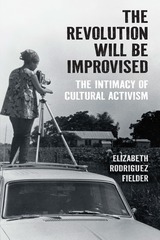 The Revolution Will Be Improvised: The Intimacy of Cultural Activism
Elizabeth Rodriguez Fielder
University of Michigan Press, 2024 The Revolution Will Be Improvised: The Intimacy of Cultural Activism traces intimate encounters between activists and local people of the civil rights movement through an archive of Black and Brown avant-gardism. In the 1960s, Student Nonviolent Coordinating Committee (SNCC) activists engaged with people of color working in poor communities to experiment with creative approaches to liberation through theater, media, storytelling, and craft making. With a dearth of resources and an abundance of urgency, SNCC activists improvised new methods of engaging with communities that created possibilities for unexpected encounters through programs such as The Free Southern Theater, El Teatro Campesino, and the Poor People’s Corporation.
Reading the output of these programs, Elizabeth Rodriguez Fielder argues that intimacy-making became an extension of participatory democracy. In doing so, Rodriguez Fielder supplants the success-failure binary for understanding social movements, focusing instead on how care work aligns with creative production. The Revolution Will Be Improvised returns to improvisation’s roots in economic and social necessity and locates it as a core tenet of the aesthetics of obligation, where a commitment to others drives the production and result of creative work. Thus, this book puts forward a methodology to explore the improvised, often ephemeral, works of art activism.
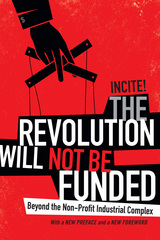 The Revolution Will Not Be Funded: Beyond the Non-Profit Industrial Complex
INCITE! Women of Color Against Violence
Duke University Press, 2017 A trillion-dollar industry, the US non-profit sector is one of the world's largest economies. From art museums and university hospitals to think tanks and church charities, over 1.5 million organizations of staggering diversity share the tax-exempt 501(c)(3) designation, if little else. Many social justice organizations have joined this world, often blunting political goals to satisfy government and foundation mandates. But even as funding shrinks, many activists often find it difficult to imagine movement-building outside the non-profit model. The Revolution Will Not Be Funded gathers essays by radical activists, educators, and non-profit staff from around the globe who critically rethink the long-term consequences of what they call the "non-profit industrial complex." Drawing on their own experiences, the contributors track the history of non-profits and provide strategies to transform and work outside them. Urgent and visionary, The Revolution Will Not Be Funded presents a biting critique of the quietly devastating role the non-profit industrial complex plays in managing dissent.
Contributors. Christine E. Ahn, Robert L. Allen, Alisa Bierria, Nicole Burrowes, Communities Against Rape and Abuse (CARA), William Cordery, Morgan Cousins, Ruth Wilson Gilmore, Stephanie Guilloud, Adjoa Florência Jones de Almeida, Tiffany Lethabo King, Paul Kivel, Soniya Munshi, Ewuare Osayande, Amara H. Pérez, Project South: Institute for the Elimination of Poverty and Genocide, Dylan Rodríguez, Paula X. Rojas, Ana Clarissa Rojas Durazo, Sisters in Action for Power, Andrea Smith, Eric Tang, Madonna Thunder Hawk, Ije Ude, Craig Willse
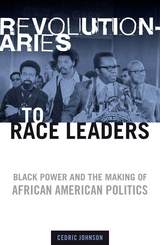 Revolutionaries to Race Leaders: Black Power and the Making of African American Politics
Cedric Johnson
University of Minnesota Press, 2007 The Black Power movement represented a key turning point in American politics. Disenchanted by the hollow progress of federal desegregation during the 1960s, many black citizens and leaders across the United States demanded meaningful self-determination. The popular movement they created was marked by a vigorous artistic renaissance, militant political action, and fierce ideological debate. Exploring the major political and intellectual currents from the Black Power era to the present, Cedric Johnson reveals how black political life gradually conformed to liberal democratic capitalism and how the movement’s most radical aims—the rejection of white aesthetic standards, redefinition of black identity, solidarity with the Third World, and anticapitalist revolution—were gradually eclipsed by more moderate aspirations. Although Black Power activists transformed the face of American government, Johnson contends that the evolution of the movement as a form of ethnic politics restricted the struggle for social justice to the world of formal politics. Johnson offers a compelling and theoretically sophisticated critique of the rhetoric and strategies that emerged in this period. Drawing on extensive archival research, he reinterprets the place of key intellectual figures, such as Harold Cruse and Amiri Baraka, and influential organizations, including the African Liberation Support Committee, the National Black Political Assembly, and the National Black Independent Political Party in postsegregation black politics, while at the same time identifying the contradictions of Black Power radicalism itself. Documenting the historical retreat from radical, democratic struggle, Revolutionaries to Race Leaders ultimately calls for the renewal of popular struggle and class-conscious politics. Cedric Johnson is assistant professor of political science at Hobart and William Smith Colleges.
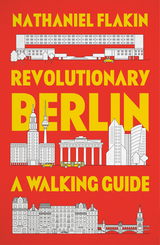 Revolutionary Berlin: A Walking Guide
Nathaniel Flakin
Pluto Press, 2022 'Inspirational - with a deliciously bone-dry Berlinische humour' - Owen Hatherley
Few European cities can boast a history as storied and tumultuous as that of Berlin. For more than 150 years it has been at the center of revolutionary politics; of era-defining struggles between the Left and the Right. It has been bombed, rebuilt and carved in two.
In Revolutionary Berlin, veteran tour guide Nathaniel Flakin invites you to stand in the places where this history was written, and to follow in the footsteps of those who helped write it. Through nine self-guided tours illustrated with maps and photographs, readers enter the heady world of 19th century anti-colonial struggles, the 1918 November Revolution and the 1987 May Day riots - encountering the city's workers, queer community and radical women along the way.
The first English-language guidebook to tell the story of Berlin's radical history, this is a must-have for Berliners and visitors alike.
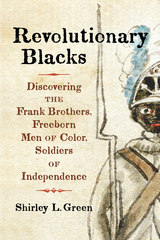 Revolutionary Blacks: Discovering the Frank Brothers, Freeborn Men of Color, Soldiers of Independence
Shirley L. Green
Westholme Publishing, 2023 William and Benjamin Frank joined the Second Rhode Island Regiment in the spring of 1777, following the tradition of military service established by their father, a veteran of the French and Indian War. The brothers became part of a cohort of free Black soldiers serving in an integrated Continental Army. The Second Rhode Island saw action along the Delaware River in the defense of Fort Mercer and the battle of Red Bank, before falling back with the rest of the army to Valley Forge. Following the brutal winter of 1777–1778 and the pivotal Battle of Monmouth, New Jersey, in June 1778, veteran soldiers of color from the Second Rhode Island, including the Frank brothers, were transferred to the newly segregated First Rhode Island. This regiment was composed of Black and Native American soldiers, including enslaved men who were promised their freedom in exchange for service. Allowing formerly enslaved men to serve was reluctantly authorized by George Washington to address manpower shortages, but in exchange, he introduced segregation into the army. The “Black Regiment,” as it became known returned to its home state, where it fought with distinction at the Battle of Rhode Island in August. While encamped near Providence in February 1780, Ben Frank deserted and ended up in British service. His brother William remained with his unit and served during the American victory at Yorktown, Virginia, where the Black Regiment once again demonstrated its effectiveness. William was honorably discharged and returned to Rhode Island, while Ben eventually relocated to Nova Scotia with other loyalists.
In Revolutionary Blacks: Discovering the Frank Brothers, Freeborn Men of Color, Soldiers of Independence historian Shirley L. Green takes the reader on a journey based on her family’s history, rooted in its oral tradition. Putting together the pieces of this puzzle through archival research, interviews, and DNA evidence, the author authenticates and expands the family’s oral history. In addition to providing context and substance to the Black experience during the war years, the author underscores the significant distinction between free Blacks in military service and those who had been enslaved, and how they responded in different ways to the harsh realities of racism. An original and important contribution to American history, Revolutionary Blacks presents a complex account of Black life during the Revolutionary Era and demonstrates that free men of color shared with white soldiers the desire to improve their condition in life and to maintain their families safely in postcolonial North America.
The Revolutionary Career of Maximilien Robespierre
David P. Jordan
University of Chicago Press, 1989 As it changed forever the political landscape of the modern world, the French Revolution was driven by a new type of personality: the confirmed, self-aware revolutionary. Maximilien Robespierre originated the role and embodied its ideological essence and extremes; the self that he projected to the people was equated with the ideals for which he strove. In creating this intellectual biography of so enigmatic a figure, David Jordan has stressed the words of the man about himself. With great imagination and insight, Jordan places Robespierre's self-conceptualization within the context of events and explains how Robespierre "The Incorruptible"—a man seen by contemporaries as virtuous—could not only equate justice with vengeance and demand it of the people, but also stand as its symbol before the world.
Revolutionary Change in Cuba
Carmelo Mesa-Lago
University of Pittsburgh Press, 1972
Cuba has been transformed more radically within one decade than almost any society in recent history. Yet the Cuban Revolution is poorly understood abroad because of its physical and political isolation, the controversies between adherents of the old and new regimes, and the murky skirmishes of the cold war.
This collection of essays is a comprehensive and authoritative study of almost all major aspects of socialist Cuba. It draws together the talents of the ablest group of Cuban specialists ever represented in a single volume.
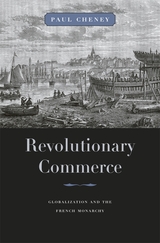 Revolutionary Commerce: Globalization and the French Monarchy
Paul Cheney
Harvard University Press, 2010 Combining the intellectual history of the Enlightenment, Atlantic history, and the history of the French Revolution, Paul Cheney explores the political economy of globalization in eighteenth-century France.
The discovery of the New World and the rise of Europe's Atlantic economy brought unprecedented wealth. It also reordered the political balance among European states and threatened age-old social hierarchies within them. In this charged context, the French developed a "science of commerce" that aimed to benefit from this new wealth while containing its revolutionary effects. Montesquieu became a towering authority among reformist economic and political thinkers by developing a politics of fusion intended to reconcile France's aristocratic society and monarchical state with the needs and risks of international commerce. The Seven Years' War proved the weakness of this model, and after this watershed reforms that could guarantee shared prosperity at home and in the colonies remained elusive. Once the Revolution broke out in 1789, the contradictions that attended the growth of France's Atlantic economy helped to bring down the constitutional monarchy.
Drawing upon the writings of philosophes, diplomats, consuls of commerce, and merchants, Cheney rewrites the history of political economy in the Enlightenment era and provides a new interpretation of the relationship between capitalism and the French Revolution.
 Revolutionary Constitutions: Charismatic Leadership and the Rule of Law
Bruce Ackerman
Harvard University Press, 2019 A robust defense of democratic populism by one of America’s most renowned and controversial constitutional scholars—the award-winning author of We the People.
Populism is a threat to the democratic world, fuel for demagogues and reactionary crowds—or so its critics would have us believe. But in his award-winning trilogy We the People, Bruce Ackerman showed that Americans have repeatedly rejected this view. Now he draws on a quarter century of scholarship in this essential and surprising inquiry into the origins, successes, and threats to revolutionary constitutionalism around the world. He takes us to India, South Africa, Italy, France, Poland, Burma, Israel, and Iran and provides a blow-by-blow account of the tribulations that confronted popular movements in their insurgent campaigns for constitutional democracy. Despite their many differences, populist leaders such as Nehru, Mandela, and de Gaulle encountered similar dilemmas at critical turning points, and each managed something overlooked but essential. Rather than deploy their charismatic leadership to retain power, they instead used it to confer legitimacy to the citizens and institutions of constitutional democracy.
Ackerman returns to the United States in his last chapter to provide new insights into the Founders’ acts of constitutional statesmanship as they met very similar challenges to those confronting populist leaders today. In the age of Trump, the democratic system of checks and balances will not survive unless ordinary citizens rally to its defense. Revolutionary Constitutions shows how activists can learn from their predecessors’ successes and profit from their mistakes, and sets up Ackerman’s next volume, which will address how elites and insiders co-opt and destroy the momentum of revolutionary movements.
Revolutionary Discourse in Mao’s Republic
David E. Apter and Tony Saich
Harvard University Press, 1994 What does the Chinese Communist Revolution teach us about the relationship between political discourse and real experiences and events? This unique interpretation of the revolutionary process in China uses empirical evidence as well as concepts from contemporary cultural studies to probe this significant question. David Apter and Tony Saich base their analysis on recently available primary sources on party history, English- and Chinese-language accounts of the Long March and Yan’an period, and interviews with veterans and their relatives.
Written by an eminent political theorist well seasoned in comparative development and an internationally recognized China scholar, and abounding in new approaches to central issues, this incisive analysis will be welcomed by social theorists and China scholars alike.
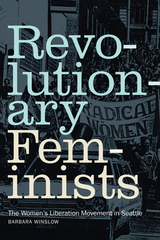 Revolutionary Feminists: The Women's Liberation Movement in Seattle
Barbara Winslow
Duke University Press, 2023 Revolutionary Feminists tells the story of the radical women’s liberation movement in Seattle in the 1960s and 1970s from the perspective of a founding member, Barbara Winslow. Drawing on her collection of letters, pamphlets, and photographs as well as newspaper accounts, autobiographies, and interviews, Winslow emphasizes the vital role that Black women played in the women’s liberation movement to create meaningful intersectional coalitions in an overwhelmingly White city. Winslow brings the voices and visions of those she calls the movement’s “ecstatic utopians” to life. She charts their short-term successes and lasting achievements, from organizing women at work and campaigning for subsidized childcare to creating women-centered rape crisis centers, health clinics, and self-defense programs. The Seattle movement was essential to winning the first popular vote in the United States to liberalize abortion laws. Despite these achievements, Winslow critiques the failure of the movement's White members to listen to Black, Latina, Indigenous, and Asian American and Pacific Islander feminist activists. Reflecting on the Seattle movement’s accomplishments and shortcomings, Winslow offers a model for contemporary feminist activism.
 A Revolutionary Friendship: Washington, Jefferson, and the American Republic
Francis D. Cogliano
Harvard University Press, 2024 The first full account of the relationship between George Washington and Thomas Jefferson, countering the legend of their enmity while drawing vital historical lessons from the differences that arose between them.
Martha Washington’s worst memory was the death of her husband. Her second worst was Thomas Jefferson’s awkward visit to pay his respects subsequently. Indeed, by the time George Washington had died in 1799, the two founders were estranged. But that estrangement has obscured the fact that for most of their thirty-year acquaintance they enjoyed a productive relationship. Precisely because they shared so much, their disagreements have something important to teach us.
In constitutional design, for instance: Whereas Washington believed in the rule of traditional elites like the Virginia gentry, Jefferson preferred what we would call a meritocratic approach, by which elites would be elected on the basis of education and skills. And while Washington emphasized a need for strong central government, Jefferson favored diffusion of power across the states. Still, as Francis Cogliano argues, common convictions equally defined their relationship: a passion for American independence and republican government, as well as a commitment to westward expansion and the power of commerce. They also both evolved a skeptical view of slavery, eventually growing to question the institution, even as they took only limited steps to abolish it.
What remains fascinating is that the differences between the two statesmen mirrored key political fissures of the early United States, as the unity of revolutionary zeal gave way to competing visions for the new nation. A Revolutionary Friendship brilliantly captures the dramatic, challenging, and poignant reality that there was no single founding ideal—only compromise between friends and sometime rivals.
 A Revolutionary Friendship: Washington, Jefferson, and the American Republic
Francis D. Cogliano
Harvard University Press The first full account of the relationship between George Washington and Thomas Jefferson, countering the legend of their enmity while drawing vital historical lessons from the differences that arose between them.
Martha Washington’s worst memory was her husband’s death. Her second worst was Thomas Jefferson’s awkward visit to pay respects to his estranged friend. Yet this estrangement has obscured the fact that for three decades prior, the two men enjoyed a productive relationship. Precisely because they shared so much, their disagreements have something important to teach us.
While Washington favored a traditional aristocracy, Jefferson preferred a more meritocratic approach whereby elites would vie for elected office on the basis of education and skills. And while Washington emphasized strong central government, Jefferson sought to diffuse power across the states. Still, as Francis Cogliano argues, common convictions equally defined their relationship: a passion for American independence and republican government, as well as commitments to commerce and westward expansion. Both men also developed skeptical views of slavery, even as they did little to abolish it.
The differences between the two statesmen mirrored political fissures of the early United States, as the unity of the revolutionary moment gave way to competing visions for a new nation. A Revolutionary Friendship captures the dramatic and unsettling reality that there was no single founding ideal—only compromise between friends and rivals.
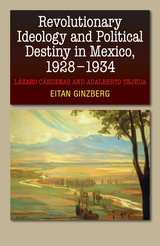 Revolutionary Ideology & Political Destiny in Mexico, 1928-1934: Lazaro Cardenas and Adalberto Tejeda
Eitan Ginzberg
Sussex Academic Press, 2022 Lazaro Cardenas and Adalberto Tejeda, veterans of the Revolution and prominent governors of Michoacan and Veracruz from 1928 to 1932, strived to make Mexico a modern and just state on the basis of the revolutionary Constitution. Three key obstacles confronted them: the conservative approach of the political Center; the political weakness of their own power base; and the great opposing power of the farmers and their supporting elements, especially the Church and the army. This book discusses the different avenues to reform these leaders took and their short- and long-term implications. Cardenas sought to strengthen his position through the ruling party (PNR), while reinforcing local agrarian forces and opening channels of direct empathetic communication with the Church and the army. Tejeda attempted to strengthen his position in the federative arena, bypassing the political Center via the National Peasant League (LNC - Liga Nacional Campesina), whose establishment he was deeply involved in, making a sweeping radical reform while attacking uncompromisingly all the traditional elements of Veracruzan society. Both political projects had unprecedented success but totally different implications. The Cardenista power base led its author to the next Presidency, during which he implemented a remarkable agrarian project. Tejeda's power base, however, led to the utter annihilation of his political power structure and many of his agrarian achievements, as well as to his failure in the struggle for presidency. From that point of view, only a heavy bureaucratic, centre-based reform initiative could succeed, while a local, radical, adventurous transformation was doomed to failure. The fate of the two governors corresponded to the fate of national revolutionary reformism and thus to the destiny of Mexico.
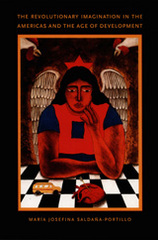 The Revolutionary Imagination in the Americas and the Age of Development
María Josefina Saldaña-Portillo
Duke University Press, 2003 In The Revolutionary Imagination in the Americas and the Age of Development, María Josefina Saldaña-Portillo boldly argues that crucial twentieth-century revolutionary challenges to colonialism and capitalism in the Americas have failed to resist—and in fact have been constitutively related to—the very developmentalist narratives that have justified and naturalized postwar capitalism. Saldaña-Portillo brings the critique of development discourse to bear on such exemplars of revolutionary and resistant political thought and practice as Ernesto “Che” Guevara, Malcolm X, the Sandinista government of Nicaragua, and the Guatemalan guerrilla resistance. She suggests that for each of these, developmentalist constructions frame the struggle as a heroic movement from unconsciousness to consciousness, from a childlike backwardness toward a disciplined and self-aware maturity. Reading governmental reports, memos, and policies, Saldaña-Portillo traces the arc of development narratives from its beginnings in the 1944 Bretton Woods conference through its apex during Robert S. McNamara's reign at the World Bank (1968–1981). She compares these narratives with models of subjectivity and agency embedded in the autobiographical texts of three revolutionary icons of the 1960s and 1970s—those of Che Guevara, Guatemalan insurgent Mario Payeras, and Malcolm X—and the agricultural policy of the Sandinista National Liberation Front (FSLN). Saldaña-Portillo highlights a shared paradigm of a masculinist transformation of the individual requiring the "transcendence" of ethnic particularity for the good of the nation. While she argues that this model of progress often alienated the very communities targeted by the revolutionaries, she shows how contemporary insurgents such as Rigoberta Menchú, the Zapatista movement, and queer Aztlán have taken up the radicalism of their predecessors to retheorize revolutionary subjectivity for the twenty-first century.
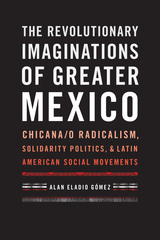 The Revolutionary Imaginations of Greater Mexico: Chicana/o Radicalism, Solidarity Politics, and Latin American Social Movements
By Alan Eladio Gómez
University of Texas Press, 2016 Bringing to life the stories of political teatristas, feminists, gunrunners, labor organizers, poets, journalists, ex-prisoners, and other revolutionaries, The Revolutionary Imaginations of Greater Mexico examines the inspiration Chicanas/os found in social movements in Mexico and Latin America from 1971 to 1979. Drawing on fifteen years of interviews and archival research, including examinations of declassified government documents from Mexico, this study uncovers encounters between activists and artists across borders while sharing a socialist-oriented, anticapitalist vision. In discussions ranging from the Nuevo Teatro Popular movement across Latin America to the Revolutionary Proletariat Party of America in Mexico and the Peronista Youth organizers in Argentina, Alan Eladio Gómez brings to light the transnational nature of leftist organizing by people of Mexican descent in the United States, tracing an array of festivals, assemblies, labor strikes, clandestine organizations, and public protests linked to an international movement of solidarity against imperialism. Taking its title from the “greater Mexico” designation used by Américo Paredes to describe the present and historical movement of Mexicans, Mexican Americans, and Chicanas/os back and forth across the US-Mexico border, this book analyzes the radical creativity and global justice that animated “Greater Mexico” leftists during a pivotal decade. While not all the participants were of one mind politically or personally, they nonetheless shared an international solidarity that was enacted in local arenas, giving voice to a political and cultural imaginary that circulated throughout a broad geographic terrain while forging multifaceted identities. The epilogue considers the politics of going beyond solidarity.
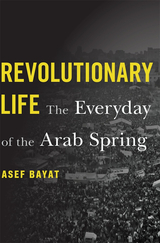 Revolutionary Life: The Everyday of the Arab Spring
Asef Bayat
Harvard University Press, 2021 From a leading scholar of the Middle East and North Africa comes a new way of thinking about the Arab Spring and the meaning of revolution.
From the standpoint of revolutionary politics, the Arab Spring can seem like a wasted effort. In Tunisia, where the wave of protest began, as well as in Egypt and the Gulf, regime change never fully took hold. Yet if the Arab Spring failed to disrupt the structures of governments, the movement was transformative in farms, families, and factories, souks and schools.
Seamlessly blending field research, on-the-ground interviews, and social theory, Asef Bayat shows how the practice of everyday life in Egypt and Tunisia was fundamentally altered by revolutionary activity. Women, young adults, the very poor, and members of the underground queer community can credit the Arab Spring with steps toward equality and freedom. There is also potential for further progress, as women’s rights in particular now occupy a firm place in public discourse, preventing retrenchment and ensuring that marginalized voices remain louder than in prerevolutionary days. In addition, the Arab Spring empowered workers: in Egypt alone, more than 700,000 farmers unionized during the years of protest. Labor activism brought about material improvements for a wide range of ordinary people and fostered new cultural and political norms that the forces of reaction cannot simply wish away.
In Bayat’s telling, the Arab Spring emerges as a paradigmatic case of “refolution”—revolution that engenders reform rather than radical change. Both a detailed study and a moving appeal, Revolutionary Life identifies the social gains that were won through resistance.
 Revolutionary Lives: Anna Strunsky and William English Walling
James Boylan
University of Massachusetts Press When they fell in love amid the tumult of the 1905 Russian revolution, they believed they were destiny's match: William English Walling, a wealthy American journalist-activist from the Midwest, an Anna Strunsky, an aspiring novelist from San Francisco. Vowing to dedicate themselves to socialist ideals, they soon became celebrities who moved in an elite circle of writers, journalist, and reformers. ultimately, both their marriage and their political commitment faltered, but not before they had participated in some of the most urgent social causes of their day. Drawing on archival sources and family materials, James Boylan creates engaging portraits of two striking figures. He reveals the details of Strunsky's intense involvement with Jack London and their troubled literary collaboration. He describes the creation of Walling's "revolutionary news bureau" in Russia under scrutiny of the czarist police, and Strunsky's harrowing journey to report on a pogrom. He also recounts the couple's dash to cover a race riot in Illinois, Walling's pivotal role in creating the NAACP and the disastrous schism between Strunsky's pacifism and Walling's bellicosity during World War I. Boylan enriches our understanding of the intellectual and cultural background of prewar socialism by skillfully tracing the interplay between private and public lives. At the same time, he illuminates the struggle of those who were born Victorians to adjust to the changing public arena of the modern world.
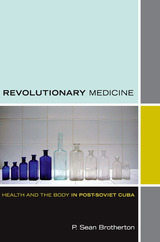 Revolutionary Medicine: Health and the Body in Post-Soviet Cuba
P. Sean Brotherton
Duke University Press, 2012 Revolutionary Medicine is a richly textured examination of the ways that Cuba's public health care system has changed during the past two decades and of the meaning of those changes for ordinary Cubans. Until the Soviet bloc collapsed in 1989, socialist Cuba encouraged citizens to view access to health care as a human right and the state's responsibility to provide it as a moral imperative. Since the loss of Soviet subsidies and the tightening of the U.S. economic embargo, Cuba's government has found it hard to provide the high-quality universal medical care that was so central to the revolutionary socialist project. In Revolutionary Medicine, P. Sean Brotherton deftly integrates theory and history with ethnographic research in Havana, including interviews with family physicians, public health officials, research scientists, and citizens seeking medical care. He describes how the deterioration of health and social welfare programs has led Cubans to seek health care through informal arrangements, as well as state-sponsored programs. Their creative, resourceful pursuit of health and well-being provides insight into how they navigate, adapt to, and pragmatically cope with the rapid social, economic, and political changes in post-Soviet Cuba.
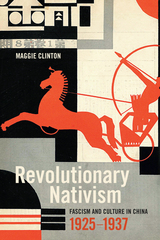 Revolutionary Nativism: Fascism and Culture in China, 1925-1937
Maggie Clinton
Duke University Press, 2017 In Revolutionary Nativism Maggie Clinton traces the history and cultural politics of fascist organizations that operated under the umbrella of the Chinese Nationalist Party (GMD) during the 1920s and 1930s. Clinton argues that fascism was not imported to China from Europe or Japan; rather it emerged from the charged social conditions that prevailed in the country's southern and coastal regions during the interwar period. These fascist groups were led by young militants who believed that reviving China's Confucian "national spirit" could foster the discipline and social cohesion necessary to defend China against imperialism and Communism and to develop formidable industrial and military capacities, thereby securing national strength in a competitive international arena. Fascists within the GMD deployed modernist aesthetics in their literature and art while justifying their anti-Communist violence with nativist discourse. Showing how the GMD's fascist factions popularized a virulently nationalist rhetoric that linked Confucianism with a specific path of industrial development, Clinton sheds new light on the complex dynamics of Chinese nationalism and modernity.
Revolutionary News: The Press in France, 1789–1799
Jeremy D. Popkin
Duke University Press, 1990 The newspaper press was an essential aspect of the political culture of the French Revolution. Revolutionary News highlights the most significant features of this press in clear and vivid language. It breaks new ground in examining not only the famous journalists but the obscure publishers and the anonymous readers of the Revolutionary newspapers. Popkin examines the way press reporting affected Revolutionary crises and the way in which radical journalists like Marat and the Pere Duchene used their papers to promote democracy.
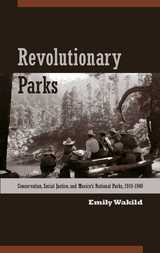 Revolutionary Parks: Conservation, Social Justice, and Mexico’s National Parks, 1910–1940
Emily Wakild
University of Arizona Press, 2011 Winner of the Alfred B. Thomas Award (Southeastern Council of Latin American Studies)
Revolutionary Parks tells the surprising story of how forty national parks were created in Mexico during the latter stages of the first social revolution of the twentieth century. By 1940 Mexico had more national parks than any other country. Together they protected more than two million acres of land in fourteen states. Even more remarkable, Lázaro Cárdenas, president of Mexico in the 1930s, began to promote concepts akin to sustainable development and ecotourism.
Conventional wisdom indicates that tropical and post-colonial countries, especially in the early twentieth century, have seldom had the ability or the ambition to protect nature on a national scale. It is also unusual for any country to make conservation a political priority in the middle of major reforms after a revolution. What emerges in Emily Wakild’s deft inquiry is the story of a nature protection program that takes into account the history, society, and culture of the times. Wakild employs case studies of four parks to show how the revolutionary momentum coalesced to create early environmentalism in Mexico.
According to Wakild, Mexico’s national parks were the outgrowth of revolutionary affinities for both rational science and social justice. Yet, rather than reserves set aside solely for ecology or politics, rural people continued to inhabit these landscapes and use them for a range of activities, from growing crops to producing charcoal. Sympathy for rural people tempered the radicalism of scientific conservationists. This fine balance between recognizing the morally valuable, if not always economically profitable, work of rural people and designing a revolutionary state that respected ecological limits proved to be a radical episode of government foresight.
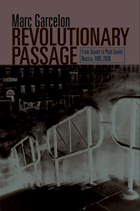 Revolutionary Passage: From Soviet To Post-Soviet Russia
Marc Garcelon
Temple University Press, 2005 Revolutionary Passage is a cultural, social, and political history of Russia during its critical period of transformation at the end of the twentieth century. Marc Garcelon traces the history of perestroika and the rise of Vladimir Putin, arguing that the pressure Mikhail Gorbachev's reforms put on the Soviet system gave birth to movements for democratic change. He also shows that the very political arrangements that prompted the fall of Communism also killed hopes for subsequent reform. At the turning point of this political revolution stood Democratic Russia, or DemRossiia, the principal organization of the Russian democratic movement that helped to dismantle the Soviet system and force the Soviet leadership to change course. However, as post-Soviet Russia committed itself to globalization and U.S.-style economic reforms, the country directed itself away from the Democratic reforms called for by organizations like DemRossiia, and such groups collapsed. Revolutionary Passage provides a close examination of the DemRossiia. Garcelon deftly illuminates the rise and decline of this organization, and how the processes of revolutionary change impacted both Russia and the world.
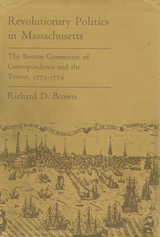 Revolutionary Politics in Massachusetts: The Boston Committee of Correspondence and the Towns, 1772-1774
Richard D. Brown
Harvard University Press, 1970 More than a century and a half ago, John Adams urged scholars investigate the communications of the Boston Committee of Correspondence, the most radical and important of the revolutionary committees of correspondence. Such a study, Adams suggested, would reveal the underlying impetus of the revolutionary movement. Now, for the first time, Richard D. Brown has made an exhaustive and systematic analysis of the committee that set a pattern for America and for the world by keeping alive the revolutionary spirit at a time when the issues were cloudy and public interest was dormant.
The Boston committee, organized to arouse the people of Massachusetts and to inform them of their rights, initiated the use of local committees of correspondence and went on to become a major revolutionary institution which helped bring about fundamental changes in Massachusetts politics. Mr. Brown's book focuses on the years 1772 to 1774, when the inhabitants of Massachusetts moved from quiet accommodation with the British imperial system to massive rebellion against it. His investigations of the records of the Boston committee and of voluminous town records never before studied have resulted in a revision of previous interpretations regarding the interaction between leaders in Boston and the people in the towns.
The author's findings indicate that the Boston committee did not control Massachusetts political action, manipulating the political behavior of the towns, as earlier theorists have suggested. Though Boston was a leader, the towns generally acted independently, and government by consent developed effectively on the local level. The letters which passed between the capital and the countryside reveal an expanding political consciousness and an ever-increasing political sophistication at the grass-roots level. They articulate an essentially radical view of politics based on popular sovereignty.
As an account of the process of political integration among a colonial people engaged in an independence movement, this book will appeal not only to historians but also to political scientists concerned with the emerging nations of the twentieth century.
 Revolutionary Politics in the Long Parliament
John R. MacCormack
Harvard University Press, 1973 This volume is a systematic study of the politics of five crucial years of the Puritan Revolution, the period between John Pym's death in December 1643 and the execution of Charles I in January 1649. MacCormack provides a fresh and coherent interpretation of the events chronicled in the first volume of S. R. Gardiner's monumental History of the Great Civil War, a work long known to be inadequate.
Through an exhaustive compilation of the activities of individual members, MacCormack examines the Long Parliament and the structures of its parties. He investigates the degree to which the division between parties was religious or political, the character of the leadership of the two major groups (moderates and radicals), and the transformation of the parties during the five-year period.
The author focuses on the way in which the Parliamentary radical group led by Oliver St. John, Sir Henry Vane, Jr., and Oliver Cromwell gradually retreated from their revolutionary stance of 1644 in the face of the genuine populism of the Levellers. He contends that their failure to retain the moral leadership of the revolution led to the fragmentation of parties in 1648 and to the eventual dictatorship of Oliver Cromwell.
The book includes fresh interpretations of the role of Oliver Cromwell, especially in 1647 and 1648 when he emerged as the central figure. Significant material is also presented on John Lilburne. In analyzing the transformations of the radical party, the author places Lilburne's party, the Levellers, in the political context of the Revolution.
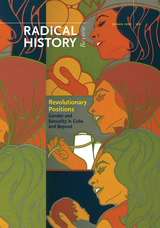 Revolutionary Positions: Sexuality and Gender in Cuba and Beyond
Michelle Chase, Isabella Close, Melina Pappademos, and Heidi Tinsman, special issue editors
Duke University Press As the Cuban Revolution reaches its sixtieth anniversary, contributors to this special issue explore the impact of the revolution through the lens of sexuality and gender, providing a social and cultural history that illuminates the Cuban-influenced global New Left. Moving beyond assumptions about the revolutionary left's hypermasculinity and homophobia, the issue takes a nuanced approach to the Cuban Revolution's impact on gender and sexuality. Contributors study Cuban internationalist campaigns, the relationship between cultural diplomacy and mass media, and visual images of revolution and solidarity. They follow the emergence and negotiation of new gender ideals through the transgendering of Che's “New Man,” the Cuban travels of Angela Davis, calls for sexual revolution in the Dutch Atlantic, and gender representations during the 1964 “Campaign of Terror” in Chile. In doing so, the authors provide fresh insight into Cuba’s transnational legacy on politics and culture during the Cold War and beyond.
Contributors. Lorraine Bayard de Volo, Marcelo Casals, Michelle Chase, Aviva Chomsky, Isabella Cosse, Ximena Espeche, Robert Franco, Paula Halperin, Lani Hanna, Elizabeth Quay Hutchison, Melina Pappademos, Jennifer L. Lambe, Diosnara Ortega González, Gregory Randall, Margaret Randall, Chelsea Schields, Sarah Seidman, Emily Snyder, Heidi Tinsman, Ailynn Torres Santana
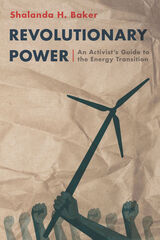 Revolutionary Power: An Activist's Guide to the Energy Transition
Shalanda H. Baker
Island Press, 2020 In September 2017, Hurricane Maria hit Puerto Rico, completely upending the energy grid of the small island. The nearly year-long power outage that followed vividly shows how the new climate reality intersects with race and access to energy. The island is home to brown and black US citizens who lack the political power of those living in the continental US. As the world continues to warm and storms like Maria become more commonplace, it is critical that we rethink our current energy system to enable reliable, locally produced, and locally controlled energy without replicating the current structures of power and control.
In Revolutionary Power, Shalanda Baker arms those made most vulnerable by our current energy system with the tools they need to remake the system in the service of their humanity. She argues that people of color, poor people, and indigenous people must engage in the creation of the new energy system in order to upend the unequal power dynamics of the current system.
Revolutionary Power is a playbook for the energy transformation complete with a step-by-step analysis of the key energy policy areas that are ripe for intervention. Baker tells the stories of those who have been left behind in our current system and those who are working to be architects of a more just system. She draws from her experience as an energy-justice advocate, a lawyer, and a queer woman of color to inspire activists working to build our new energy system.
Climate change will force us to rethink the way we generate and distribute energy and regulate the system. But how much are we willing to change the system? This unique moment in history provides an unprecedented opening for a deeper transformation of the energy system, and thus, an opportunity to transform society. Revolutionary Power shows us how.
 Revolutionary Social Change in Colombia: The Origin and Direction of the FARC-EP
James J. Brittain
Pluto Press, 2010 This book presents an insider's account of Columbia's internal conflict. At the forefront are the Revolutionary Armed Forces of Colombia-People's Army (FARC-EP).
Although they are one of the most powerful military forces in Latin American history, little is known about the FARC-EP. James J. Brittain explains where and why this political military movement came into existence and assesses whether the methods employed by the insurgency have the potential to free those marginalised in Colombia.
As democratic socialism develops in Venezuela and Bolivia, Brittain's fascinating study assesses the relevance of armed struggle to 21st century Latin American politics. This is an essential title for those wishing to develop a full understanding of the continent.
By evaluating the FARC-EP's actions, ideological construction, and their theoretical placement, the book gauges how this guerrilla movement relates to revolutionary theory and practice and through what tangible mechanisms, if any, they are creating a new Colombia.
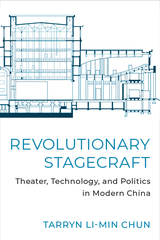 Revolutionary Stagecraft: Theater, Technology, and Politics in Modern China
Tarryn Li-Min Chun
University of Michigan Press, 2024 Revolutionary Stagecraft draws on a rich corpus of literary, historical, and technical materials to reveal a deep entanglement among technological modernization, political agendas, and the performing arts in modern China. This unique approach to Chinese theater history combines a close look at plays themselves, performance practices, technical theater details, and behind-the-scenes debates over “how to” make theater amid the political upheavals of China’s 20th century. The book begins at a pivotal moment in the 1920s—when Chinese theater artists began to import, use, and write about modern stage equipment—and ends in the 1980s when China's scientific and technological boom began. By examining iconic plays and performances from the perspective of the stage technologies involved, Tarryn Li-Min Chun provides a fresh perspective on their composition and staging. The chapters include stories on the challenges of creating imitation neon, rigging up a makeshift revolving stage, and representing a nuclear bomb detonating onstage.
In thinking about theater through technicity, the author mines well-studied materials such as dramatic texts and performance reviews for hidden technical details and brings to light a number of previously untapped sources such as technical journals and manuals; set design renderings, lighting plots, and prop schematics; and stage technology how-to guides for amateur thespians. This approach focuses on material stage technologies, situating these objects equally in relation to their technical potential, their human use, and the social, political, economic, and cultural forces that influence them. In each of its case studies, Revolutionary Stagecraft reveals the complex and at times surprising ways in which Chinese theater artists and technicians of the 20th century envisioned and enacted their own revolutions through the materiality of the theater apparatus.
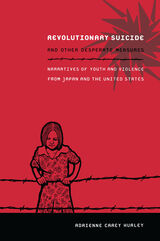 Revolutionary Suicide and Other Desperate Measures: Narratives of Youth and Violence from Japan and the United States
Adrienne Carey Hurley
Duke University Press, 2011 In Revolutionary Suicide and Other Desperate Measures, Adrienne Carey Hurley examines how child abuse and youth violence are understood, manufactured, and represented, but still disavowed, in Japan and the United States. Through analysis of autobiographical fiction, journalism, film, and clinical case studies, she charts a “culture of child abuse” extending from the home to the classroom, the marketplace, and the streets in both countries. Hurley served as a court-appointed special advocate for abused children, and she brings that perspective to bear as she interprets texts. Undertaking close reading as a form of advocacy, she exposes how late-capitalist societies abuse and exploit youth, while at the same time blaming them for their own vulnerability and violence. She objects to rote designations of youth violence as “inexplicable,” arguing that such formulaic responses forestall understanding and intervention. Hurley foregrounds theories of youth violence that locate its origins in childhood trauma, considers what happens when young people are denied opportunities to develop a political analysis to explain their rage, and explores how the chance to engage in such an analysis affects the occurrence and meaning of youth violence.
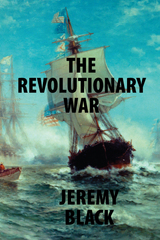 The Revolutionary War
Jeremy Black
St. Augustine's Press, 2025 Military historian Jeremy Black follows his engagement with the American Civil War (St. Augustine's Press, 2025) with a review of the Revolutionary War in North America and the strategic asymmetry it presents. This was a key episode for global affairs and formative for the United States, but also fascinating for military history as a whole. Black's earlier treatment of this war (1991) remains operational, but he thought it "necessary to revisit the subject and reconsider not only the specifics of assessment, but also the more general ways of analyzing and presenting the struggle." Black's rendering of the war is accurate, well researched, and successfully hits his target without undue speculation. Identifying all the factors at play is one of Black's strengths, as is his sober restraint in applying hindsight while evaluating leadership and campaigns throughout. His field of vision is expansive and refers to the global theatre when offering any kind of final statements––for example, in his claim that the Revolution was largely lost long after the conclusion of battles, and that Canada in British hands underlined the failure of revolutionary efforts and the embodiment of continued threats. The Revolutionary War is a masterful treatment of an historical event and also the very nature of revolutionary warfare. Black is a fair-handed assessor of 'American' interests and strategic politics, and likewise observant in explaining that Britain was not entirely bested by the revolution even in losing the war. His discussion of the aftermath is as critical as his illustration of the beginning of hostilities, as in his chapter dedicated to "heritages, lessons, and retrospectives." Black is one of the most important and prolific historians of his generation, a writer whose concise and thorough manner renders readers in the United States a refreshing service of understanding their history more deeply.
The Revolutionary War in the Hackensack Valley: The Jersey Dutch and the Neutral Ground, 1775-1783
Leiby, Adrian C.
Rutgers University Press, 1980 After November 1776, the Hackensack Valley--located in northeastern New Jersey and Rockland County, New York--lay between the invading British army in New York City and the main Continental defense forces in the Hudson Highlands. Jersey Dutch patriot and Tory troops carried on a five-year war of neighbors between the lines, while the grand armies of Britain and America maneuvered on either side of them for a chance to strike a blow at the other.
Adrian Leiby offers an exciting narrative of the people of Dutch New Jersey and New York during this conflict. Historians will find colorful details about the Revolutionary War, and genealogists will find much previously unpublished material on hundreds of men and women of Dutch New Jersey and New York in the 1700s.
 Revolutionary Waves: The Crowd in Modern China
Tie Xiao
Harvard University Press, 2017 During China’s transition from dynastic empire to nation-state, the crowd emerged as a salient trope. Intellectuals across the ideological spectrum have used the crowd trope to ruminate on questions of selfhood and nationhood, and to advance competing models of enlightenment and revolution.
Revolutionary Waves analyzes the centrality of the crowd in the Chinese cultural and political imagination and its global resonances by delving into a wide range of fiction, philosophy, poetry, and psychological studies. Bringing together literary studies, intellectual history, critical theory, and the history of human sciences, this interdisciplinary work highlights unexplored interactions among emerging social-scientific forms of knowledge, new aesthetic modes of representation, and changing political imperatives. The work brings into relief the complexities of the modern Chinese crowd discourse, which generated subjectivities and oriented actions, enabled as well as constrained the expression of togetherness, and thus both expanded and limited the horizon of political possibilities in the emerging age of mass politics.
The first in-depth examination of the aesthetics and politics of the crowd in modern Chinese literature and thought, Revolutionary Waves raises questions about the promise and peril of community as communion and reimagines collective life in China’s post-socialist present.
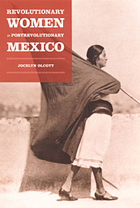 Revolutionary Women in Postrevolutionary Mexico
Jocelyn Olcott
Duke University Press, 2005 Revolutionary Women in Postrevolutionary Mexico is an empirically rich history of women’s political organizing during a critical stage of regime consolidation. Rebutting the image of Mexican women as conservative and antirevolutionary, Jocelyn Olcott shows women activists challenging prevailing beliefs about the masculine foundations of citizenship. Piecing together material from national and regional archives, popular journalism, and oral histories, Olcott examines how women inhabited the conventionally manly role of citizen by weaving together its quotidian and formal traditions, drawing strategies from local political struggles and competing gender ideologies. Olcott demonstrates an extraordinary grasp of the complexity of postrevolutionary Mexican politics, exploring the goals and outcomes of women’s organizing in Mexico City and the port city of Acapulco as well as in three rural locations: the southeastern state of Yucatán, the central state of Michoacán, and the northern region of the Comarca Lagunera. Combining the strengths of national and regional approaches, this comparative perspective sets in relief the specificities of citizenship as a lived experience.
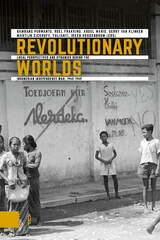 Revolutionary Worlds: Local Perspectives and Dynamics during the Indonesian Independence War, 1945-1949
Bambang Purwanto
Amsterdam University Press, 2023 Revolutionary Worlds looks at the Indonesian revolution (1945-1949) from a local and regional perspective. With seventeen contributions, Indonesian and Dutch researchers bring to life the revolutionary world from widely differing perspectives. The authors explain how Indonesian, Chinese, Indian and Eurasian civilians, fighters, farmers and officials experienced and shaped the often volatile period between 1945 and 1950. The book focuses on different ideas of independence, survival strategies, mobilization, minorities, contestation of authority and the use of force against the backdrop of Indonesian and Dutch authorities’ efforts to gain or maintain control.
Bringing together two national historiographical traditions which have long remained largely separate, Revolutionary Worlds is the result of a collaboration between the Indonesian research project Proklamasi Kemerdekaan, Revolusi dan Perang di Indonesia ('Proclamation of Independence, Revolution and War in Indonesia', Universitas Gadjah Mada, Yogyakarta) and the Dutch research group of the Regional Studies project, under the umbrella of the research programme Independence, Decolonization, Violence and War in Indonesia, 1945-1950.
The authors of this book – Taufik Ahmad, Galuh Ambar Sasi, Maarten van der Bent, Martijn Eickhoff, Farabi Fakih, Roel Frakking, Apriani Harahap, Anne-Lot Hoek, Sarkawi B. Husain, Julianto Ibrahim, Gerry van Klinken, Erniwati, Mawardi Umar, Anne van der Veer, Abdul Wahid, Tri Wahyuning M. Irsyam, and Muhammad Yuanda Zara – work with various universities and research institutes in Indonesia and the Netherlands.
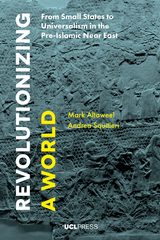 Revolutionizing a World: From Small States to Universalism in the Pre-Islamic Near East
Mark Altaweel and Andrea Squitieri
University College London, 2018 This book investigates the long-term continuity of large-scale states and empires, and its effect on the Near East’s social fabric, including the fundamental changes that occurred to major social institutions. Its geographical coverage spans, from east to west, modern-day Libya and Egypt to Central Asia, and from north to south, Anatolia to southern Arabia, incorporating modern-day Oman and Yemen. Its temporal coverage spans from the late eighth century BCE to the seventh century CE during the rise of Islam and collapse of the Sasanian Empire.
The authors argue that the persistence of large states and empires starting in the eighth/seventh centuries BCE, which continued for many centuries, led to new sociopolitical structures and institutions emerging in the Near East. The primary processes that enabled this emergence were large-scale and long-distance movements, or population migrations. These patterns of social developments are analyzed under different aspects: settlement patterns, urban structure, material culture, trade, governance, language spread, and religion, all pointing at movement as the main catalyst for social change. This book’s argument is framed within a larger theoretical framework termed as "universalism," a theory that explains many of the social transformations that happened to societies in the Near East, starting from the Neo-Assyrian period and continuing for centuries. Among other influences, the effects of these transformations are today manifested in modern languages, concepts of government, universal religions and monetized and globalized economies.
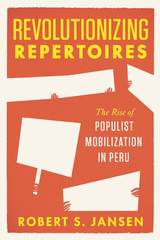 Revolutionizing Repertoires: The Rise of Populist Mobilization in Peru
Robert S. Jansen
University of Chicago Press, 2017 Politicians and political parties are for the most part limited by habit—they recycle tried-and-true strategies, draw on models from the past, and mimic others in the present. But in rare moments politicians break with routine and try something new.
Drawing on pragmatist theories of social action, Revolutionizing Repertoires sets out to examine what happens when the repertoire of practices available to political actors is dramatically reconfigured. Taking as his case study the development of a distinctively Latin American style of populist mobilization, Robert S. Jansen analyzes the Peruvian presidential election of 1931. He finds that, ultimately, populist mobilization emerged in the country at this time because newly empowered outsiders recognized the limitations of routine political practice and understood how to modify, transpose, invent, and recombine practices in a whole new way. Suggesting striking parallels to the recent populist turn in global politics, Revolutionizing Repertoires offers new insights not only to historians of Peru but also to scholars of historical sociology and comparative politics, and to anyone interested in the social and political origins of populism.
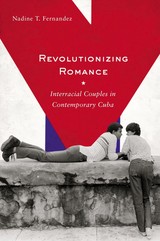 Revolutionizing Romance: Interracial Couples in Contemporary Cuba
Fernandez, Nadine T
Rutgers University Press, 2010 Scholars have long heralded mestizaje, or race mixing, as the essence of the Cuban nation. Revolutionizing Romance is an account of the continuing significance of race in Cuba as it is experienced in interracial relationships. This ethnography tracks young couples as they move in a world fraught with shifting connections of class, race, and culture that are reflected in space, racialized language, and media representations of blackness, whiteness, and mixedness. As one of the few scholars to conduct long-term anthropological fieldwork in the island nation, Nadine T. Fernandez offers a rare insider's view of the country's transformations during the post-Soviet era. Following a comprehensive history of racial formations up through Castro's rule, the book then delves into more intimate and contemporary spaces. Language, space and place, foreign tourism, and the realm of the family each reveal, through the author's deft analysis, the paradox of living a racialized life in a nation that celebrates a policy of colorblind equality.
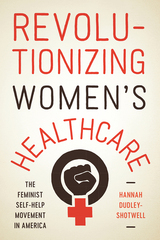 Revolutionizing Women's Healthcare: The Feminist Self-Help Movement in America
Hannah Dudley-Shotwell
Rutgers University Press, 2020 Winner of the 2021 Frances Richardson Keller-Sierra Prize from the Western Association of Women Historians (WAWH)
Revolutionizing Women’s Healthcare is the story of a feminist experiment: the self-help movement. This movement arose out of women’s frustration, anger, and fear for their health. Tired of visiting doctors who saw them as silly little girls, suffering shame when they asked for birth control, seeking abortions in back alleys, and holding little control over their own reproductive lives, women took action. Feminists created “self-help groups” where they examined each other’s bodies and read medical literature. They founded and ran clinics, wrote books, made movies, undertook nationwide tours, and raided and picketed offending medical institutions. Some performed their own abortions. Others swore off pharmaceuticals during menopause. Lesbian women found “at home” ways to get pregnant. Black women used self-help to talk about how systemic racism affected their health. Hannah Dudley-Shotwell engagingly chronicles these stories and more to showcase the creative ways women came together to do for themselves what the mainstream healthcare system refused to do.
Revolutions and Counter-Revolutions: 1917 and Its Aftermath from a Global Perspective
Edited by Stefan Rinke and Michael Wildt
Campus Verlag, 2017 Unquestionably a watershed year in world history, 1917 not only saw the Russian Revolution and the US entry into World War I, it also marked a foundational moment in determining global political structures for the remaining twentieth century. Yet while contemporaries were cognizant of these global connections, historiography has been largely limited to analysis of the nation-state. A century later, this book discusses the transnational dimension of the numerous upheavals, rebellions, and violent reactions on a global level that began with 1917. Experts from different continents contribute findings that go beyond the well-known European and transatlantic narratives, making for a uniquely global study of this crucial period in history.
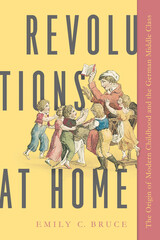 Revolutions at Home: The Origin of Modern Childhood and the German Middle Class
Emily C. Bruce
University of Massachusetts Press, 2021 How did we come to imagine what "ideal childhood" requires? Beginning in the late eighteenth century, German child-rearing radically transformed, and as these innovations in ideology and educational practice spread from middle-class families across European society, childhood came to be seen as a life stage critical to self-formation. This new approach was in part a process that adults imposed on youth, one that hinged on motivating children's behavior through affection and cultivating internal discipline. But this is not just a story about parents' and pedagogues' efforts to shape childhood. Offering rare glimpses of young students' diaries, letters, and marginalia, Emily C. Bruce reveals how children themselves negotiated these changes.
Revolutions at Home analyzes a rich set of documents created for and by young Germans to show that children were central to reinventing their own education between 1770 and 1850. Through their reading and writing, they helped construct the modern child subject. The active child who emerged at this time was not simply a consequence of expanding literacy but, in fact, a key participant in defining modern life.
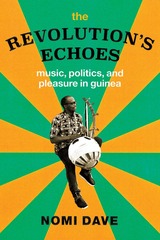 The Revolution’s Echoes: Music, Politics, and Pleasure in Guinea
Nomi Dave
University of Chicago Press, 2019 Music has long been an avenue for protest, seen as a way to promote freedom and equality, instill hope, and fight for change. Popular music, in particular, is considered to be an effective form of subversion and resistance under oppressive circumstances. But, as Nomi Dave shows us in The Revolution’s Echoes, the opposite is also true: music can often support, rather than challenge, the powers that be.
Dave introduces readers to the music supporting the authoritarian regime of former Guinean president Sékou Touré, and the musicians who, even long after his death, have continued to praise dictators and avoid dissent. Dave shows that this isn’t just the result of state manipulation; even in the absence of coercion, musicians and their audiences take real pleasure in musical praise of leaders. Time and again, whether in traditional music or in newer genres such as rap, Guinean musicians have celebrated state power and authority. With The Revolution’s Echoes, Dave insists that we must grapple with the uncomfortable truth that some forms of music choose to support authoritarianism, generating new pleasures and new politics in the process.
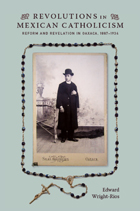 Revolutions in Mexican Catholicism: Reform and Revelation in Oaxaca, 1887–1934
Edward Wright-Rios
Duke University Press, 2009 In Revolutions in Mexican Catholicism, Edward Wright-Rios investigates how Catholicism was lived and experienced in the Archdiocese of Oaxaca, a region known for its distinct indigenous cultures and vibrant religious life, during the turbulent period of modernization in Mexico that extended from the late nineteenth century through the early twentieth. Wright-Rios centers his analysis on three “visions” of Catholicism: an enterprising archbishop’s ambitious religious reform project, an elderly indigenous woman’s remarkable career as a seer and faith healer, and an apparition movement that coalesced around a visionary Indian girl. Deftly integrating documentary evidence with oral histories, Wright-Rios provides a rich, textured portrait of Catholicism during the decades leading up to the Mexican Revolution of 1910 and throughout the tempestuous 1920s. Wright-Rios demonstrates that pastors, peasants, and laywomen sought to enliven and shape popular religion in Oaxaca. The clergy tried to adapt the Vatican’s blueprint for Catholic revival to Oaxaca through institutional reforms and attempts to alter the nature and feel of lay religious practice in what amounted to a religious modernization program. Yet some devout women had their own plans. They proclaimed their personal experiences of miraculous revelation, pressured priests to recognize those experiences, marshaled their supporters, and even created new local institutions to advance their causes and sustain the new practices they created. By describing female-led visionary movements and the ideas, traditions, and startling innovations that emerged from Oaxaca’s indigenous laity, Wright-Rios adds a rarely documented perspective to Mexican cultural history. He reveals a remarkable dynamic of interaction and negotiation in which priests and parishioners as well as prelates and local seers sometimes clashed and sometimes cooperated but remained engaged with one another in the process of making their faith meaningful in tumultuous times.
 Revolutions in Verse: The Medium of Russian Modernism
Isobel Palmer
Northwestern University Press, 2025 How modernist interartistic experimentation and the proliferation of new media technologies inspired fresh insights into poetry Isobel Palmer spotlights Russian modernist poets’ and formalist theorists’ conscious engagement with formal convention, showing how their efforts were tied up with broader attempts in the early Soviet era to understand and articulate the nature of poetry and its most characteristic devices. Returning to critical debates around poetic encounters with three key aesthetic categories—rhythm, image, and voice—Palmer unpacks the period’s deeper interest in the material bases of poetic speech itself. Through fresh, incisive readings of canonical poets and theorists, from Andrei Bely and Vladimir Mayakovsky to Yury Tynianov and Viktor Shklovsky, Revolutions in Verse: The Medium of Russian Modernism explores the proliferation of interartistic experiments and the emergence of new media technologies that made poetry visible as a medium in its own right.
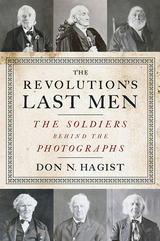 The Revolution's Last Men: The Soldiers Behind the Photographs
Don N. Hagist
Westholme Publishing, 2015 Advisor for Ken Burns The American Revolution on PBS®
The Stories of the Final Six Surviving Soldiers Who Fought in the American Revolution
During the Civil War that threatened to tear the United States apart came the realization that only a handful of veterans of the American Revolution still survived—men who had fought the war that created the nation. Six of these men were photographed and interviewed for a book by Reverend E. B. Hillard that appeared late in 1864. Their images have captivated generations since then; but—through a combination of faded memories and the interviewer’s patriotic agenda—the biographies accompanying these amazing photographs were garbled and distorted, containing information that ranged from inaccurate to implausible. Now for the first time the military careers of these men have been researched in detail using a wide range of primary sources. The result is a new perspective on the actual service of these soldiers, from enlistment to discharge, along with new details of their relatively quiet postwar lives. The Revolution’s Last Men presents the original biographical interviews published in 1864, pension depositions and other first-hand accounts given by each man later in life, and an up-to-date biography examining each soldier’s service and discussing the inaccuracies and uncertainties of the previously published accounts. To complement the photographs taken in 1864, original drawings depict the men as they may have appeared when they were soldiers, using current research on military artifacts and material culture. Also included are additional photographs of some of the men that were not part of the 1864 collection but taken when their status as the last known survivors of the American Revolution made them celebrities. While the photographs of these aged veterans continue to inspire, this book puts their service into perspective and allows these men to be appreciated for who they really were and for their great and unique service to their country.
The Revolutions of Capitalism: The Politics of the Event
Maurizio Lazzarato. Translated by Brian Whitener and Geo Maher.
Duke University Press, 2026 Following in the intellectual tradition of Gilles Deleuze, Felix Guattari, Michel Foucault, Karl Marx, and others, Maurizio Lazzarato’s The Revolutions of Capitalism charts the changing conditions of twenty-first-century neoliberal capitalism and the strategies needed to challenge them. Originally published in French in 2004, this newly translated work attempts to define a radical political, social, and ontological theory around questions of multiplicity, singularity, and the event. Lazzarato argues that capitalism’s increasing focus on the production, capital, and accumulation of immaterial goods and services due to the rise of the internet necessitates new forms of thinking and resistance. To counter this new form of capitalist power, Lazzarato outlines a politics capable of translating new possibilities into actuality.
 Revolutions: Reflections on American Equality and Foreign Liberations
David Brion Davis
Harvard University Press, 1990 The subtle and profound connections between revolutions and the idea of equality are at the heart of this exploration in the history of ideas. Beginning with America’s response to the French Revolution and the wars of liberation in Latin America, David Brion Davis poses the intriguing question of why the United States, born in revolution, has fluctuated between fears of a revolutionary world and a joyous expectation that foreign liberations signal the Americanization of the globe.
Before the Civil War, the question of slavery helped to define the way Americans looked at revolutions in terms of equality, for it was equality, and not liberty, that was the true antithesis of “the peculiar institution.” In the late nineteenth and early twentieth centuries, foreign revolutions were closely tied to messianic aspirations and internal reform. Industrialization, political revolution, and dreams of equality and social justice went hand in hand. Writing in the grand style of Burke, Yale’s distinguished scholar of comparative history forces us to think once more about our revolutionary heritage and its tangled web of liberty, equality, and evil.
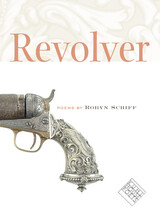 Revolver
Robyn Schiff
University of Iowa Press, 2008 As restless, reckless, and precise as the Colt revolver for which it is named, Robyn Schiff’s Revolver “repeats fire without reloading” as it reckons with the array of foreboding objects displayed at the Great Exhibition of 1851 and the traces of their ghosts one hundred years later.
A dirge on the Singer Sewing Machine, an exuberant and unnerving rumination on multipurpose campaign furniture, and a breathless account of Ralph Lauren’s silver Porsche 550 Spyder are among the collection’s exhilarating corporate histories, urgent fantasias, and agonizing love poems. The long, lavish, and utterly unpredictable sentences that Schiff has assembled contort as much to discover what can’t be contained as what can.
This is a book of extremes relentlessly contemporary in scope. And like the eighty-blade sportsman’s knife also described here, Revolver keeps opening and reopening to the daunting possibilities of transformation—“Splayed it is a bouquet of all the ways a point mutates.”
from “Silverware by J. A. Henckels”
Let me be
as streamlined as my knife when I say this.
As cold as my three-pronged fork that
cools the meat even as it steadies it.
A pettiness in me was honed
in this cutlers’ town, later bombed,
in which Adolf Eichmann, who was born there
alongside my wedding pattern, could hear
the constant sharpening of knives
like some children hear the corn in their hometowns
talking to them through the wind.
The horizon is just the score they breathe through
like a box of chickens
breathing through a slit.
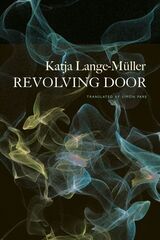 Revolving Door
Katja Lange-Müller
Seagull Books, 2022 The English debut of an idiosyncratic narrative voice.
“What now?” wonders Asta, a nurse who has returned to Germany after a final assignment in Nicaragua. After over twenty years working for international aid organizations, her services are no longer needed. No one is waiting for her. She has nowhere to go. Even the language has lost its familiarity. She stands next to a revolving door at Munich airport, observing the other travelers as she smokes one duty-free cigarette after another. Some of these strangers resemble figures from her past, bringing memories of an adventurous life flooding back. Her catalog of tragicomic attempts at assistance in Germany, Nicaragua, India, Mongolia, and Tunisia raises questions about what it takes to help and whom we are really helping. Katja Lange-Müller’s works have been critically acclaimed for their dark humor and affectionate, nuanced portrayals of characters wrestling with knotty situations and relationships. Revolving Door marks a fitting English debut of this most idiosyncratic of narrative voices.
Rewarding Work: How to Restore Participation and Self-Support to Free Enterprise, With a New Preface
Edmund S. Phelps
Harvard University Press, 1997 Since the 1970s a gulf has opened between the pay of low-paid workers and the pay of the middle class. No longer able to earn a decent wage in respectable work, many have left the labor force, and the job attachment of those remaining has weakened. For Edmund Phelps, this is a failure of political economy whose widespread effects are undermining the free-enterprise system. His solution is a graduated schedule of tax subsidies to enterprises for every low-wage worker they employ. As firms hire more of these workers, the labor market would tighten, driving up their pay levels as well as their employment.
Rewild
Meredith Stricker
Tupelo Press, 2022 Rewild is a collection of documentary lyric poetry that explores places that, having been ravaged by war and environmental plunder, have since been abandoned to regenerate and restore. At this moment where we find ourselves in the Anthropocene, the poems hover between ruin and restoration. They open ways we can ask transformative questions and turn ourselves into these questions that begin to tunnel through difficulty and despair into “another spreadsheet than human … chromosomal and intricate.” To begin to unbuy ourselves, to rewild our communal lives.
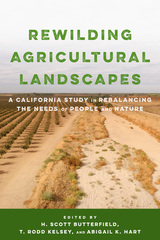 Rewilding Agricultural Landscapes: A California Study in Rebalancing the Needs of People and Nature
Edited by H. Scott Butterfield, T. Rodd Kelsey, and Abigail K. Hart
Island Press, 2021 As the world population grows, so does the demand for food, putting unprecedented pressure on agricultural lands. At the same time, climate change, soil degradation, and water scarcity mean that productivity of many of these lands is deteriorating. In many desert dryland regions, drinking wells are drying up and the land above them is sinking, soil salinity is increasing, and poor air quality is contributing to health problems in farm communities. "Rewilding" the least productive of these cultivated landscapes offers a sensible way to reverse the damage from intensive agriculture. These ecological restoration efforts can recover natural diversity while guaranteeing the long-term sustainability of the remaining farms and the communities they support.
This accessibly written, groundbreaking contributed volume is the first to examine in detail what it would take to retire eligible farmland and restore functioning natural ecosystems. Rewilding Agricultural Landscapes uses the southern Central Valley of California, which is one of the most productive and important agricultural regions in the world, as a case study for returning a balance to agricultural lands and natural ecosystems. This project—one of the largest rewilding studies of its kind in dryland ecosystems—has shown that rewilding can slow desertification and provide ecosystem services, such as recharged aquifers, cleaner air, and stabilized soils, to nearby farms and communities. Chapters examine what scientists have learned about the natural history of this dryland area, how retired farmland can be successfully restored to its natural wild state, and the socioeconomic and political benefits of doing so. The book concludes with a vision of a region restored to ecological balance and equipped for inevitable climate change, allowing nature and people to prosper. The editors position the book as a case study with a programmatic approach and straightforward lessons that can be applied in similar regions around the world.
The lessons in Rewilding Agricultural Landscapes will be useful to conservation leaders, policymakers, groundwater agencies, and water managers looking for inspiration and practical advice solving the complicated issues of agricultural sustainability and water management.
 Rewilding North America: A Vision For Conservation In The 21St Century
Dave Foreman
Island Press, 2004 In Rewilding North America, Dave Foreman takes on arguably the biggest ecological threat of our time: the global extinction crisis. He not only explains the problem in clear and powerful terms, but also offers a bold, hopeful, scientifically credible, and practically achievable solution. Foreman begins by setting out the specific evidence that a mass extinction is happening and analyzes how humans are causing it. Adapting Aldo Leopold's idea of ecological wounds, he details human impacts on species survival in seven categories, including direct killing, habitat loss and fragmentation, exotic species, and climate change. Foreman describes recent discoveries in conservation biology that call for wildlands networks instead of isolated protected areas, and, reviewing the history of protected areas, shows how wildlands networks are a logical next step for the conservation movement. The final section describes specific approaches for designing such networks (based on the work of the Wildlands Project, an organization Foreman helped to found) and offers concrete and workable reforms for establishing them. The author closes with an inspiring and empowering call to action for scientists and activists alike. Rewilding North America offers both a vision and a strategy for reconnecting, restoring, and rewilding the North American continent, and is an essential guidebook for anyone concerned with the future of life on earth.
 Rewired: Protecting Your Brain in the Digital Age
Carl D. Marci, MD
Harvard University Press, 2022 Living in an age of digital distraction has wreaked havoc on our brains—but there’s much we can do to restore our tech–life balance.
We live in a world that is always on, where everyone is always connected. But we feel increasingly disconnected. Why? The answer lies in our brains. Carl D. Marci, MD, a leading expert on social and consumer neuroscience, reviews the mounting evidence that overuse of smart phones and social media is rewiring our brains, resulting in a losing deal: we are neglecting the relationships that sustain us and keep us healthy in favor of weaker and more ephemeral ties.
The ability to connect and form strong social bonds is fundamental to human experience and emerged through unique structures in our brains. But ever-more-powerful technologies and ubiquitous access to media have hijacked our need to connect intimately and emotionally with others. The quick highs of clicking “like” and swiping right overstimulate the same neurological reward centers associated with social relationships. The habits that accompany our digital lifestyles are putting tremendous pressure on critical components of the brain associated with attention, emotion, and memory, changing how we process information and altering how we communicate and relate, even at a physiological level.
As a psychiatrist working at the forefront of research on the impact of digital technology, Marci has seen this transformation up close and developed a range of responses. Rewired provides scientifically supported solutions for everyone who wants to restore their tech–life balance—from parents concerned about their children’s exposure to the internet to stressed workers dealing with the deluge of emails and managing the expectation of 24/7 availability.
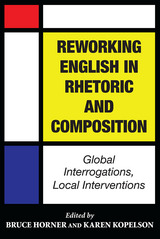 Reworking English in Rhetoric and Composition: Global Interrogations, Local Interventions
Edited by Bruce Horner and Karen Kopelson
Southern Illinois University Press, 2014 In Reworking English in Rhetoric and Composition, editors Bruce Horner and Karen Kopelson gather leading scholars and new voices in the field of rhetoric and composition to offer a dynamic new perspective on English as it is used today. This provocative volume explores the myriad ways in which English is constantly redefined, revised, and redirected through specific, located acts of writing, rhetoric, teaching, and learning. Contributors provide insightful contributions to the study of English from both national and international perspectives, revealing the language as a fluid and constantly changing manner of expression that challenges established notions. In part one, “Reworking Language,” writers call into question the idea of language as a static, stable entity. In part two, “Locations and Migrations: Global/Local Interrogations,” contributors explore the impact of writing and teaching English in both in the United States and abroad, from Arkansas and Oklahoma to China, Jamaica, and Lebanon. Part three, “Pedagogical/Institutional Interventions,” addresses English in institutional settings and the implications for future pedagogical work. Each essay in this revolutionary volume substantiates two key premises for the rethinking of English: first, that languages are susceptible to constant change through the very acts of writing, teaching, and learning, and second, that this reworking occurs as it moves between various temporal and spatial locations. Throughout the volume, the variety and flexibility of English across the globe are both advocated and revealed, rejecting dominant Anglophone perspectives and instead placing language in cross-cultural contexts. Brimming with informative and thought-provoking insights, Reworking English in Rhetoric and Composition breathes new life into the field and provides direction for scholars and teachers looking to the future of English.
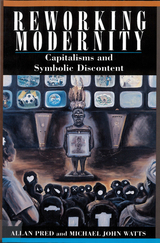 Reworking Modernity: Capitalisms and Symbolic Discontent
Pred, Allan
Rutgers University Press, 1992 Using both grand conceptualizations and grounded case studies, Allan Pred and Michael Watts look at how people cope with and give meaning to capitalism and modernity in different times and places. As capital accumulation has grown and taken new forms, it has affected technology and labor relations which in turn have affected people's daily lives. These changes have not always been either welcome or easy. Pred and Watts focus on the symbolic discontent and cultural confrontations that accompany capitalism. They depict people struggling over the meaning of change in their lives and over new relations of power.
Modernity is experienced differently in different times and places. To illustrate this point, Pred and Watts offer four case studies that range across time and space. These studies remind us that there are multiple capitalisms and mutiple reactions to capitalisms. Watts begins with a study of a Muslim millenarian movement that arose alongside the Nigerian oil boom of the 1970s. When a Muslim prophet and disenfranchised followers tried to create a distinctive community and identity, they came into brutal conflict with state authorities. Thousands died in the resulting oppression. Watts's next case is less bloody, at least in the short run. He tell us what happened when technological change was introduced in rice production in West African peasant society. Peasants were drawn into the world economy as contract farmers. This changed work relations and affected everyday life in peasant households. Families began to fight over who would work and under what conditions. They struggled over gender indentity and property rights. We move back in time and across space for ther third case study. Pred discusses changes in the daily life of the Stockholm working class at the end of the nineteenth century. He writes of the various forms their discontent took as they struggled with economic restructuring. Even conflict over street names took on special meaning. For the last case Pred takes us to a steel mill in California. When a South Korean company became half owner of the mill, there was money for modernization and the threat of layoffs was reduced. But the workers remained unhappy. They protested low wages, unsafe conditions, and unfair recruitment practices. Their labor issues turned into issues of nationalism, morality and identity. All four case studies demonstrate the shock of modernity and how the resulting struggles affect daily life.
Reworking the Student Departure Puzzle
John M. Braxton
Vanderbilt University Press, 2000 More than a quarter of the students who enter four-year institutions and half of those who enter two-year schools depart at the end of their first year. This phenomenon is known as the "departure puzzle," and for years, the most important body of work on student retention has come from sociologist Vincent Tinto. The contributors, including Tinto himself, offer a variety of both theoretical and methodological perspectives to the Student Departure Puzzle.
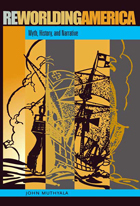 Reworlding America: Myth, History, and Narrative
John Muthyala
Ohio University Press, 2006 John Muthyala's Reworlding America moves beyond the U.S.-centered approach of traditional American literary criticism. In this groundbreaking book, Muthyala argues for a transgeographical perspective from which to study the literary and cultural histories of the Americas.
By emphasizing transnational migration, border crossing, and colonial modernity, Reworlding America exposes how national, ethnic, linguistic, religious, and cultural boundaries have been continually created and transgressed—with profound consequences for the peoples of the Americas.
Drawing from cultural studies, anthropology, literature, and history, Muthyala examines the literatures of the Americas in terms of their intimate relationship to questions of cultural survival, identity formation, and social power. He goes beyond nationalist, ethnocentric, and religious frameworks used to conceptualize American literary history and examines the connection between modernity and colonialism.
Reworlding America's significance extends into the realm of education, history, ethnography, and literary and cultural studies and contributes to the larger project of refashioning the role of English and American studies in a transborder, postnational global culture.
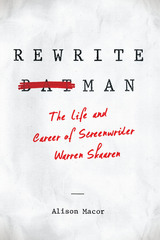 Rewrite Man: The Life and Career of Screenwriter Warren Skaaren
By Alison Macor
University of Texas Press, 2017 In Rewrite Man, Alison Macor tells an engrossing story about the challenges faced by a top screenwriter at the crossroads of mixed and conflicting agendas in Hollywood. Whether writing love scenes for Tom Cruise on the set of Top Gun, running lines with Michael Keaton on Beetlejuice, or crafting Nietzschean dialogue for Jack Nicholson on Batman, Warren Skaaren collaborated with many of New Hollywood’s most powerful stars, producers, and directors. By the time of his premature death in 1990, Skaaren was one of Hollywood’s highest-paid writers, although he rarely left Austin, where he lived and worked. Yet he had to battle for shared screenwriting credit on these films, and his struggles yield a new understanding of the secretive screen credit arbitration process—a process that has only become more intense, more litigious, and more public for screenwriters and their union, the Writers Guild of America, since Skaaren’s time. His story, told through a wealth of archival material, illuminates crucial issues of film authorship that have seldom been explored.
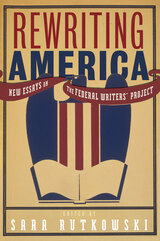 Rewriting America: New Essays on the Federal Writers' Project
Edited by Sara Rutkowski
University of Massachusetts Press, 2022 Established in 1935, the Federal Writers’ Project (FWP) sent over 6,500 unemployed historians, teachers, writers, and librarians out to document America’s past and present in the midst of the Great Depression. The English poet W. H. Auden referred to this New Deal program as “one of the noblest and most absurd undertakings ever attempted by any state.” Featuring original work by scholars from a range of disciplinary perspectives, this edited collection provides fresh insights into how this extraordinary program helped transform American culture. In addition to examining some of the major twentieth-century writers whose careers the FWP helped to launch—including Ralph Ellison, Richard Wright, and Margaret Walker—Rewriting America presents new perspectives on the role of African Americans, Mexican Americans, Asian Americans, and women on the project. Essays also address how the project’s goals continue to resonate with contemporary realities in the midst of major economic and cultural upheaval. Along with the volume editor, contributors include Adam Arenson, Sue Rubenstein DeMasi, Racheal Harris, Jerrold Hirsch, Kathi King, Maiko Mine, Deborah Mutnick, Diane Noreen Rivera, Greg Robinson, Robert Singer, James Sun, and David A. Taylor.
Rewriting Buddhism: Pali Literature and Monastic Reform in Sri Lanka, 1157–1270
Alastair Gornall
University College London, 2020 Rewriting Buddhism is the first intellectual history of premodern Sri Lanka’s most culturally productive period. This era of reform shaped the nature of Theravada Buddhism both in Sri Lanka and Southeast Asia, and even today continues to define monastic intellectual life in the region. Alastair Gornall argues that the long century’s literary productivity was not born of political stability, as is often thought, but rather of the social, economic and political chaos brought about by invasions and civil wars.
Rewriting Capitalism: Literature and the Market in Late Tsarist Russia and the Kingdom of Poland
Beth Holmgren
University of Pittsburgh Press, 1998 In this ground-breaking book, Beth Holmgren examines how—in turn-of-the-century Russia and its subject, the Kingdom of Poland—capitalism affected the elitist culture of literature, publishing, book markets, and readership. Rewriting Capitalism considers how both “serious” writers and producers of consumer culture coped with the drastic power shift from “serious” literature to market-driven literature.
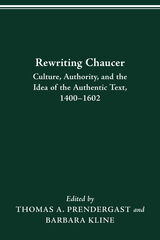 REWRITING CHAUCER: CULTURE, AUTHORITY, AND THE IDEA OF THE AUTHENTIC TEXT, 1400–1602
THOMAS A. PRENDERGAST
Ohio State University Press, 1999 This collection of original essays examines how the idea of an authentic Chaucerian text was reimagined and reproduced by medieval and early modern scribes and editors to satisfy and shape the cultural expectations of their audiences. These “reproductions” of Chaucer’s works epitomize the tension between developing notions of what makes a text “authentic” and the cultural pressures that led scribes and editors to construct their own versions of Chaucer and his works. The book begins by exploring medieval and early modern notions of origins and how they at once illuminate and problematize the recovery of Chaucerian texts. Essays in the second section examine how individual scribes and reading communities reshaped Chaucer’s texts. Finally, we see how the printing press—bringing with it a renewed concern about the idea of authenticity—led both to an increase in the number of works attributed to Chaucer and to increasing anxiety about their authenticity. The focus on the ways in which Chaucer was rewritten in different cultural and aesthetic contexts will enable medieval and early modern critics to situate Chaucer more fully within his cultural milieu, while illuminating the ways in which his reputation as both a “laureate poet” and a “lewed compilator” affected rewritings of his works. Rewriting Chaucer, then, will appeal both to scholars interested in the critical juncture between manuscript and print culture and to those interested in how culture affects the reproduction of authoritative texts.
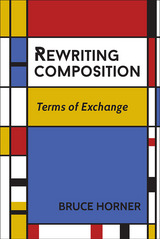 Rewriting Composition: Terms of Exchange
Bruce Horner
Southern Illinois University Press, 2016 Bruce Horner’s Rewriting Composition: Terms of Exchange shows how dominant inflections of key terms in composition—language, labor, value/evaluation, discipline, and composition itself—reinforce composition’s low institutional status and the poor working conditions of many of its instructors and tutors. Placing the circulation of these terms in multiple contemporary contexts, including globalization, world Englishes, the diminishing role of labor and the professions, the “information” economy, and the privatization of higher education, Horner demonstrates ways to challenge debilitating definitions of these terms and to rework them and their relations to one another.
Each chapter of Rewriting Composition focuses on one key term, discussing how limitations set by dominant definitions shape and direct what compositionists do and how they think about their work. The first chapter, “Composition,” critiques a discourse of composition as lacking and therefore as in need of being either put to an end, renamed, aligned with other fields, or supplemented with work in other disciplines or other forms of composition. Rather than seeing composition as something to be abandoned, replaced, or supplemented, Horner suggests ways of productively engaging with the ordinary work of composition whose ostensible lack is assumed in the dominant discourse. Subsequent chapters apply this reconsideration to other key terms, critiquing dominant conceptions of “language” and English as stable; examining how “labor” in composition is divorced from the productive force of social relations to which language work contributes; rethinking the terms of value by which the labor of composition teachers, administrators, and students is measured; and questioning the application of conventional definitions of professional academic disciplinarity to composition. By exposing limitations in dominant conceptions of the work of composition and by modeling and opening up space for new conceptions of key terms, Rewriting Composition offers teachers of composition and rhetoric, writing scholars, and writing program administrators the critical tools necessary for charting the future of composition studies.
(Re)Writing Craft: Composition, Creative Writing, and the Future of English Studies
Tim Mayers
University of Pittsburgh Press, 2007 (Re)Writing Craft focuses on the gap that exists in many English departments between creative writers and compositionists on one hand, and literary scholars on the other, in an effort to radically transform the way English studies are organized and practiced today. In proposing a new form of writing he calls "craft criticism," Mayers, himself a compositionist and creative writer, explores the connections between creative writing and composition studies programs, which currently exist as separate fields within the larger and more amorphous field of English studies. If creative writing and composition studies are brought together in productive dialogue, they can, in his view, succeed in inverting the common hierarchy in English departments that privileges interpretation of literature over the teaching of writing.
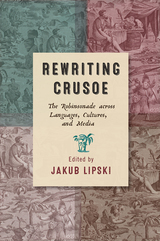 Rewriting Crusoe: The Robinsonade across Languages, Cultures, and Media
Jakub Lipski
Bucknell University Press, 2020 Published in 1719, Defoe’s Robinson Crusoe is one of those extraordinary literary works whose importance lies not only in the text itself but in its persistently lively afterlife. German author Johann Gottfried Schnabel—who in 1731 penned his own island narrative—coined the term “Robinsonade” to characterize the genre bred by this classic, and today hundreds of examples can be identified worldwide. This celebratory collection of tercentenary essays testifies to the Robinsonade’s endurance, analyzing its various literary, aesthetic, philosophical, and cultural implications in historical context. Contributors trace the Robinsonade’s roots from the eighteenth century to generic affinities in later traditions, including juvenile fiction, science fiction, and apocalyptic fiction, and finally to contemporary adaptations in film, television, theater, and popular culture. Taken together, these essays convince us that the genre’s adapt- ability to changing social and cultural circumstances explains its relevance to this day.
Published by Bucknell University Press. Distributed worldwide by Rutgers University Press.
 Rewriting Exodus: American Futures from Du Bois to Obama
Anna Hartnell
Pluto Press, 2011 Exodus, as a powerful narrative of liberation, has been a central imaginative touchstone in the black American struggle against US racism. This book traces the concept in a number of pivotal black thinkers, and explores its signficance for contemporary America.
The exodus story is a fitting allegory for the painful experience of exile that disproportionately afflicted African Americans in the aftermath of Hurricane Katrina, and it also provides compelling imagery for the triumphant election of Barack Obama in 2008. Building around these themes, Anna Hartnell traces the intellectual development of one of the defining narratives of black American thinking on social justice in the United States.
In placing black America at the centre of the study of US culture, Rewriting Exodus suggests new ways of thinking about America's relationship with the Middle East and the wider postcolonial world. Hartnell's groundbreaking contribution marks a vital new chapter in American cultural and political history.
 Rewriting History and the Myth of the French Nation: The Hagiography of Radegund of Poitiers from Medieval to Modernity
Anna Katharina Rudolph
Amsterdam University Press, 2025 This multidisciplinary analysis of the cult of Radegund of Poitiers, from the sixth century to the twenty-first, illuminates the roles saints play at the intersection of gender and politics. No other medieval saint was so politically charged or had such an astonishing range of constructed personae. The many “Radegunds” encountered in this study – virgin, wife, mother, royalist, republican, colonizer – can all be interpreted as responses to contemporary political events, shifting spiritual trends, and changing attitudes towards women’s role in society or the Church. The long trajectory of Radegund’s meanings and functions over the centuries suggests that saints have played a more significant ideological role in state formation, nationalism, and identity politics than is typically recognized. To “rewrite” Radegund is thus to rewrite the history of the French nation, and this ground-breaking study shows how powerful medieval hagiography has been and continues to be in the emergence of nationalism and the “Myth of the French Nation.”
Rewriting: How To Do Things With Texts
Joseph Harris
Utah State University Press, 2006 "Like all writers, intellectuals need to say something new and say it well. But unlike many other writers, what intellectuals have to say is bound up with the books we are reading . . . and the ideas of the people we are talking with." What are the moves that an academic writer makes? How does writing as an intellectual change the way we work from sources? In Rewriting, a textbook for the undergraduate classroom, Joseph Harris draws the college writing student away from static ideas of thesis, support, and structure, and toward a more mature and dynamic understanding. Harris wants college writers to think of intellectual writing as an adaptive and social activity, and he offers them a clear set of strategies—a set of moves—for participating in it.
Rewriting: How to Do Things with Texts, Second Edition
Joseph Harris
Utah State University Press, 2017 “Like all writers, intellectuals need to say something new and say it well. But for intellectuals, unlike many other writers, what we have to say is bound up with the books we are reading . . . and the ideas of the people we are talking with.” What are the moves that an academic writer makes? How does writing as an intellectual change the way we work from sources? In Rewriting, Joseph Harris draws the college writing student away from static ideas of thesis, support, and structure, and toward a more mature and dynamic understanding. Harris wants college writers to think of intellectual writing as an adaptive and social activity, and he offers them a clear set of strategies—a set of moves—for participating in it. Introducing remixing as an additional signature move and updated with new attention to digital writing, the second edition both extends and rethinks the ideas of the original.
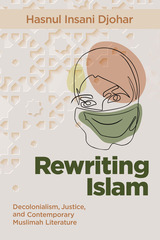 Rewriting Islam: Decolonialism, Justice, and Contemporary Muslimah Literature
Hasnul Insani Djohar
Ohio State University Press, 2024 In Rewriting Islam, Hasnul Insani Djohar examines how women writers of the Ummah, or Muslim religious community, portray Muslim women fighting for gender and social justice while living as minorities in prosperous countries. Focusing on the body of Muslimah writing that has emerged since the US invasion of Iraq in 2003, Djohar considers fiction such as Mohja Kahf’s The Girl in the Tangerine Scarf, Randa Jarrar’s A Map of Home, Laila Lalami’s Hope and Other Dangerous Pursuits, and G. Willow Wilson’s Alif the Unseen. Djohar also examines poetry, memoirs, and short stories. Together, these works depict the diversity of Muslimah identities and cultures worldwide. Operating within postcolonial and Islamic studies frameworks, Djohar investigates how these writers contribute to larger debates around gender and globalization—including justice for immigrants and refugees, who are often blamed for social problems rather than recognized as victims of US imperialism and transnational capitalist globalization. By way of close readings and careful attention to historical, cultural, and religious contexts, Djohar illuminates how Muslimah American writers decolonize justice and white sovereignty by elevating interconnectedness, spirituality, and sisterhood across diverse communities.
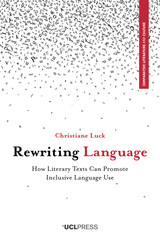 Rewriting Language: How Literary Texts Can Promote Inclusive Language Use
Christiane Luck
University College London, 2020 Extensively studied and heavily debated, inclusive language is a hot topic. Despite decades of research and scholarship, findings on its importance slip into neglect. How do we convince speakers of the importance of inclusive language? Christiane Luck’s Rewriting Language provides one possible answer: read fiction.
By engaging readers with the issue, novels spread awareness and promote linguistic change. Novels have the power to paint the problems presented with accessibility and spark change. Analyzing five iconic literary texts, including Ursula K. Le Guin’s The Left Hand of Darkness, Verena Stefan’s Häutungen, Marge Piercy’s Woman on the Edge of Time, and June Arnold’s The Cook and the Carpenter, Luck dives into the possibilities and challenges of linguistic neutrality. Rewriting Language illustrates the link between language and imagination. As Luck concludes, novels are valuable tools to embolden inclusive language use.
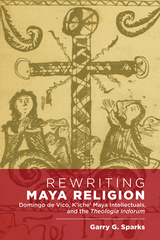 Rewriting Maya Religion: Domingo de Vico, K’iche’ Maya Intellectuals, and the Theologia Indorum
Garry G. Sparks
University Press of Colorado, 2019 In Rewriting Maya Religion Garry Sparks examines the earliest religious documents composed by missionaries and native authors in the Americas, including a reconstruction of the first original, explicit Christian theology written in the Americas—the nearly 900-page Theologia Indorum (Theology for [or of] the Indians), initially written in Mayan languages by Friar Domingo de Vico by 1554. Sparks traces how the first Dominican missionaries to the Maya repurposed native religious ideas, myths, and rhetoric in their efforts to translate a Christianity and how, in this wake, K’iche’ Maya elites began to write their own religious texts, like the Popol Vuh. This ethnohistory of religion critically reexamines the role and value of indigenous authority during the early decades of first contact between a Native American people and Christian missionaries.
Centered on the specific work of Dominicans among the Highland Maya of Guatemala in the decades prior to the arrival of the Catholic Reformation in the late sixteenth century, the book focuses on the various understandings of religious analyses—Hispano-Catholic and Maya—and their strategic exchanges, reconfigurations, and resistance through competing efforts of religious translation. Sparks historically contextualizes Vico’s theological treatise within both the wider set of early literature in K’iche’an languages and the intellectual shifts between late medieval thought and early modernity, especially the competing theories of language, ethnography, and semiotics in the humanism of Spain and Mesoamerica at the time.
Thorough and original, Rewriting Maya Religion serves as an ethnohistorical frame for continued studies on Highland Maya religious symbols, discourse, practices, and logic dating back to the earliest documented evidence. It will be of great significance to scholars of religion, ethnohistory, linguistics, anthropology, and Latin American history.
Rewriting Modernity: Studies in Black South African Literary History
David Attwell
Ohio University Press, 2006 Rewriting Modernity: Studies in Black South African Literary History connects the black literary archive in South Africa—from the nineteenth-century writing of Tiyo Soga to Zakes Mda in the twenty-first century—to international postcolonial studies via the theory of transculturation, a position adapted from the Cuban anthropologist Fernando Ortiz. David Attwell provides a welcome complication of the linear black literary history—literature as a reflection of the process of political emancipation—that is so often presented. He focuses on cultural transactions in a series of key moments and argues that black writers in South Africa have used print culture to map themselves onto modernity as contemporary subjects, to negotiate, counteract, reinvent, and recast their positioning within colonialism, apartheid, and the context of democracy.
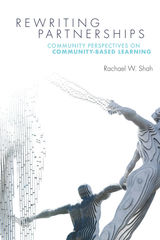 Rewriting Partnerships: Community Perspectives on Community-Based Learning
Rachael W. Shah
Utah State University Press, 2020 Winner of the IARSLCE 2021 Publication of the Year Award and the Coalition for Community Writing Outstanding Book Award. Community members are rarely tapped for their insights on engaged teaching and research, but without these perspectives, it is difficult to create ethical and effective practices. Rewriting Partnerships calls for a radical reorientation to the knowledges of community partners. Emphasizing the voices of community members themselves—the adult literacy learners, secondary students, and youth activists who work with college students—the book introduces Critical Community-Based Epistemologies, a deeply practical approach to knowledge construction that centers the perspectives of marginalized participants.
Drawing on interviews with over eighty community members, Rewriting Partnerships features community knowledges in three common types of community-engaged learning: youth working with college students in a writing exchange program, nonprofit staff who serve as clients for student projects, and community members who work with graduate students. Interviewees from each type of partnership offer practical strategies for creating more ethical collaborations, including how programs are built, how projects are introduced to partners, and how graduate students are educated. The book also explores three approaches to partnership design that create space for community voices at the structural level: advisory boards, participatory evaluation, and community grading.
Immediately applicable to teachers, researchers, community partners, and administrators involved in community engagement, Rewriting Partnerships offers concrete strategies for creating more community-responsive partnerships at the classroom level as well as at the level of program and research design. But most provocatively, the book challenges common assumptions about who can create knowledge about community-based learning, demonstrating that community partners have the potential to contribute significantly to community engagement scholarship and program decision-making.
 Rewriting Television
Alison Peirse
Rutgers University Press, 2025 Rewriting Television suggests that it is time for a radical overhaul of television studies. If we don’t want to merely recycle the same old methods, approaches, and tropes for another twenty years, we need to consider major changes in why and how we do our work. This book offers a new model for doing television (or film or media) studies that can be taken up around the world. It synthesizes ideas from production studies, screenwriting studies, and the idea of “writing otherwise” to create a new way of studying television. It presents an entirely original approach to working with practitioner interviews that has never been seen before in film, television, or media studies. It then offers a series of original reflections on form, story, and voice and considers how these reflections could shape future writing in our discipline(s). Ultimately, this is a book of ideas. This book asks “what if?” This book is an opportunity to imagine differently.
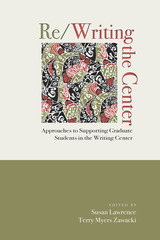 Re/Writing the Center: Approaches to Supporting Graduate Students in the Writing Center
Susan Lawrence
Utah State University Press, 2018 Re/Writing the Center illuminates how core writing center pedagogies and institutional arrangements are complicated by the need to create intentional, targeted support for advanced graduate writers. Most writing center tutors are undergraduates, whose lack of familiarity with the genres, preparatory knowledge, and research processes integral to graduate-level writing can leave them underprepared to assist graduate students. Complicating the issue is that many of the graduate students who take advantage of writing center support are international students.
The essays in this volume show how to navigate the divide between traditional writing center theory and practices, developed to support undergraduate writers, and the growing demand for writing centers to meet the needs of advanced graduate writers. Contributors address core assumptions of writing center pedagogy, such as the concept of peers and peer tutoring, the emphasis on one-to-one tutorials, the positioning of tutors as generalists rather than specialists, and even the notion of the writing center as the primary location or center of the tutoring process. Re/Writing the Center offers an imaginative perspective on the benefits writing centers can offer to graduate students and on the new possibilities for inquiry and practice graduate students can inspire in the writing center.
Contributors: Laura Brady, Michelle Cox, Thomas Deans, Paula Gillespie, Mary Glavan, Marilyn Gray, James Holsinger, Elena Kallestinova, Tika Lamsal, Patrick S. Lawrence, Elizabeth Lenaghan, Michael A. Pemberton, Sherry Wynn Perdue, Doug Phillips, Juliann Reineke, Adam Robinson, Steve Simpson, Nathalie Singh-Corcoran, Ashly Bender Smith, Sarah Summers, Molly Tetreault, Joan Turner, Bronwyn T. Williams, Joanna Wolfe
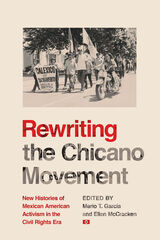 Rewriting the Chicano Movement: New Histories of Mexican American Activism in the Civil Rights Era
Mario T. García
University of Arizona Press, 2021 The Chicano Movement, el movimiento, is known as the largest and most expansive civil rights and empowerment movement by Mexican Americans up to that time. It made Chicanos into major American political actors and laid the foundation for today’s Latino political power. Rewriting the Chicano Movement is a collection of powerful new essays on the Chicano Movement that expand and revise our understanding of the movement. These essays capture the commitment, courage, and perseverance of movement activists, both men and women, and their struggles to achieve the promises of American democracy.
The essays in this volume broaden traditional views of the Chicano Movement that are too narrow and monolithic. Instead, the contributors to this book highlight the role of women in the movement, the regional and ideological diversification of the movement, and the various cultural fronts in which the movement was active. Rewriting the Chicano Movement stresses that there was no single Chicano Movement but instead a composite of movements committed to the same goal of Chicano self-determination. Scholars, students, and community activists interested in the history of the Chicano Movement can best start by reading this book.
Contributors: Holly Barnet-Sanchez, Tim Drescher, Jesús Jesse Esparza, Patrick Fontes, Mario T. García, Tiffany Jasmín González, Ellen McCracken, Juan Pablo Mercado, Andrea Muñoz, Michael Anthony Turcios, Omar Valerio-Jiménez
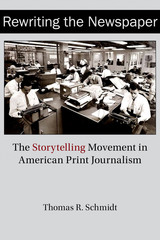 Rewriting the Newspaper: The Storytelling Movement in American Print Journalism
Thomas R. Schmidt
University of Missouri Press, 2020 Between the 1970s and the 1990s American journalists began telling the news by telling stories. They borrowed narrative techniques, transforming sources into characters, events into plots, and their own work from stenography to anthropology. This was more than a change in style. It was a change in substance, a paradigmatic shift in terms of what constituted news and how it was being told. It was a turn toward narrative journalism and a new culture of news, propelled by the storytelling movement.
Thomas Schmidt analyzes the expansion of narrative journalism and the corresponding institutional changes in the American newspaper industry in the last quarter of the twentieth century. In doing so, he offers the first institutionally situated history of narrative journalism’s evolution from the New Journalism of the 1960s to long-form literary journalism in the 1990s. Based on the analysis of primary sources, industry publications, and oral history interviews, this study traces how narrative techniques developed and spread through newsrooms, advanced by institutional initiatives and a growing network of practitioners, proponents, and writing coaches who mainstreamed the use of storytelling. Challenging the popular belief that it was only a few talented New York reporters (Tome Wolfe, Jimmy Breslin, Gay Talese, Joan Didion, and others) who revolutionized journalism by deciding to employ storytelling techniques in their writing, Schmidt shows that the evolution of narrative in late twentieth century American Journalism was more nuanced, more purposeful, and more institutionally based than the New Journalism myth suggests.
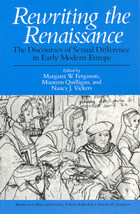 Rewriting the Renaissance: The Discourses of Sexual Difference in Early Modern Europe
Edited by Margaret W. Ferguson, Maureen Quilligan, and Nancy Vickers
University of Chicago Press, 1986 Juxtaposing the insights of feminism with those of marxism, psychoanalysis, and deconstruction, this unique collection creates new common ground for women's studies and Renaissance studies. An outstanding array of scholars—literary critics, art critics, and historians—reexamines the role of women and their relations with men during the Renaissance. In the process, the contributors enrich the emerging languages of and about women, gender, and sexual difference.
Throughout, the essays focus on the structures of Renaissance patriarchy that organized power relations both in the state and in the family. They explore the major conequences of patriarchy for women—their marginalization and lack of identity and power—and the ways in which individual women or groups of women broke, or in some cases deliberately circumvented, the rules that defined them as a secondary sex. Topics covered include representations of women in literature and art, the actual work done by women both inside and outside of the home, and the writings of women themselves. In analyzing the rhetorical strategies that "marginalized" historical and fictional women, these essays counter scholarly and critical traditions that continue to exhibit patriarchal biases.
Rewriting the Word "God": In the Arc of Converging Lines between Innovative Theory, Theology, and Poetry
Romana Huk
University of Alabama Press, 2025 In Rewriting the Word “God”, Romana Huk explores how avant-garde poets have radically reimagined divinity, human identity, and the real—without abandoning their faith traditions. Blending theology, philosophy, and poetic innovation, this expansive study traces how figures like Gerard Manley Hopkins and Fanny Howe challenge religious orthodoxy and literary convention to illuminate new paths toward spiritual and social understanding. Huk’s work is a bold intellectual journey through the intersections of belief, art, and justice.
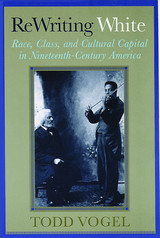 Rewriting White: Race, Class, and Cultural Capital in Nineteenth-Century America
Todd Vogel
Rutgers University Press, 2004 What did it mean for people of color in nineteenth-century America to speak or write "white"? More specifically, how many and what kinds of meaning could such "white" writing carry? In ReWriting White, Todd Vogel looks at how America has racialized language and aesthetic achievement. To make his point, he showcases the surprisingly complex interactions between four nineteenth-century writers of color and the "standard white English" they adapted for their own moral, political, and social ends. The African American, Native American, and Chinese American writers Vogel discusses delivered their messages in a manner that simultaneously demonstrated their command of the dominant discourse of their times-using styles and addressing forums considered above their station-and fashioned a subversive meaning in the very act of that demonstration. The close readings and meticulous archival research in ReWriting White upend our conventional expectations, enrich our understanding of the dynamics of hegemony and cultural struggle, and contribute to the efforts of other cutting-edge contemporary scholars to chip away at the walls of racial segregation that have for too long defined and defaced the landscape of American literary and cultural studies.
Rewriting Work
Lora Anderson
University Press of Colorado, 2024 Because of its centrality to the professional identity of any communications-focused discipline, the workplace has for decades been a focus of practice and scholarship in technical and professional communication. The contributors to Rewriting Workexamine workplace writing through the lenses of identity and changing communication practices, arguing that place can be viewed as a productive frame for understanding how technical and professional communication has changed over the last two decades. The result is a timely set of chapters that approach workplace writing through two key questions: How do we fit in? How do we adapt? The answers to these questions provide insights into the primary factors that have shaped the practices and identities of technical and professional communicators in the 21st century.
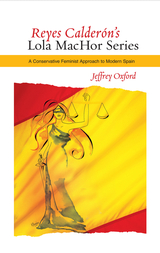 Reyes Calderon's Lola MacHor Series: A Conservative Feminist Approach to Modern Spain
Jeffrey Oxford
Sussex Academic Press, 2022 In spite of the fact that detective fiction has been the most popular genre utilised by Spanish authors over the last thirty or so years, the female detective has appeared in such works on relatively rare occasions. Less frequent are Spanish female authors of detective fiction who employ a female detective as their main character. One author who has broken this stereotype is Reyes Calderon, with her female juez de instruccion (examining magistrate), originally created because the author was convinced that one popular, female, main character detective that did exist was simply "a man who was wearing a skirt" (interview with author). With the creation of her Basque character who, over the series, evolves from law-school professor to member of the Spanish Supreme Court, Calderon is able to "design a normal woman who confronts abnormal situations" (interview with author). Through such, Reyes Calderon aptly portrays both how far Spanish women have come since the days/restrictions of the Franco dictatorship but yet how remnants of conservative thought still pervade their mindset. She thus uses the most popular of genres to make a myriad of cultural observations concerning her native country and the women of "her generation". This book focuses on the female detective in Hispanic literature; the Lola MacHor Series, where via the main character Lola, Calderon is conducting a cultural studies experiment/explanation of modern-day Spain; concomitant issues of characterisation and Calderon's debt to Naturalism; Spanish novel writing and narrative style; and the pervading conservative/feminist dichotomy as it transpires in Spanish social commentary and moralising.
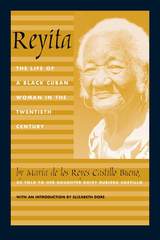 Reyita: The Life of a Black Cuban Woman in the Twentieth Century
María de los Reyes Castillo Bueno
Duke University Press, 2000 María de los Reyes Castillo Bueno (1902–1997), a black woman known as “Reyita,” recounts her life in Cuba over the span of ninety years. Reyita’s voice is at once dignified, warm, defiant, strong, poetic, principled, and intelligent. Her story—as told to and recorded by her daughter Daisy Castillo—begins in Africa with her own grandmother’s abduction by slave-traders and continues through a century of experiences with prejudice, struggle, and change in Cuba for Reyita and her numerous family members.
Sensitive to and deeply knowledgeable of the systemic causes and consequences of poverty, Reyita’s testimony considers the impact of slavery on succeeding generations, her mother’s internalized racism, and Cuba’s residual discrimination. The humiliation and poverty inflicted on the black Cuban community as well as her decision to marry a white man to ensure a higher standard of living form the basis of other chapters. Reyita actively participated in the life of the community—often caring for the children of prostitutes along with her own eight children and giving herbal medicine and “spiritualist” guidance to ill or troubled neighbors. She describes her growing resistance, over five decades of marriage, to her husband’s sexism and negativity. Strong-willed and frank about her sexuality as well as her religious and political convictions, Reyita recounts joining the revolutionary movement in the face of her husband’s stern objections, a decision that added significant political purpose to her life. At book’s end, Reyita radiates gratification that her 118 descendants have many different hues of skin, enjoy a variety of professions, and—“most importantly”—are free of racial prejudice.
 Reynard the Fox
Retold by Anne Louise Avery
Bodleian Library Publishing, 2020 Reynard—a subversive, dashing, anarchic, aristocratic, witty fox from the watery lowlands of medieval East Flanders—is in trouble. He has been summoned to the court of King Noble the Lion, charged with all manner of crimes and misdemeanors. How will he pit his wits against his accusers—greedy Bruin the Bear, pretentious Courtoys the Hound, and dark and dangerous Isengrim the Wolf—to escape the gallows?
Reynard was once the most popular and beloved character in European folklore, as familiar as Robin Hood, King Arthur, or Cinderella. His character spoke eloquently for the voiceless and disenfranchised, but also amused and delighted the elite, capturing hearts and minds across borders and societal classes for centuries. Based on William Caxton’s bestselling 1481 English translation of the Middle Dutch, this edition is an imaginative retelling of the Reynard story, expanded with new interpretations and innovative language and characterizations. With its themes of protest, resistance, and duplicity led by a personable, anti-heroic Fox, this gripping tale is as relevant and controversial today as it was in the fifteenth century.
RF and Microwave Modeling and Measurement Techniques for Field Effect Transistors
Jianjun Gao
The Institution of Engineering and Technology, 2010 This book is an introduction to microwave and RF signal modeling and measurement techniques for field effect transistors. It assumes only a basic course in electronic circuits and prerequisite knowledge for readers to apply the techniques and improve the performance of integrated circuits, reduce design cycles and increase their chance at first time success. The first chapters offer a general overview and discussion of microwave signal and noise matrices, and microwave measurement techniques. The following chapters address modeling techniques for field effect transistors and cover models such as: small signal, large signal, noise, and the artificial neural network based.
RF and Microwave Module Level Design and Integration
Mohammad Almalkawi
The Institution of Engineering and Technology, 2019 RF and Microwave Module Level Design and Integration presents a thorough introduction to the basic elements of radio frequency (RF) and microwave modules, followed by a discussion of system-level concepts and measures that can be applied to real-world designs. With a strong emphasis on design and integration, the book offers practical solutions to today's commonly encountered challenges in RF and microwave modules, including system integration, network loss reduction techniques, electromagnetic compatibility, crosstalk reduction techniques, computer-aided design tools, system-level modeling methodologies, and system-level performance evaluation via common RF measurements. Several design examples are presented across the book chapters.
RF Power Amplifiers
Mihai Albulet
The Institution of Engineering and Technology, 2001 In this thorough overview, Mihai Albulet presents a full account of RF amplifiers and shows that understanding large-signal RF signals is simply a matter of understanding basic principles and their applications. In addition to discussing the basic concepts used in the analysis and design of RF power amplifiers, detailed mathematical derivations indicate the assumptions and limitations of the presented results, allowing the reader to calculate their usefulness in practical designs. Covered are amplification classes, circuit topologies, bias circuits, and matching networks.
RFIC and MMIC Design and Technology
I.D. Robertson
The Institution of Engineering and Technology, 2001 RFIC and MMIC technology provides the core components for many microwave and millimetre-wave communications, radar and sensing systems. Recent years have seen exciting developments, such as circuits operating to over 200 GHz, millimetre-wave micromachined antenna arrays and microelectromechanical systems (MEMS). At the same time, the rapid growth of wireless communications in the 1 to 6 GHz range has seen a dramatic shift towards advanced silicon technology. It is timely, therefore, to introduce this fully up-to-date second edition of a world-renowned standard text.
RFID Protocol Design, Optimization, and Security for the Internet of Things
Alex X. Liu
The Institution of Engineering and Technology, 2018 Radio-frequency identification (RFID) uses electromagnetic fields to automatically identify and track tags attached to objects. The tags contain electronically stored information. RFIDs have been widely used in countless applications such as object tracking, 3D positioning, indoor localization, supply chain management, automotive, inventory control, anti-theft, anti-counterfeit, and access control. The Internet of Things (IoT) promises a huge growth in RFID technology and usage.
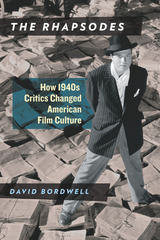 The Rhapsodes: How 1940s Critics Changed American Film Culture
David Bordwell
University of Chicago Press, 2016 Pauline Kael, Andrew Sarris, and Roger Ebert were three of America’s most revered and widely read film critics, more famous than many of the movies they wrote about. But their remarkable contributions to the burgeoning American film criticism of the 1960s and beyond were deeply influenced by four earlier critics: Otis Ferguson, James Agee, Manny Farber, and Parker Tyler. Throughout the 1930s and ’40s, Ferguson, Agee, Farber, and Tyler scrutinized what was on the screen with an intensity not previously seen in popular reviewing. Although largely ignored by the arts media of the day, they honed the sort of serious discussion of films that would be made popular decades later by Kael, Sarris, Ebert and their contemporaries.
With The Rhapsodes, renowned film scholar and critic David Bordwell—an heir to both those legacies—restores to a wider audience the work of Ferguson, Agee, Farber, and Tyler, critics he calls the “Rhapsodes” for the passionate and deliberately offbeat nature of their vernacular prose. Each broke with prevailing currents in criticism in order to find new ways to talk about the popular films that contemporaries often saw at best as trivial, at worst as a betrayal of art. Ferguson saw in Hollywood an engaging, adroit mode of popular storytelling. Agee sought in cinema the lyrical epiphanies found in romantic poetry. Farber, trained as a painter, brought a pictorial intelligence to bear on film. A surrealist, Tyler treated classic Hollywood as a collective hallucination that invited both audience and critic to find moments of subversive pleasure. With his customary clarity and brio, Bordwell takes readers through the relevant cultural and critical landscape and considers the critics’ writing styles, their conceptions of films, and their quarrels. He concludes by examining the profound impact of Ferguson, Agee, Farber, and Tyler on later generations of film writers.
The Rhapsodes allows readers to rediscover these remarkable critics who broke with convention to capture what they found moving, artful, or disappointing in classic Hollywood cinema and explores their robust—and continuing—influence.
Rhet Ops: Rhetoric and Information Warfare
Jim Ridolfo
University of Pittsburgh Press, 2019 In this edited volume, authors seek to document and analyze how state and non-state actors leverage digital rhetoric as a twenty-first-century weapon of war. Rhet Ops offer readers a chance to focus on the human dimension of rhetorical practice within mobile technologies and social networks: to reflect not only on the durable question of what it means to conduct oneself ethically as a speaker or writer, but also what it means to learn the art of rhetoric as a means to engage adversaries in war and conflict.
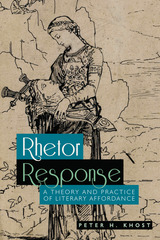 Rhetor Response: A Theory and Practice of Literary Affordance
Peter H. Khost
Utah State University Press, 2018 Bridging the disciplinary divide between writing and literature, Rhetor Response introduces the concept and pedagogical applications of “literary affordances”—the ways in which readers “use” and integrate literature into their own writing or lives. Unconcerned with authorial intent, interpretive meaning, or critical reception, “affordance” signifies a shift in focus from what literary texts mean and do to what one can do with them.
This book presents both opportunities and challenges to writing studies, a field whose burgeoning disciplinary independence ironically relies on a sizable underclass of specialists in literature rather than writing. Incorporating elements of rhetorical theory, literary criticism, pedagogical methodology, political critique, and psychological and philosophical memoir, Peter H. Khost complicates and revives the relevance of literature—from belles lettres to fanfiction—by turning from interpretation to affordance in order to identify readers’ applications of literary textual features to unrelated lived situations.
Rhetor Response theorizes and exemplifies literary affordance as a constructive step toward professional reconciliation, as well as an entry into greater textual power and pleasure for students and readers. It is a one-of-a-kind resource for college writing program administrators, faculty and scholars in English and writing studies, and graduate and advanced undergraduate students across both disciplines.
Rhetoric
Renato Barilli
University of Minnesota Press, 1989
 Rhetoric & Public Affairs 18, no. 1
Martin J. Medhurst
Michigan State University Press Journals, 2015 IN THIS ISSUE
Articles
David G. Levasseur, Lisa M. Gring-Pemble, "Not All Capitalist Stories Are Created Equal: Mitt Romney’s Bain Capital Narrative and the Deep Divide in American Economic Rhetoric"
Stephanie A. Martin, "Recession Resonance: How Evangelical Megachurch Pastors Promoted Fiscal Conservatism in the Aftermath of the 2008 Financial Crash"
Christopher J. Gilbert, "If This Statue Could Talk: Statuary Satire in the Pasquinade Tradition"
Forum
Charles E. Morris III, "Introduction"
Bradford Vivian, "The Sight and Sound of Lincoln"
Kirt H. Wilson, "The Intimate and Ugly Politics of Emancipation"
Cara A. Finnegan, "Slave Photographs in Lincoln"
Charles E. Morris III, "Lincoln’s Queer Hands"
Brian J. Snee, "Saving the Emancipator"
Shawn J. Parry-Giles, David S. Kaufer, "Lincoln: The “Double Consciousness” of the Man and the President"
David Zarefsky, "Lincoln and Historical Accuracy"
Review Essay
Erin J. Rand, "Bad Feelings in Public: Rhetoric, Affect, and Emotion"
Book Reviews
Kristina Horn Sheeler and Karrin Vasby Anderson, Woman President: Confronting Postfeminist Political Culture, reviewed by Allison M. Prasch
Richard W. Leeman, The Teleological Discourse of Barack Obama, reviewed by Derek Sweet
Andre E. Johnson, The Forgotten Prophet: Bishop Henry McNeal Turner and the African American Prophetic Tradition, reviewed by Theon E. Hill
Michael L. Ondaatje, Black Conservative Intellectuals in Modern America, reviewed by Cynthia King
Kendall R. Phillips and G. Mitchell Reyes, eds., Global Memoryscapes: Contesting Remembrance in a Transnational Age, reviewed by Cynthia Duquette Smith
Samuel McCormick, Letters to Power: Public Advocacy Without Public Intellectuals, reviewed by James H. Collier
 Rhetoric & Public Affairs 18, no. 2
Martin J. Medhurst
Michigan State University Press Journals, 2015 IN THIS ISSUE
Articles
Luke Winslow, "The Undeserving Professor: Neoliberalism and the Reinvention of Higher Education"
Allison M. Prasch, "Reagan at Pointe du Hoc: Deictic Epideictic and the Persuasive Power of 'Bringing Before the Eyes'”
Eric C. Miller, "Phyllis Schlafly’s 'Positive' Freedom: Liberty, Liberation, and the Equal Rights Amendment"
Richard Benjamin Crosby, "Toward a Practical, Civic Piety: Mitt Romney, Barack Obama, and the Race for National Priest"
Forum
"Editor's Note"
Brett Lunceford, "Armed Victims: The Ego Function of Second Amendment Rhetoric"
Joshua Gunn, "Tears of Refusal: Crying with Collins (and Lundberg), with Reference to Pee-wee Herman"
J. Michael Hogan, Craig Rood, "Rhetorical Studies and the Gun Debate: A Public Policy Perspective"
Amy L. Heyse, "American and Global Perspectives on Conservatism"
Book Reviews
Isaac West, Transforming Citizenships: Transgender Articulations of the Law, Reviewed by Anjali Vats
Kimberly Harrison, The Rhetoric of Rebel Women: Civil War Diaries and Confederate Persuasion, Reviewed by Catherine L. Hobbs
Ebony A. Utley, Rap and Religion: Understanding the Gangsta’s God, Reviewed by Rudo Mudiwa
Michelle Ballif, ed., Theorizing Histories of Rhetoric, Reviewed by Mari Lee Mifsud
John T. Gage, ed., The Promise of Reason: Studies in The New Rhetoric, Reviewed by Janice W. Fernheimer
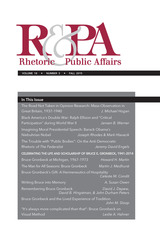 Rhetoric & Public Affairs 18, no. 3
Martin J. Medhurst
Michigan State University Press Journals, 2015 IN THIS ISSUE
Articles
J. Michael Hogan, "The Road Not Taken in Opinion Research: Mass-Observation in Great Britain, 1937–1940"
Jansen B. Werner, "Black America’s Double War: Ralph Ellison and “Critical Participation” during World War II"
Joseph Rhodes, "Imagining Moral Presidential Speech: Barack Obama’s Niebuhrian Nobel"
Jeremy David Engels, "The Trouble with “Public Bodies”: On the Anti-Democratic Rhetoric of The Federalist"
Celebrating the Life and Scholarship of Bruce E. Gronbeck, 1941–2014
Howard H. Martin, "Bruce Gronbeck at Michigan, 1967–1973"
Martin J. Medhurst, "The Man for All Seasons: Bruce Gronbeck"
Celeste M. Condit, "Bruce Gronbeck’s Gift: A Hermeneutics of Hospitality"
A. Susan Owen, "Writing Bruce into Memory"
David J. Depew, "Remembering Bruce Gronbeck"
John M. Sloop, "Bruce Gronbeck and the Lived Experience of Tradition"
Leslie A. Hahner, "'It's always more complicated than that': Bruce Gronbeck on Visual Method"
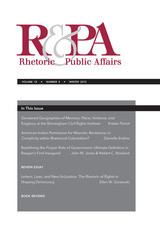 Rhetoric & Public Affairs 18, no. 4
Martin J. Medhurst
Michigan State University Press Journals, 2015 IN THIS ISSUE
Articles
Kristan Poirot, "Gendered Geographies of Memory: Place, Violence, and Exigency at the Birmingham Civil Rights Institute"
Danielle Endres, "American Indian Permission for Mascots: Resistance or Complicity within Rhetorical Colonialism?"
Robert C. Rowland, John M. Jones, "Redefining the Proper Role of Government: Ultimate Definition in Reagan’s First Inaugural"
Review Essay
Ellen W. Gorsevski, "Letters, Laws, and New (In)Justice: The Rhetoric of Rights in Shaping Democracy"
Book Reviews
Paul Stob, William James and the Art of Popular Statement, Reviewed by Joseph Rhodes
Bryan Crable, Ralph Ellison and Kenneth Burke: At the Roots of the Racial Divide, Reviewed by Andrew C. Hansen
Jay P. Childers, The Evolving Citizen: American Youth and the Changing Norms of Democratic Engagement, Reviewed by Kristy Maddux
Samuel Walker, Presidents and Civil Liberties from Wilson to Obama: A Story of Poor Custodians, Reviewed by Zoe Hess Carney
Mark S. Ferrara, Barack Obama and the Rhetoric of Hope, Reviewed by Jason G. Williamson
Burton I. Kaufman, The Post-Presidency from Washington to Clinton, Reviewed by Adam J. Gaffey
Philip Dalton and Eric Kramer, Coarseness in U.S. Public Communication, Reviewed by Ilon Lauer
Amos Kiewe, Confronting Anti-Semitism: Seeking an End to Hateful Rhetoric, Reviewed by David Moscowitz
Karma R. Chávez, Queer Migration Politics: Activist Rhetoric and Coalitional Possibilities, Reviewed by Kirstin Wagner
Anne Marie Todd, Communicating Environmental Patriotism: A Rhetorical History of the American Environmental Movement, Reviewed by James Coleman McGuffey
Jay Timothy Dolmage, Disability Rhetoric, Reviewed by R. Kyle Kellam
Robert B. Hackey, Cries of Crisis: Rethinking the Healthcare Debate, Reviewed by Nathan Stormer
Tasha Dubriwny, The Vulnerable Empowered Woman: Feminism, Postfeminism, and Women’s Health, Reviewed by Bridget Sutherland
 Rhetoric & Public Affairs 19, no. 1
Martin J. Medhurst
Michigan State University Press Journals, 2016 IN THIS ISSUE
Articles
Ned O'Gorman, Kevin Hamilton, "The Sensibility of the State: Lookout Mountain Laboratory’s Operation Ivy and the Image of the Cold War 'Super'"
William Rodney Herring, "The Rhetoric of Credit, the Rhetoric of Debt: Economic Arguments in Early America and Beyond"
Forum
Laura J. Collins, "Rights Talk and Political Dispositions"
Review Essay
Zoltan P. Majdik, "On Rhetoric between Science and Society"
Book Reviews
Kristan Poirot, A Question of Sex: Feminism, Rhetoric, and Differences that Matter, reviewed by Jaclyn Nolan
Leslie J. Harris, State of the Marital Union: Rhetoric, Identity, and Nineteenth-Century Marriage Controversies, reviewed by Eric C. Miller
Marika Seigel, The Rhetoric of Pregnancy, reviewed by Judy Z. Segal
David Gold and Catherine L. Hobbs, Educating the New Southern Woman: Speech, Writing, and Race at the Public Women’s Colleges, 1884–1945, reviewed by Tiffany Lewis
Shawn J. Parry-Giles, Hillary Clinton in the News: Gender and Authenticity in American Politics, reviewed by Karrin Vasby Anderson
Karlyn Kohrs Campbell, The Great Silent Majority: Nixon’s 1969 Speech on Vietnamization, reviewed by Mary E. Stuckey
Roderick P. Hart, Jay P. Childers, and Colene J. Lind, Political Tone: How Leaders Talk and Why, reviewed by Michael J. Bergmaier
Marlia Banning, Manufacturing Uncertainty: Contemporary U.S. Public Life and the Conservative Right, reviewed by Thomas A. Salek
Jeffrey P. Mehltretter Drury, Speaking with the People’s Voice: How Presidents Invoke Public Opinion, reviewed by Jeffrey A. Kurr
James J. Kimble, Prairie Forge: The Extraordinary Story of the Nebraska Scrap Metal Drive of World War II, reviewed by Denise M. Bostdorff
Matthew May, Soapbox Rebellion: The Hobo Orator Union and the Free Speech Fights of the Industrial Workers of the World, 1909–1916, reviewed by Mary Anne Trasciatti
Maegan Parker Brooks, A Voice that Could Stir an Army: Fannie Lou Hamer and the Rhetoric of the Black Freedom Movement, reviewed by Aric Putnam
Saladin Ambar, Malcolm X at Oxford Union: Racial Politics in a Global Era, reviewed by Lisa Corrigan
Ronald C. Arnett, Communication Ethics in Dark Times: Hannah Arendt’s Rhetoric of Warning and Hope, reviewed by Nathan Crick
Stephen J. Hartnett, Eleanor Novek, and Jennifer K. Wood, eds., Working for Justice: A Handbook of Prison Education and Activism, reviewed by L. N. Badger
David D. Cooper, Learning in the Plural: Essays on the Humanities and Public Life, reviewed by William Keith
Kurt T. Lash, The Fourteenth Amendment and the Privileges and Immunities of American Citizenship, reviewed by Jessica Gantt Shafer
Christa J. Olson, Constitutive Visions: Indigeneity and Commonplaces of National Identity in Republican Ecuador, reviewed by Abigail Selzer King
Kathleen S. Lamp, A City of Marble: The Rhetoric of Augustan Rome, reviewed by Jeffrey Walker
Jim A. Kuypers, ed., Purpose, Practice, and Pedagogy in Rhetorical Criticism, reviewed by Antonio de Velasco
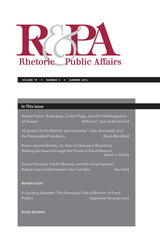 Rhetoric & Public Affairs 19, no. 2
Martin J. Medhurst
Michigan State University Press Journals, 2016 IN THIS ISSUE
Articles
William O. Saas, Rachel Hall, "Restive Peace: Body Bags, Casket Flags, and the Pathologization of Dissent"
Bryan Blankfield, “'A Symbol of His Warmth and Humanity': Fala, Roosevelt, and the Personable Presidency"
James J. Kimble, "Rosie’s Secret Identity, Or, How to Debunk a Woozle by Walking Backward through the Forest of Visual Rhetoric"
Paul Stob, "Sacred Symbols, Public Memory, and the Great Agnostic: Robert Ingersoll Remembers the Civil War"
Review Essays
Stephanie Houston Grey, "A Growing Appetite: The Emerging Critical Rhetoric of Food Politics"
Book Reviews
Michael J. Lee, Creating Conservatism: Postwar Words that Made an American Movement,Reviewed by Paul Elliot Johnson
C. Damien Arthur, Economic Actors, Economic Behaviors, and Presidential Leadership: The Constrained Effects of Rhetoric, Reviewed by Justin S. Vaughn
Brian Jackson and Gregory Clark, eds., Trained Capacities: John Dewey, Rhetoric, and Democratic Practice, Reviewed by Ira Allen
Josue David Cisneros, The Border Crossed Us: Rhetorics of Borders, Citizenship, and Latina/o Identity, Reviewed by D. Robert Dechaine
Katherine Elizabeth Mack, From Apartheid to Democracy: Deliberating Truth and Reconciliation in South Africa, Reviewed by Lindsay Harroff
Erin J. Rand, Reclaiming Queer: Activist and Academic Rhetorics of Resistance, Reviewed by Michael Warren Tumolo
Jason Edward Black and Charles E. Morris III, eds., An Archive of Hope: Harvey Milk’s Speeches and Writings, Reviewed by Timothy Oleksiak
Sue Curry Jansen, Walter Lippmann: A Critical Introduction to Media and Communication Theory, Reviewed by Peter Simonson
Shannon Walters, Rhetorical Touch: Disability, Identification, Haptics, Reviewed by Amy Vidali
Jordynn Jack, Autism and Gender: From Refrigerator Mothers to Computer Geeks, Reviewed by Jennifer A. Malkowski
Stephen Schneider, You Can’t Padlock an Idea: Rhetorical Education at the Highlander Folk School, 1932–1961, Reviewed by Jessica Enoch & Elizabeth Ellis
Stephen E. Jones, The Emergence of the Digital Humanities, Reviewed by Jessica Rudy
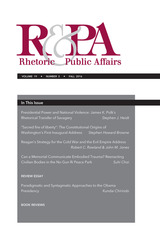 Rhetoric & Public Affairs 19, no. 3
Martin J. Medhurst
Michigan State University Press Journals, 2016 IN THIS ISSUE
Articles
Stephen J. Heidt, "Presidential Power and National Violence: James K. Polk’s Rhetorical Transfer of Savagery"
Stephen Howard Browne, “'Sacred fire of liberty': The Constitutional Origins of Washington’s First Inaugural Address"
Robert C. Rowland, John M. Jones, "Reagan’s Strategy for the Cold War and the Evil Empire Address"
Suhi Choi, "Can a Memorial Communicate Embodied Trauma? Reenacting Civilian Bodies in the No Gun Ri Peace Park"
Review Essay
Kundai Chirindo, "Paradigmatic and Syntagmatic Approaches to the Obama Presidency"
Book Reviews
Pat J. Gehrke and William M. Keith, eds., A Century of Communication Studies: The Unfinished Conversation, reviewed by Sara C. Vanderhaagen
Frank Farmer, After the Public Turn: Composition, Counterpublics, and the Citizen Bricoleur, reviewed by Daniel C. Bouwer
Ronald C. Arnett and Pat Arneson, eds., Philosophy of Communication Ethics: Alterity and the Other, reviewed by Melba Velez Ortiz
Lynda Walsh, Scientists as Prophets: A Rhetorical Genealogy, reviewed by John Lynch
Dana Anderson and Jessica Enoch, eds., Burke in the Archives: Using the Past to Transform the Future of Burkean Studies, reviewed by JamesF. Klumpp
Sue Curry Jansen, Walter Lippmann: A Critical Introduction to Media and Communication Theory, reviewed by Peter Simonson
Anthony F. Arrigo, Imaging Hoover Dam: The Making of a Cultural Icon, reviewed by Trischa Goodnow
Bonnie J. Dow, Watching Women’s Liberation 1970: Feminism’s Pivotal Year on the Network News, reviewed by Kristina Horn Sheeler
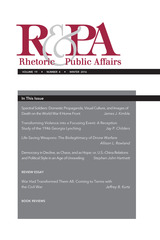 Rhetoric & Public Affairs 19, no. 4
Martin J. Medhurst
Michigan State University Press Journals, 2016 IN THIS ISSUE
Articles
James J. Kimble, "Spectral Soldiers: Domestic Propaganda, Visual Culture, and Images of Death on the World War II Home Front"
Jay P. Childers, "Transforming Violence into a Focusing Event: A Reception Study of the 1946 Georgia Lynching"
Allison C. Rowland, "Life-Saving Weapons: The Biolegitimacy of Drone Warfare"
Stephen John Hartnett, "Democracy in Decline, as Chaos, and as Hope; or, U.S.–China Relations and Political Style in an Age of Unraveling"
Review Essay
Jeffrey B. Kurtz, "War Had Transformed Them All: Coming to Terms with the Civil War"
Book Reviews
Jonathan J. Edwards, Superchurch: The Rhetoric and Politics of American Fundamentalism, reviewed by Paul Stob
Mary E. Stuckey, Voting Deliberatively: FDR and the 1936 Presidential Campaign, reviewed by Amos Kiewe
Timothy Barney, Mapping the Cold War: Cartography and the Framing of America’s International Power, reviewed by Amber Davisson
Thomas W. Benson and Brian J. Snee, eds., Michael Moore and the Rhetoric of Documentary, reviewed by Teresa Bergman
Cheryl Glenn and Andrea Lunsford, eds., Landmark Essays on Rhetoric and Feminism, 1973–2000, reviewed by Rosalyn Collings Eves
Marouf Hasian Jr., Restorative Justice, Humanitarian Rhetorics, and Public Memories of Colonial Camp Cultures, reviewed by Peter Ehrenhaus
Gregory Clark, Civic Jazz: American Music and Kenneth Burke on the Art of Getting Along, reviewed by Raymond Blanton
Amos Kiewe and Davis W. Houck, eds., The Effects of Rhetoric and the Rhetoric of Effects, reviewed by Ryan Neville-Shepard
 Rhetoric & Public Affairs 20, no. 1
Martin J. Medhurst
Michigan State University Press Journals, 2017 IN THIS ISSUE
Articles
Nathan S. Atkinson, "Public Exclusions: Garrison State Rhetoric and the Domestic Control of Atomic Energy, 1945–46"
Randall Fowler, "Lion’s Last Roar, Eagle’s First Flight: Eisenhower and the Suez Crisis of 1956"
Travis Cram, “'An Open Door: Responsibility and the Comic Frame in Obama’s Foreign Policy Rhetoric on Iran"
Jansen B. Werner, "Building a 'Dwelling Place' for Justice: Ethos Reinvention in Martin Luther King Jr.’s 'Where Do We Go from Here?'”
Kevin Musgrave, "A Battle for Hearts and Minds: Evangelical Capitalism and Pastoral Power in Bruce Barton’s 'The Public'”
Review Essay
Christine J. Gardner, "Popular Culture and the Evangelical Imagination"
Book Reviews
Craig R. Smith, Confessions of a Presidential Speechwriter, reviewed by Diana B. Carlin
Ian Haney López, Dog Whistle Politics: How Coded Racial Appeals Have Reinvented Racism and Wrecked the Middle Class, reviewed by Jonathan P. Rossing
John Oddo, Intertextuality and the 24-Hour News Cycle: A Day in the Rhetorical Life of Colin Powell’s U.N. Address, reviewed by Mark A. Thompson
Raka Shome, Diana and Beyond: White Femininity, National Identity, and Contemporary Media Culture, reviewed by Haneen Shafeeq Ghabra and Bernadette Marie Calafell
Scott Stroud, Kant and the Promise of Rhetoric, reviewed by Ronald C. Arnett
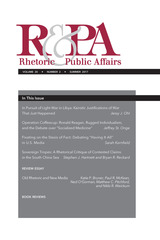 Rhetoric & Public Affairs 20, no. 2
Martin J. Medhurst
Michigan State University Press Journals, 2017 IN THIS ISSUE
Articles
Jessy J. Ohl, "In Pursuit of Light War in Libya: Kairotic Justifications of War That Just Happened"
Jeffrey St. Onge, "Operation Coffeecup: Ronald Reagan, Rugged Individualism, and the Debate over 'Socialized Medicine'”
Sarah Kornfield, "Fixating on the Stasis of Fact: Debating 'Having It All' in U.S. Media"
Stephen J. Hartnett, Bryan R. Reckard, "Sovereign Tropes: A Rhetorical Critique of Contested Claims in the South China Sea"
Review Essay
Ned O'Gorman , Katie P. Bruner, Paul R. McKean, Matthew C. Pitchford, Nikki R. Weickum, "Old Rhetoric and New Media"
Book Reviews
Greg Dickinson, Suburban Dreams: Imagining and Building the Good Life, reviewed by Andrew F. Wood
Nathan Crick, Rhetoric and Power: The Drama of Classical Greece, reviewed by Kristine Bruss
Christian Kock and Lisa Villadsen, Contemporary Rhetorical Citizenship, reviewed by Sara R. Kitsch
James Crosswhite, Deep Rhetoric: Philosophy, Reason, Violence, Justice, Wisdom, reviewed by Sarah Burgess
Jenell Johnson, American Lobotomy: A Rhetorical History, reviewed by Jordynn Jack
Nathan Stormer, Signs of Pathology: U.S. Medical Rhetoric on Abortion, 1800s–1960s, reviewed by S. Scott Graham
Risa Applegarth, Rhetoric in American Anthropology: Gender, Genre, and Science, reviewed by Ann George
Stephanie LeMenager, Living Oil: Petroleum Culture in the American Century, reviewed by Kathleen M. De Oníz
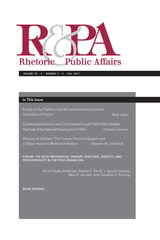 Rhetoric & Public Affairs 20, no. 3
Martin J. Medhurst
Michigan State University Press Journals, 2017
IN THIS ISSUE
Articles
Kelly Jakes, "Songs of Our Fathers: Gender and Nationhood at the Liberation of France"
Pamela Conners, "Constructing Economic and Civic Values through Public Policy Debate: The Case of the National Housing Act of 1934"
Stephen M. Underhill, "Prisoner of Context: The Truman Doctrine Speech and J. Edgar Hoover’s Rhetorical Realism"
Forum
Karrin Vasby Anderson, "Forum on the 2016 Presidential Primary: Rhetoric, Identity, and Presidentiality in the Post-Obama Era"
Robert E. Terrill, "The Post-Racial and Post-Ethical Discourse of Donald J. Trump"
J. David Cisneros, "Racial Presidentialities: Narratives of Latinxs in the 2016 Campaign"
Karrin Vasby Anderson, "Presidential Pioneer or Campaign Queen? Hillary Clinton and the First-Timer/Frontrunner Double Bind"
Mary E. Stuckey, "Dynasties and Democracy"
Jonathan P. Rossing, "No Joke: Silent Jesters and Comedic Refusals"
Book Reviews
Mari Lee Mifsud, Rhetoric and the Gift: Ancient Rhetorical Theory and Contemporary Communication, reviewed by Michele Kennerly
Han Baltussen and Peter J. Davis, The Art of Veiled Speech: Self-Censorship from Aristophanes to Hobbes, reviewed by Trevor C. Meyer
Greg Goodale, The Rhetorical Invention of Man: A History of Distinguishing Humans from Other Animals, reviewed by Mary Trachsel
Robert Hariman and Ralph Cintron, Culture, Catastrophe, and Rhetoric: The Texture of Political Action, reviewed by José G. Izaguirre, III
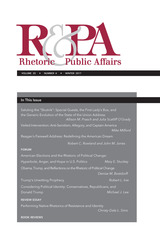 Rhetoric & Public Affairs 20, no. 4
Martin J. Medhurst
Michigan State University Press Journals, 2017 IN THIS ISSUE
Articles
Allison M. Prasch, Julia Scatliff O’Grady, "Saluting the 'Skutnik': Special Guests, the First Lady’s Box, and the Generic Evolution of the State of the Union Address"
Mike Milford, "Veiled Intervention: Anti-Semitism, Allegory, and Captain America"
Robert C. Rowland, John M. Jones, "Reagan’s Farewell Address: Redefining the American Dream"
Forum
Mary E. Stuckey, "American Elections and the Rhetoric of Political Change: Hyperbole, Anger, and Hope in U.S. Politics"
Denise M. Bostdorff, "Obama, Trump, and Reflections on the Rhetoric of Political Change"
Robert L. Ivie, "Trump’s Unwitting Prophecy"
Michael J. Lee, "Considering Political Identity: Conservatives, Republicans, and Donald Trump"
Review Essay
Christy-Dale L. Sims, "Performing Native Rhetorics of Resistance and Identity"
Book Reviews
Robert Danisch, Building a Social Democracy: The Promise of Rhetorical Pragmatism, reviewed by Craig Rood
Michael Warren Tumolo, Just Remembering: Rhetorics of Genocide Remembrance and Sociopolitical Judgment, reviewed by Bradley A. Serber
Darrel Wanzer-Serrano, The New York Young Lords and the Struggle for Liberation, reviewed by J. David Cisneros
Janice W. Fernheimer, Stepping into Zion: Hatzaad Harishon, Black Jews, and the Remaking of Jewish Identity, reviewed by Dana Anderson
Monte Harrell Hampton, Storm of Words: Science, Religion, and Evolution in the Civil War Era , reviewed by Thomas M. Lessl
 Rhetoric & Public Affairs 21, no. 1
Martin J. Medhurst
Michigan State University Press Journals, 2018 IN THIS ISSUE
Articles
Denise M. Bostdorff and Daniel J. O’Rourke, "Religion, Sport, and the Return of the Prodigal Son: The Postsecular Rhetoric of LeBron James’s 2014 'I’m Coming Home' Open Letter"
G. Mitchell Reyes, David P. Schulz, and Zoe Hovland, "When Memory and Sexuality Collide: The Homosentimental Style of Gay Liberation"
Adam J. Gaffey and Jennifer L. Jones Barbour, “'A Spirit That Can Never Be Told': Commemorative Agency and the Texas A&M University Bonfire Memorial"
Randall Fowler, “'Caliphate' against the Crown: Martyrdom, Heresy, and the Rhetoric of Enemyship in the Kingdom of Jordan"
Review Essay
Eric Scott Jenkins, "Materialism(s) in Recent Visual Rhetorical Histories: A Commentary"
Book Reviews
David Greenberg, Republic of Spin: An Inside History of the American Presidency, reviewed by Mary E. Stuckey
Jeffrey S. Ashley and Marla J. Jarmer, eds., The Bully Pulpit, Presidential Speeches, and the Shaping of Public Policy, reviewed by Justin Kirk
Barry Brummett, ed., Clockwork Rhetoric: The Language and Style of Steampunk, reviewed by Andrea J. Severson
Zeynep Gambetti and Marcial Gody-Anativia, eds., Rhetorics of Insecurity: Belonging and Violence in the Neoliberal Era, reviewed by Evan Beaumont Center
Gina L. Ercolini, Kant’s Philosophy of Communication, reviewed by Nathan Crick
Timothy Morton, Dark Ecology: For a Logic of Future Coexistence, reviewed by T. Jake Dionne
Anthony M. Wachs, The New Science of Communication: Reconsidering McLuhan’s Message for Our Modern Moment, reviewed by Corey Anton
Rebecca S. Richards, Transnational Feminist Rhetorics and Gendered Leadership in Global Politics: From Daughters of Destiny to Iron Ladies, reviewed by Tiara R. Na’puti
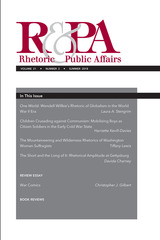 Rhetoric & Public Affairs 21, no. 2
Martin J. Medhurst
Michigan State University Press Journals, 2018 IN THIS ISSUE
Articles
Laura A. Stengrim, "One World: Wendell Willkie’s Rhetoric of Globalism in the World War II Era"
Harriette Kevill-Davies, "Children Crusading against Communism: Mobilizing Boys as Citizen Soldiers in the Early Cold War State"
Tiffany Lewis, "The Mountaineering and Wilderness Rhetorics of Washington Woman Suffragists"
Davida Charney, "The Short and the Long of It: Rhetorical Amplitude at Gettysburg"
Review Essay
Christopher J. Gilbert, "War Comics"
Book Reviews
Cara A. Finnegan, Making Photography Matter: A Viewer’s History from the Civil War to the Great Depression, reviewed by Ekaterina V. Haskins
J. Christian Spielvogel, Interpreting Sacred Ground: The Rhetoric of National Civil War Parks and Battlefields, reviewed by Michael Warren Tumolo
Robert Asen, Democracy, Deliberation, and Education, reviewed by Mark Hlavacik
S. Scott Graham, The Politics of Pain Medicine: A Rhetorical-Ontological Inquiry, reviewed by Lynda Walsh
Mary E. Stuckey, Political Rhetoric, reviewed by Jeffrey P. Mehltretter Drury
Robert E. Terrill, Double-Consciousness and the Rhetoric of Barack Obama: The Price and Promise of Citizenship, reviewed by David A. Frank
Stephen Howard Browne, The Ides of War: George Washington and the Newburgh Crisis, reviewed by Allison M. Prasch
Leroy G. Dorsey, Theodore Roosevelt, Conservation, and the 1908 Governor’s Conference, reviewed by Samuel Perry
James L. Kastely, The Rhetoric of Plato’s Republic: Democracy and the Philosophical Problem of Persuasion, reviewed by John J. Jasso
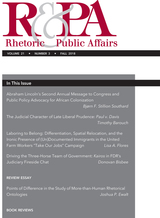 Rhetoric & Public Affairs 21, no. 3
Martin J. Medhurst
Michigan State University Press Journals, 2018 ARTICLES
Abraham Lincoln’s Second Annual Message to Congress and Public Policy Advocacy for African Colonization
BJØRN F. STILLION SOUTHARD
The Judicial Character of Late Liberal Prudence: Paul v. Davis
TIMOTHY BAROUCH
Laboring to Belong: Differentiation, Spatial Relocation, and the Ironic Presence of (Un)Documented Immigrants in the United Farm Workers “Take Our Jobs” Campaign
LISA A. FLORES
Driving the Three-Horse Team of Government: Kairos in FDR’s Judiciary Fireside Chat
DONOVAN BISBEE
REVIEW ESSAY
Points of Difference in the Study of More-than-Human Rhetorical Ontologies
JOSHUA P. EWALT
BOOK REVIEWS
Robert Hariman and John Louis Lucaites, The Public Image: Photography and Civic Spectatorship
LAURIE E. GRIES
Heather Ashley Hayes, Violent Subjects and Rhetorical Cartography in the Age of the Terror Wars
TIMOTHY BARNEY
E. Johanna Hartelius, ed., The Rhetorics of US Immigration: Identity, Community, Otherness
JENNIFER J. ASENAS AND KEVIN A. JOHNSON
Marouf A. Hasian Jr., Representing Ebola: Culture, Law, and Public Discourse about the 2013–2015 West African Ebola Outbreak
SKYE DE SAINT FELIX
Donna M. Kowal, Tongue of Fire: Emma Goldman, Public Womanhood, and the Sex Question
KATE ZITTLOW ROGNESS
Carol Mattingly, Secret Habits: Catholic Literacy Education for Women in the Early Nineteenth Century
SARA A. MEHLTRETTER DRURY
John Kyle Day, The Southern Manifesto: Massive Resistance and the Fight to Preserve Segregation
DAVIS W. HOUCK
Jane S. Sutton and Mari Lee Mifsud, eds., A Revolution in Tropes: Alloiostrophic Rhetoric
JAIME LANE WRIGHT
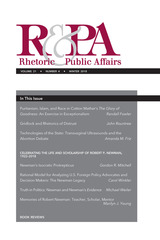 Rhetoric & Public Affairs 21, no. 4
Martin J. Medhurst
Michigan State University Press Journals, 2018 In This Issue
ARTICLES
Puritanism, Islam, and Race in Cotton Mather’s The Glory of Goodness: An Exercise in Exceptionalism
RANDALL FOWLER
Gridlock and Rhetorics of Distrust
JOHN ROUNTREE
Technologies of the State: Transvaginal Ultrasounds and the Abortion Debate
AMANDA M. FRIZ
CELEBRATING THE LIFE AND SCHOLARSHIP OF ROBERT P. NEWMAN, 1922–2018
Newman’s Isocratic Protrepticus
GORDON R. MITCHELL
Rational Model for Analyzing U.S. Foreign Policy Advocates and Decision Makers: The Newman Legacy
CAROL WINKLER
Truth in Politics: Newman and Newman’s Evidence
MICHAEL WEILER
Memories of Robert Newman: Teacher, Scholar, Mentor
MARILYN J. YOUNG
BOOK REVIEWS
Mark Hlavacik, Assigning Blame: The Rhetoric of Education Reform
STEPHEN SCHNEIDER
Richard D. Besel and Bernard K. Duffy, Green Voices: Defending Nature and the Environment in American Civic Discourse
JESSICA M. PRODY
Jefferson Walker, King Returns to Washington
JENNIFER BIEDENDORF
Shawn J. Parry-Giles and David S. Kaufer, Memories of Lincoln and the Splintering of American Political Thought
BARRY SCHWARTZ
Sara L. McKinnon, Robert Asen, Karma R. Chávez, and Robert Glenn Howard, Text + Field: Innovations in Rhetorical Method
HEATHER ASHLEY HAYES
Rasha Diab, Shades of Sulh: The Rhetoric of Arab-Islamic Reconciliation
ARABELLA LYON
Paul Baines and Nicholas O’Shaughnessy, Propaganda
ALLISON NIEBAUR AND BENJAMIN FIRGENS
Victor Klemperer and Martin Brady, The Language of the Third Reich: LTI, Lingua Tertii Imperii: A Philologist’s Notebook
JERRY BLITEFIELD
Richard Flower, Emperors and Bishops in Late Roman Invective
JORDAN LOVERIDGE
 Rhetoric & Public Affairs 22, no. 1
Martin J. Medhurst
Michigan State University Press Journals, 2019 In This Issue
Articles
Michael L. Butterworth, "George W. Bush as the 'Man in the Arena': Baseball, Public Memory, and the Rhetorical Redemption of a President"
Eric C. Miller and James E. Towns, “'The Protestant Contention': Religious Freedom, Respectability Politics, and W. A. Criswell in 1960"
Katie L. Garahan, "The Public Work of Identity Performance: Advocacy and Dissent in Teachers’ Open Letters"
Pamela Pietrucci and Leah Ceccarelli, "Scientist Citizens: Rhetoric and Responsibility in L’Aquila"
Review Essay
Jason Edward Black and Vernon Ray Harrison, "On Contemporary Contours of Public Memory"
Book Review
Candice Rai, Democracy’s Lot: Rhetoric, Publics, and the Places of Invention, reviewed by Bridie McGreavy
Elizabeth Benacka, Rhetoric, Humor, and the Public Sphere: From Socrates to Stephen Colbert, reviewed by Michael Phillips-Anderson
Michael Donnelly, Freedom of Speech and the Function of Rhetoric in the United States, reviewed by Matthew A. Ray
Cheryl Glenn and Andrea Lunsford, Landmark Essays on Rhetoric and Feminism, 1973–2000, reviewed by Rosalyn Collings Eves
Kathleen J. Ryan, Nancy Myers, and Rebecca Jones, Rethinking Ethos: A Feminist Ecological Approach to Rhetoric, reviewed by Brittany Knutson
Robin E. Jensen, Infertility: Tracing the History of a Transformative Term, reviewed by Tasha N. Dubriwny
Jiyeon Kang, Igniting the Internet: Youth and Activism in Postauthoritarian South Korea, reviewed by Damien Smith-Pfister
Rhetoric & Public Affairs 22, no. 4
Martin J. Medhurst
Michigan State University Press Journals, 2019 In This Issue
Martin J. Medhurst, "Editor’s Note"
Articles
Megan Fitzmaurice, "Recirculating Memories of the Presidents as Benevolent Slaveholders on Presidential Slavery Tours"
Ashley P. Ferrell, “'Righting Past Wrongs': Rhetorical Disidentification and Historical Reference in Response to Philadelphia’s Opioid Epidemic"
G. Mitchell Reyes, "Algorithms and Rhetorical Inquiry: The Case of the 2008 Financial Collapse"
Anne Demo, "Documenting Death by Policy: Public Grievability, Migrant Lives, and Commonplace Denials"
Celebrating the Life and Scholarship of Robert L. Scott, 1928–2018
Karlyn Kohrs Campbell, "Robert L. Scott"
Robert Hariman, "Tribute to Robert L. Scott"
Barry Brummett, "Scott’s Body"
Martin J. Medhurst, "Robert L. Scott: Memories of a Great Man"
 Rhetoric & Public Affairs 23, no. 1
Martin J. Medhurst
Michigan State University Press Journals, 2020 In This Issue
Cheryl R. Jorgensen-Earp and Darwin D. Jorgensen, "'To Fly Under Borrowed Colours': Insulin Discovery Accounts, Scientific Credit, and the Nobel Prize"
Dominic J. Manthey, "A Vision of Violence in General Orders No. 100"
John M. Murphy, "The Sunshine of Human Rights: Hubert Humphrey at the 1948 Democratic Convention"
Denise M. Bostdorff and Steven R. Goldzwig, "Barack Obama’s Eulogy for the Reverend Clementa Pinckney, June 26, 2015: Grace as the Vehicle for Collective Salvation and Obama’s Agency on Civil Rights"
Mattilyn Egli, "Index to Rhetoric & Public Affairs: Volume 16 (2013)—Volume 22 (2019)"
Book Reviews
Helene A. Shugart, Heavy: The Obesity Crisis in Cultural Context, reviewed by Casey Ryan Kelly
Jeff Rice, Craft Obsession: The Social Rhetorics of Beer, reviewed by Antonio Ceraso
Melissa A. Goldthwaite, Food, Feminisms, Rhetorics, reviewed by Talya Peri Slaw
Christa Teston, Bodies in Flux: Scientific Methods for Negotiating Medical Uncertainty, reviewed by Rachel Bloom-Pojar
Christopher Densmore, Carol Faulkner, Nancy Hewitt, and Beverly Wilson Palmer, Lucretia Mott Speaks: The Essential Speeches and Sermons, reviewed by Jane Donawerth and Emily Smith
Tom F. Wright, Lecturing the Atlantic: Speech, Print, and an Anglo-American Commons, 1830–1870, reviewed by Carly S. Woods
Mark Ward Sr., The Lord’s Radio: Gospel Music Broadcasting and the Making of Evangelical Culture, 1920–1960, reviewed by Gregory Perreault
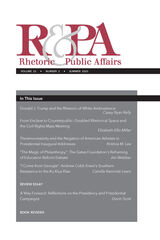 Rhetoric & Public Affairs 23, no. 2
Martin J. Medhurst
Michigan State University Press Journals, 2020 In This Issue
Articles
Casey Ryan Kelly, "Donald J. Trump and the Rhetoric of White Ambivalence"
Elizabeth Ellis Miller, "From Enclave to Counterpublic: Doubled Rhetorical Space and the Civil Rights Mass Meeting"
Kristina M. Lee, "Theistnormativity and the Negation of American Atheists in Presidential Inaugural Addresses"
Jim Webber, "'The Magic of Philanthropy': The Gates Foundation’s Reframing of Education Reform Debate"
Camille Kaminski Lewis, "'I Come from Georgia': Andrew Cobb Erwin’s Southern Resistance to the Ku Klux Klan"
Review Essay
Devin Scott, "A Way Forward: Reflections on the Presidency and Presidential Campaigns"
Book Reviews
Lars Burman, Eloquent Students: Rhetorical Practices at the Uppsala Student Nations 1663–2010, reviewed by Cory Geraths
Elizabeth Mazzolini, Everest Effect: Nature, Culture, Ideology, reviewed by Chelsea Graham
Jen Schneider, Steve Schwarze, Peter K. Bsumek, and Jennifer Peeples, Under Pressure: Coal Industry Rhetoric and Neoliberalism, reviewed by Sean Kennedy
Robert Terrill, Reconsidering Obama: Reflections on Rhetoric, reviewed by Jessica Boykin and Keith D. Miller
Steven Mailloux, Rhetoric’s Pragmatism: Essays in Rhetorical Hermeneutics, reviewed by Robert Danisch
M. Elizabeth Weiser, Museum Rhetoric: Building Civic Identity in National Spaces, reviewed by Patricia G. Davis
Leland G. Spencer, Women Bishops and Rhetorics of Shalom: A Whole Peace, reviewed by Rasha Diab
Judi Atkins and John Gaffney, Voices of the UK Left: Rhetoric, Ideology and the Performance of Politics, reviewed by Elizabeth R. Earle
Bryan J. McCann, The Mark of Criminality: Rhetoric, Race, and Gangsta Rap in the War-on-Crime Era, reviewed by Suzanne Marie Enck
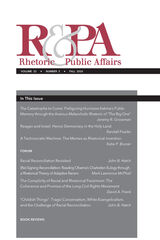 Rhetoric & Public Affairs 23, no. 3
Martin J. Medhurst
Michigan State University Press Journals, 2020 In This Issue
Articles
Jeremy R. Grossman, "The Catastrophe to Come: Prefiguring Hurricane Katrina’s Public Memory through the Anxious Melancholic Rhetoric of 'The Big One'"
Randall Fowler, "Reagan and Israel: Heroic Democracy in the Holy Land"
Katie P. Bruner, "A Technocratic Machine: The Memex as Rhetorical Invention"
Forum
John B. Hatch, "Racial Reconciliation Revisited"
Mark Lawrence McPhail, "(Re)-Signing Reconciliation: Reading Obama’s Charleston Eulogy through a Rhetorical Theory of Adaptive Racism"
David A. Frank, "The Complicity of Racial and Rhetorical Pessimism: The Coherence and Promise of the Long Civil Rights Movement"
John B. Hatch, "'Childish Things': Tragic Conservatism, White Evangelicalism, and the Challenge of Racial Reconciliation"
Book Reviews
Philip Arrington Eugene, Eloquence Divine: In Search of God’s Rhetoric, reviewed by William T. FitzGerald
Daniel M. Gross, Uncomfortable Situations: Emotion Between Science and the Humanities, reviewed by Kyle Jensen
Stephen J. Hartnett, Lisa B. Keränen, and Donovan Conley, Imagining China: Rhetorics of Nationalism in an Age of Globalization, reviewed by Dongjing Kang
Robin Reames, Logos Without Rhetoric: Arts of Language before Plato, reviewed by Wilfred E. Major
Nathan Crick, The Keys of Power: The Rhetoric and Politics of Transcendentalism, reviewed by Sean Ross Meehan
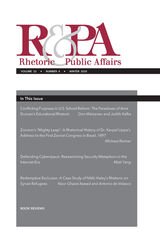 Rhetoric & Public Affairs 23, no. 4
Martin J. Medhurst
Michigan State University Press Journals, 2020 In This Issue
Introduction
Mary E. Stuckey, "From the Interim Editor"
Articles
Don Waisanen and Judith Kafka, "Conflicting Purposes in U.S. School Reform: The Paradoxes of Arne Duncan’s Educational Rhetoric"
Michael Reimer, "Zionism’s 'Mighty Leap': A Rhetorical History of Dr. Karpel Lippe’s Address to the First Zionist Congress in Basel, 1897"
Misti Yang, "Defending Cyberspace: Reexamining Security Metaphors in the Internet Era"
Noor Ghazal Aswad and Antonio de Velasco, "Redemptive Exclusion: A Case Study of Nikki Haley’s Rhetoric on Syrian Refugees"
Book Reviews
Richard J. Jensen, Social Controversy and Public Address in the 1960s and Early 1970s: A Rhetorical History of the United States. Significant Moments in American Public Discourse, reviewed by John M. Murphy
James Wynn Tuscaloosa, Citizen Science in the Digital Age: Rhetoric, Science, and Public Engagement, reviewed by Karen Schroeder Sorensen
Melanie Loehwing, Homeless Advocacy and the Rhetorical Construction of the Civic Home, reviewed by Jay P. Childers
Siva Vaidhyanathan, Antisocial Media: How Facebook Disconnects Us and Undermines Democracy, reviewed by Adam J. Gaffey
Michele Kennerly and Damien Smith Pfister, Ancient Rhetorics and Digital Networks, reviewed by Chris Ingraham
Bridie McGreavy, Justine Wells, George F. McHendry Jr., and Samantha Senda-Cook, Tracing Rhetoric and Material Life: Ecological Approaches, reviewed by Jason Ludden
Angela G. Ray and Paul Stob, Thinking Together: Lecturing, Learning, & Difference in the Long Nineteenth Century, reviewed by Laura L. Mielke
Mary E. Stuckey, Political Vocabularies: FDR, the Clergy Letters, and the Elements of Political Argument, reviewed by Anne C. Pluta
Jeremy David Engels, The Art of Gratitude, reviewed by Nathan Stormer
Randall Fowler, More than a Doctrine: The Eisenhower Era in the Middle East, reviewed by Chris Tudda
Craig Rood, After Gun Violence: Deliberation and Memory in an Age of Political Gridlock, reviewed by Christopher M. Duerringer
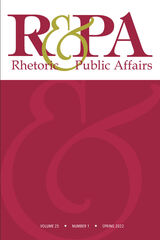 Rhetoric & Public Affairs 25, no. 1
Catherine L. Langford
Michigan State University Press Journals, 2022 In This Issue
Articles
“Guided by Ghosts of the Post-Civil War Era”: Felon Disenfranchisement and the Limits of Race Liberal Advocacy
Chris S. Earle
Monkey Business in a Kangaroo Court: Reimagining Naruto v. Slater as a Litigious Event
S. Marek Muller
“Imitation (In)Security” and the Polysemy of Russian Disinformation: A Case Study in How IRA Trolls Targeted U.S. Military Veterans
Hamilton Bean, Stephen J. Hartnett, Farnoush Banaei-Kashani, Haadi Jafarian, and Alex Koutsoukos
They Spoke in Defense of Roy Moore: Networked Apologia and Media Ecosystems
Jacob Justice and Brett Bricker
Book Reviews
Roger C. Aden, ed., Rhetorics Haunting the National Mall: Displaced and Ephemeral Public Memories
Reviewed by Daniel M. Chick
John Oddo, The Discourse of Propaganda: Case Studies from the Persian Gulf War and the War on Terror
Reviewed by Yishan Wang
Kristen Hoerl, The Bad Sixties: Hollywood Memories of the Counterculture, Antiwar, and Black Power Movements
Reviewed by David P. Schulz
Gary A. Remer, Ethics and the Orator: The Ciceronian Tradition of Political Morality
Reviewed by Robert W. Cape, Jr.
Amos Kiewe, Andrew Jackson: A Rhetorical Portrayal of Presidential Leadership
Reviewed by Jacob Justice
Rhetoric & Public Affairs 25, no. 2
Catherine L. Langford
Michigan State University Press Journals, 2022 In This Issue
Articles
The White Power of White Space: Rhetorical Collusion and Discriminatory Design in the Obama-Trump Inauguration Photo
Lee M. Pierce
Protection Narratives and the Problem of Gun Suicide
Craig Rood
Reckoning with Tlatelolco: Arturo Rosenblueth and a Cybernetic Rhetoric
José G. Izaguirre III
The Rhetoric of Narcissism: Trump’s Tweets on Writing
William J. Berg
Book Reviews
Cara A. Finnegan, Photographic Presidents: Making History from Daguerreotype to Digital
Kendall R. Phillips
Catalina M. de Onís, Energy Islands: Metaphors of Power, Extractivism, and Justice in Puerto Rico
Nicolas Hernandez and Danielle Endres
Alan G. Gross, The Scientific Sublime: Popular Science Unravels the Mysteries of the Universe
Andrew C. Hansen
Laura L. Mielke, Provocative Eloquence: Theater, Violence, and Antislavery Speech in the Antebellum United States
Angela G. Ray
 Rhetoric & Public Affairs 25, no. 3
Catherine L. Langford
Michigan State University Press Journals, 2022 Special Issue: The Rhetoric of Violence
Guest Editor, Jay P. Childers
Articles
The Rhetoric of Physical Violence
Jay P. Childers
Revisioning Rhetorical Violence in the Afterlife
Matthew Houdek and Lisa A. Flores
Serial Murder as Modernist Ritual
Bryan McCann
Plátano’s Pharmacy: The Republic’s Taste of its Own Medicine
José Ángel Maldonado
Mapping Inter/National Terrain: On Violence, Definition, and Struggle from Afghanistan to Standing Rock
Heather Ashley Hayes
Inconvenient Horror: Violence as Rhetoric and the El Paso Shooting
Richard Pineda
Violence and Nonviolence in the Rhetoric of Social Protest
Billie Murray
Review Essay
Freedom As and Against Democracy
Eric C. Miller
Book Reviews
James Wynn and G. Mitchell Reyes, editors, Arguing with Numbers: The Intersection of Rhetoric and Mathematics
Reviewed by Christopher Tindale
Stephen M. Monroe, Heritage and Hate: Old South Rhetoric at Southern Universities
Reviewed by Eryn Johnson and Jesse Crombie
Lisa A. Flores, Deportable and Disposable: Public Rhetoric and the Making of the “Illegal” Immigrant
Reviewed by Jimmy Lizama
Rhetoric & Public Affairs 25, no. 4
Catherine L. Langford
Michigan State University Press Journals, 2022 In This Issue
Articles
Color Blind: Political Realism, Epistemic Racism, And Rhetorical Salience
Robert Hariman and Francis A. Beer
Outfitting the Conservative Civil Rights Movement: Rehearsed White Victimhood and the MAGA Hat
Meredith Neville-Shepard and Ryan Neville-Shepard
Sensory Engagement with the Rhetoric of Science: Creationist Copia at the Discovery Center for Science and Earth History
Emma Frances Bloomfield
Activating Transnational Advocacy Networks: Ida B. Wells and Mainstreaming Antilynching
Anna Miriam Dudney Deeb
Book Reviews
Pamela VanHaitsma, Queering Romantic Engagement in the Postal Age: A Rhetorical Education
Mary Anne Taylor
Paul Stob, Intellectual Populism: Democracy, Inquiry, and the People
Erin Keoppen
Christopher J. Gilbert, Caricature and National Character: The United States at War
Matthew Meier
Rhetoric & Public Affairs 26, no. 1
Catherine L. Langford
Michigan State University Press Journals, 2023 Articles
Recasting the Villain in the Communitarian American Dream: Obama in Osawatomie and the 2012 Election
Robert C. Rowland
Designing “The People”: Constitutive Fractures in Contemporary Collectives
Daniel J. DeVinney
Standing Down, Standing Together: Coalition-Building at Standing Rock
Lisa Silvestri
Replacing Notorious: Barret, Ginsburg, and Postfeminist Positioning
Calvin R. Coker
Book Reviews
James E. Caron, Satire as the Comic Public Sphere: Postmodern “Truthiness” and Civic Engagement
Anna M. Young
Mel Laracey, Informing a Nation: The Newspaper Presidency of Thomas Jefferson
Brandon M. Johnson
Lynée Lewis Gaillet and Helen Gaillet Bailey, editors, Remembering Women Differently: Refiguring Rhetorical Work
Carly S. Woods
Catherine Chaput, Market Affect and the Rhetoric of Political Economic Debates
Divine N. Aboagye
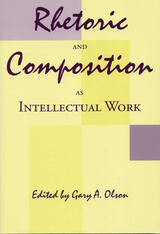 Rhetoric and Composition as Intellectual Work
Edited by Gary A. Olson
Southern Illinois University Press, 2002 In response to those who insist that rhetoric and composition should remain only a service discipline, editor Gary A. Olson’s Rhetoric and Composition as Intellectual Work demonstrates that it already is an intellectual discipline, that for at least a quarter of a century the field has developed an impressive tradition of intellectual work in a remarkable assortment of subject areas. Rhetoric and Composition as Intellectual Work suggests the diversity of intellectual projects that have and will continue to make rhetoric and composition more than a service to the university, more than a field devoted solely to improving writing pedagogy, and more than a preliminary to literary studies. This collection of nineteen essays by some of the most distinguished scholars in the discipline illustrates that rhetoric and composition has much to contribute to the intellectual milieu of the contemporary university, as the field continues to push its disciplinary borders and discover new sites of investigation.
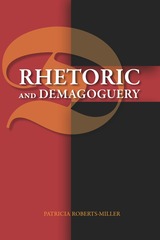 Rhetoric and Demagoguery
Patricia Roberts-Miller
Southern Illinois University Press, 2019 One of Library Journal's Top 20 Best-Selling Language Titles of 2019
In a culture of profit-driven media, demagoguery is a savvy short-term rhetorical strategy. Once it becomes the norm, individuals are more likely to employ it and, in that way, increase its power by making it seem the only way of disagreeing with or about others. When that happens, arguments about policy are replaced by arguments about identity—and criticism is met with accusations that the critic has the wrong identity (weak, treacherous, membership in an out-group) or the wrong feelings (uncaring, heartless).
Patricia Roberts-Miller proposes a definition of demagoguery based on her study of groups and cultures that have talked themselves into disastrously bad decisions. She argues for seeing demagoguery as a way for people to participate in public discourse, and not necessarily as populist or heavily emotional. Demagoguery, she contends, depoliticizes political argument by making all issues into questions of identity. She broaches complicated questions about its effectiveness at persuasion, proposes a new set of criteria, and shows how demagoguery plays out in regard to individuals not conventionally seen as demagogues.
Roberts-Miller looks at the discursive similarities among the Holocaust in early twentieth-century Germany, the justification of slavery in the antebellum South, the internment of Japanese Americans in the United States during World War II, and the U.S.-led invasion of Iraq in 2003, among others. She examines demagoguery among powerful politicians and jurists (Earl Warren, chief justice of the U.S. Supreme Court) as well as more conventional populists (Theodore Bilbo, two-time governor of Mississippi; E. S. Cox, cofounder of the Anglo-Saxon Clubs of America). She also looks at notorious demagogues (Athenian rhetor Cleon, Ann Coulter) and lesser-known public figures (William Hak-Shing Tam, Gene Simmons).
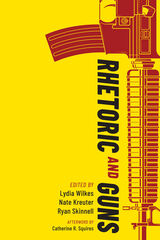 Rhetoric and Guns
Lydia Wilkes
Utah State University Press, 2021 Guns hold a complex place in American culture. Over 30,000 Americans die each year from gun violence, and guns are intimately connected to issues of public health, as is evident whenever a mass shooting occurs. But guns also play an important role in many Americans’ lives that is not reducible to violence and death—as tools, sporting equipment, and identity markers. They are also central to debates about constitutional rights, as seen in ongoing discussions about the Second Amendment, and they are a continuous source of legislative concern, as apparent in annual ratings of gun-supporting legislators. Even as guns are wrapped up with other crucial areas of concern, they are also fundamentally a rhetorical concern. Guns and gun violence occupy a unique rhetorical space in the United States, one characterized by silent majorities, like most gun owners; vocal minorities, like the firearm industry and gun lobby; and a stalemate that fails to stem the flood of the dead. How Americans talk, deliberate, and fight about guns is vital to how guns are marketed, used, and regulated. A better understanding of the rhetorics of guns and gun violence can help Americans make better arguments about them in the world. However, where guns are concerned, rhetorical studies is not terribly different from American culture more generally. Guns are ever-present and exercise powerful effects, but they are commonly talked about in oblique, unsystematic ways. Rhetoric and Guns advances more direct, systematic engagement in the field and beyond by analyzing rhetoric about guns, guns in rhetoric, and guns as rhetoric, particularly as they relate to specific instances of guns in culture. The authors attempt to understand rhetoric’s relationship to guns by analyzing rhetoric about guns and how they function in and as rhetoric related to specific instances—in media coverage, political speech, marketing, and advertising. Original chapters from scholars in rhetorical studies, communication, education, and related fields elucidate how rhetoric is used to maintain and challenge the deadly status quo of gun violence in the United States and extend rhetoricians’ sustained interest in the fields’ relationships to violence, brutality, and atrocity. Contributors: Ira J. Allen, Brian Ballentine, Matthew Boedy, Peter Buck, Lisa Corrigan, Rosa Eberly, Kendall Gerdes, Ian E. J. Hill, Nathalie Kuriowa-Lewis, Patricia Roberts-Miller, Craig Rood, Bradley Serber, Catherine R. Squires, Scott Gage
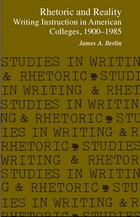 Rhetoric and Reality: Writing Instruction in American Colleges, 1900 - 1985
James A. Berlin
Southern Illinois University Press, 1987 Berlin here continues his unique history of American college composition begun in his Writing Instruction in Nineteenth-Century Colleges (1984), turning now to the twentieth century. In discussing the variety of rhetorics that have been used in writing classrooms Berlin introduces a taxonomy made up of three categories: objective rhetorics, subjective rhetorics, and transactional rhetorics, which are distinguished by the epistemology on which each is based. He makes clear that these categories are not tied to a chronology but instead are to be found in the English department in one form or another during each decade of the century. His historical treatment includes an examination of the formation of the English department, the founding of the NCTE and its role in writing instruction, the training of teachers of writing, the effects of progressive education on writing instruction, the General Education Movement, the appearance of the CCCC, the impact of Sputnik, and today’s “literacy crisis.”
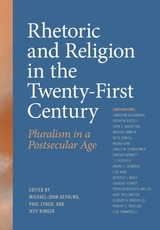 Rhetoric and Religion in the Twenty-First Century: Pluralism in a Postsecular Age
Edited by Michael-John DePalma, Paul Lynch, and Jeff Ringer
Southern Illinois University Press, 2023 Expanding the scope of religious rhetoric
Over the past twenty-five years, the intersection of rhetoric and religion has become one of the most dynamic areas of inquiry in rhetoric and writing studies. One of few volumes to include multiple traditions in one conversation, Rhetoric and Religion in the Twenty-First Century engages with religious discourses and issues that continue to shape public life in the United States.
This collection of essays centralizes the study of religious persuasion and pluralism, considers religion’s place in U.S. society, and expands the study of rhetoric and religion in generative ways. The volume showcases a wide range of religious traditions and challenges the very concepts of rhetoric and religion. The book’s eight essays explore African American, Buddhist, Christian, Indigenous, Islamic, and Jewish rhetoric and discuss the intersection of religion with feminism, race, and queer rhetoric—along with offering reflections on how to approach religious traditions through research and teaching. In addition, the volume includes seven short interludes in which some of the field’s most accomplished scholars recount their experiences exploring religious rhetorics and invite readers to engage these exigent lines of inquiry.
By featuring these diverse religious perspectives, Rhetoric and Religion in the Twenty-First Century complicates the field’s emphasis on Western, Hellenistic, and Christian ideologies. The collection also offers teachers of writing and rhetoric a range of valuable approaches for preparing today’s students for public citizenship in our religiously diverse global context.
 Rhetoric and Resistance: The Literary Arts of Dissent in Nineteenth-Century Britain
Maeve Adams
Ohio University Press, 2025 A fresh perspective on the enduring relationship between literature, democracy, and dissent Rhetoric and Resistance explores the transformative role of nineteenth-century literature in shaping modern concepts and practices of democratic dissent. By examining the works of Romantic and Victorian novelists, poets, and journalists, Maeve Adams identifies origins of modern theories and practices of resistance in nineteenth-century literary forms. Offering a literary history of dissent, the book recovers the intertwined development of democracy and aesthetics, revealing how narrative form became a potent tool for challenging authority. Tracing the lineage of dissent from the radical fiction and journalism of the 1800s to contemporary movements like #MeToo, Adams offers a genealogy that highlights how literary texts experimented with political power, granting new and consequential voices to working-class individuals, women, colonized peoples, and other marginalized groups. Adams takes an interdisciplinary approach, weaving together close readings of works by Thomas De Quincey, Walter Scott, Elizabeth Gaskell, and H. G. Wells, as well as lesser-known journalists, with insights from modern moral and political philosophy. Drawing on theories of democratic ethics and justice from scholars such as Miranda Fricker, Sharon Krause, Martha Nussbaum, and Philip Pettit, the book bridges literary history and contemporary debates about political agency and expression.
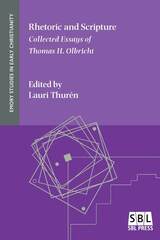 Rhetoric and Scripture: Collected Essays of Thomas H. Olbricht
Thomas H. Olbricht
SBL Press, 2021 This book offers a unique overview of the development of rhetorical criticism both in North America and internationally through the work of pioneering New Testament scholar Thomas H. Olbricht. Lauri Thurén has gathered nineteen of Olbricht's essays as a guidebook to rhetorical criticism for students, clergy, and scholars. The range of essays from throughout Olbricht's career illuminate the history of rhetorical criticism and reflect the different motivations of ancient and contemporary rhetorical approaches. Essays focus on the history of biblical rhetorical analysis, the rhetorical analysis of biblical texts, the characteristics of rhetorical analysis, and types of biblical rhetorical criticism. A foreword by Thurén and a memorial essay by Carl R. Holladay contextualize Olbricht's work. Anyone interested in the rhetorical study of the New Testament will find this volume inspiring and informative.
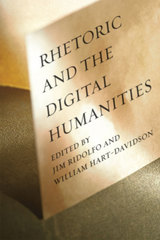 Rhetoric and the Digital Humanities
Edited by Jim Ridolfo and William Hart-Davidson
University of Chicago Press, 2015 The digital humanities is a rapidly growing field that is transforming humanities research through digital tools and resources. Researchers can now quickly trace every one of Issac Newton’s annotations, use social media to engage academic and public audiences in the interpretation of cultural texts, and visualize travel via ox cart in third-century Rome or camel caravan in ancient Egypt. Rhetorical scholars are leading the revolution by fully utilizing the digital toolbox, finding themselves at the nexus of digital innovation.
Rhetoric and the Digital Humanities is a timely, multidisciplinary collection that is the first to bridge scholarship in rhetorical studies and the digital humanities. It offers much-needed guidance on how the theories and methodologies of rhetorical studies can enhance all work in digital humanities, and vice versa. Twenty-three essays over three sections delve into connections, research methodology, and future directions in this field. Jim Ridolfo and William Hart-Davidson have assembled a broad group of more than thirty accomplished scholars. Read together, these essays represent the cutting edge of research, offering guidance that will energize and inspire future collaborations.
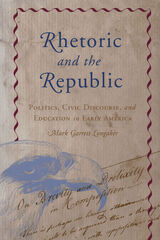 Rhetoric and the Republic: Politics, Civic Discourse, and Education in Early America
Mark Garrett Longaker
University of Alabama Press, 2007 Casts a revealing light on modern cultural conflicts through the lens of rhetorical education.
Contemporary efforts to revitalize the civic mission of higher education in America have revived an age-old republican tradition of teaching students to be responsible citizens, particularly through the study of rhetoric, composition, and oratory. This book examines the political, cultural, economic, and religious agendas that drove the various—and often conflicting—curricula and contrasting visions of what good citizenship entails. Mark Garrett Longaker argues that higher education more than 200 years ago allowed actors with differing political and economic interests to wrestle over the fate of American citizenship. Then, as today, there was widespread agreement that civic training was essential in higher education, but there were also sharp differences in the various visions of what proper republic citizenship entailed and how to prepare for it.
Longaker studies in detail the specific trends in rhetorical education offered at various early institutions—such as Yale, Columbia, Pennsylvania, and William and Mary—with analyses of student lecture notes, classroom activities, disputation exercises, reading lists, lecture outlines, and literary society records. These documents reveal an extraordinary range of economic and philosophical interests and allegiances—agrarian, commercial, spiritual, communal, and belletristic—specific to each institution. The findings challenge and complicate a widely held belief that early-American civic education occurred in a halcyon era of united democratic republicanism. Recognition that there are multiple ways to practice democratic citizenship and to enact democratic discourse, historically as well as today, best serves the goal of civic education, Longaker argues.
Rhetoric and the Republic illuminates an important historical moment in the history of American education and dramatically highlights rhetorical education as a key site in the construction of democracy.
Rhetoric and Writing Studies in the New Century: Historiography, Pedagogy, and Politics
Edited by Cheryl Glenn and Roxanne Mountford
Southern Illinois University Press, 2017 This collection of essays investigates the historiography of rhetoric, global perspectives on rhetoric, and the teaching of writing and rhetoric, offering diverse viewpoints. Addressing four major areas of research in rhetoric and writing studies, contributors consider authorship and audience, discuss the context and material conditions in which students compose, cover the politics of the field and the value of a rhetorical education, and reflect on contemporary trends in canon diversification. Providing both retrospective and prospective assessments, Rhetoric and Writing Studies in the New Century offers original research by important figures in the field.
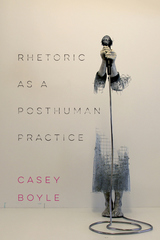 Rhetoric as a Posthuman Practice
Casey Boyle
Ohio State University Press, 2018 In response to the pervasiveness of emerging communication technologies, Rhetoric as a Posthuman Practice argues that information be understood as an embodied, material practice. The guiding proposition for this book is that digital rhetoric now concerns how bodies, broadly construed, become informed through practice that includes not only traditional communication activities between bodies but also how information technologies organize and exercise those varying bodies.
Through case studies of the media art of glitch, urban explorers’ use of social media, and DIY digital networks, this book then reconsiders how practice/exercise functions when the once essential bodies of the individual and a society—the two primary categories authorized by a humanist paradigm—become less reliable categories from which we might orient rhetorical action. In sum, the book argues that rhetorical practice is irreducible to the traditions and categories of humanism and must now exercise its posthuman capacities.
Rhetoric as Philosophy: The Humanist Tradition
Ernesto Grassi. Foreword by Timothy W. Crusius
Southern Illinois University Press, 2001 Originally published in English in 1980, Rhetoric as Philosophy has been out of print for some time. The reviews of that English edition attest to the importance of Ernesto Grassi’s work. By going back to the Italian humanist tradition and aspects of earlier Greek and Latin thought, Ernesto Grassi develops a conception of rhetoric as the basis of philosophy. Grassi explores the sense in which the first principles of rational thought come from the metaphorical power of the word. He finds the basis for his conception in the last great thinker of the Italian humanist tradition, Giambattista Vico (1668–1744). He concentrates on Vico’s understanding of imagination and the sense of human ingenuity contained in metaphor. For Grassi, rhetorical activity is the essence and inner life of thought when connected to the metaphorical power of the word.
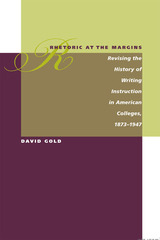 Rhetoric at the Margins: Revising the History of Writing Instruction in American Colleges, 1873-1947
David Gold
Southern Illinois University Press, 2008 Rhetoric at the Margins: Revising the History of Writing Instruction in American Colleges, 1873-1947 examines the rhetorical education of African American, female, and working-class college students in the late nineteenth and early twentieth centuries. The rich case studies in this work encourage a reconceptualization of both the history of rhetoric and composition and the ways we make use of it. Author David Gold uses archival materials to study three types of institutions historically underrepresented in disciplinary histories: a black liberal arts college in rural East Texas (Wiley College); a public women's college (Texas Woman's University); and an independent teacher training school (East Texas Normal College). The case studies complement and challenge previous disciplinary histories and suggest that the epistemological schema that have long applied to pedagogical practices may actually limit our understanding of those practices. Gold argues that each of these schools championed intellectual and pedagogical traditions that differed from the Eastern liberal arts model—a model that often serves as the standard bearer for rhetorical education. He demonstrates that by emphasizing community uplift and civic participation and attending to local needs, these schools created contexts in which otherwise moribund curricular features of the era—such as strict classroom discipline and an emphasis on prescription—took on new possibilities. Rhetoric at the Margins describes the recent revisionist turn in rhetoric and composition historiography, argues for the importance of diverse institutional microhistories, and argues that the nineteenth and early twentieth centuries offer rich lessons for contemporary classroom practice. The study brings alive the voices of black, female, rural, Southern, and first-generation college students and their instructors, effectively linking these histories to the history of rhetoric and writing. Appendices include excerpts of important and rarely seen primary source material, allowing readers to experience in fuller detail the voices captured in this work.
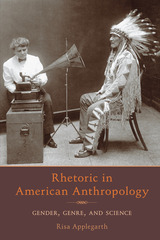 Rhetoric in American Anthropology: Gender, Genre, and Science
Applegarth
University of Pittsburgh Press, 2014 In the early twentieth century, the field of anthropology transformed itself from the “welcoming science,” uniquely open to women, people of color, and amateurs, into a professional science of culture. The new field grew in rigor and prestige but excluded practitioners and methods that no longer fit a narrow standard of scientific legitimacy. In Rhetoric in American Anthropology, Risa Applegarth traces the “rhetorical archeology” of this transformation in the writings of early women anthropologists. Applegarth examines the crucial role of ethnographic genres in determining scientific status and recovers the work of marginalized anthropologists who developed alternative forms of scientific writing.
Applegarth analyzes scores of ethnographic monographs to demonstrate how early anthropologists intensified the constraints of genre to define their community and limit the aims and methods of their science. But in the 1920s and 1930s, professional researchers sidelined by the academy persisted in challenging the field’s boundaries, developing unique rhetorical practices and experimenting with alternative genres that in turn greatly expanded the epistemology of the field. Applegarth demonstrates how these writers’ folklore collections, ethnographic novels, and autobiographies of fieldwork experiences reopened debates over how scientific knowledge was made: through what human relationships, by what bodies, and for what ends. Linking early anthropologists’ ethnographic strategies to contemporary theories of rhetoric and composition, Rhetoric in American Anthropology provides a fascinating account of the emergence of a new discipline and reveals powerful intersections among gender, genre, and science.
Rhetoric in Antiquity
Laurent Pernot
Catholic University of America Press, 2005 Originally published as La Rhétorique dans l'Antiquité (2000), this new English edition provides students with a valuable introduction to understanding the classical art of rhetoric and its place in ancient society and politics
Rhetoric in European Culture and Beyond
Jirí Kraus
Karolinum Press, 2014 Rhetoric in European and World Culture traces the position of rhetoric in cultural and educational systems from ancient times to the present. Here, Jirí Kraus examines rhetoric’s decline in importance in a period of rationalism and enlightenment, presents the causes of negative connotations of rhetoric, and explains why rhetoric in the twentieth century regained its prestige.
Kraus demonstrates that the reputation of rhetoric falls when it is reduced to a refined method for deceiving the public and increases when it is seen as a scientific discipline that is used throughout all of the fields of the humanities. In this sense, the author argues, rhetoric strives for universal recognition and the cultivation of rhetorical expression, spoken and written, including not only its production but also reception and interpretation.
Rhetoric in the European Tradition
Thomas M. Conley
University of Chicago Press, 1993 Rhetoric in the European Tradition provides a comprehensive, chronological survey of the basic models of rhetoric as they developed from the early Greeks through the twentieth century. Discussing rhetorical theories and practices in the context of the times of political and intellectual crisis that gave rise to them, Thomas M. Conley chooses carefully from a vast pool of rhetorical literature to give voice to those authors who exercised the greatest influence in their own and succeeding generations. This book is valuable as both an introduction for students and a reference and resource for scholars in fields including literature, cultural history, philosophy, and speech and communication studies.
 Rhetoric in Tooth and Claw: Animals, Language, Sensation
Debra Hawhee
University of Chicago Press, 2017 We tend to think of rhetoric as a solely human art. After all, only humans can use language artfully to make a point, the very definition of rhetoric.
Yet when you look at ancient and early modern treatises on rhetoric, what you find is surprising: they’re crawling with animals. With Rhetoric in Tooth and Claw, Debra Hawhee explores this unexpected aspect of early thinking about rhetoric, going on from there to examine the enduring presence of nonhuman animals in rhetorical theory and education. In doing so, she not only offers a counter-history of rhetoric but also brings rhetorical studies into dialogue with animal studies, one of the most vibrant areas of interest in humanities today. By removing humanity and human reason from the center of our study of argument, Hawhee frees up space to study and emphasize other crucial components of communication, like energy, bodies, and sensation.
Drawing on thinkers from Aristotle to Erasmus, Rhetoric in Tooth and Claw tells a new story of the discipline’s history and development, one animated by the energy, force, liveliness, and diversity of our relationships with our “partners in feeling,” other animals.
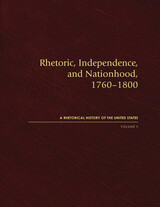 Rhetoric, Independence, and Nationhood, 1760–1800, Volume II
Stephen E Lucas
Michigan State University Press, 2022 Few periods of American history have been studied more extensively or debated more intensely than the last four decades of the eighteenth century, during which the thirteen colonies declared their independence from Great Britain, won their independence on the battlefield, created the United States Constitution, and implemented a new national government. Scholars have approached these developments from a variety of perspectives—economic, social, political, religious, legal, and diplomatic, to name a few. This volume adopts a rhetorical perspective, which foregrounds the art of effective expression as a means of influencing political perceptions, values, and behaviors. It presents eleven essays by an interdisciplinary group of scholars who bring to bear a variety of methods, backgrounds, perspectives, and specializations. The essays illuminate key rhetors, works, controversies, and moments that helped shape American discourse and politics during the years 1760–1800.
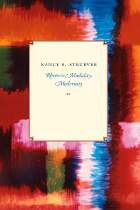 Rhetoric, Modality, Modernity
Nancy S. Struever
University of Chicago Press, 2009 Since antiquity, philosophy and rhetoric have traditionally been cast as rivals, with the former often lauded as a search for logical truth and the latter usually disparaged as empty speech. But in this erudite intellectual history, Nancy S. Struever stakes out a claim for rhetoric as the more productive form of inquiry. Struever views rhetoric through the lens of modality, arguing that rhetoric’s guiding interest in what is possible—as opposed to philosophy’s concern with what is necessary—makes it an ideal tool for understanding politics. Innovative readings of Hobbes and Vico allow her to reexamine rhetoric’s role in the history of modernity and to make fascinating connections between thinkers from the classical, early modern, and modern periods. From there she turns to Walter Benjamin, reclaiming him as an exemplar of modernist rhetoric and a central figure in the long history of the form. Persuasive and perceptive, Rhetoric, Modality, Modernity is a novel rewriting of the history of rhetoric and a heady examination of the motives, issues, and flaws of contemporary inquiry.
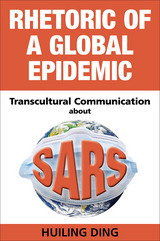 Rhetoric of a Global Epidemic: Transcultural Communication about SARS
Huiling Ding
Southern Illinois University Press, 2014 2016 CCCC Best Book Award in Technical and Scientific Communication
In the past ten years, we have seen great changes in the ways government organizations and media respond to and report on emerging global epidemics. The first outbreak to garner such attention was SARS (severe acute respiratory syndrome). In Rhetoric of a Global Epidemic, Huiling Ding uses SARS to explore how various cultures and communities made sense of the epidemic and communicated about it. She also investigates the way knowledge production and legitimation operate in global epidemics, the roles that professionals and professional communicators, as well as individual citizens, play in the communication process, points of contention within these processes, and possible entry points for ethical and civic intervention. Focusing on the rhetorical interactions among the World Health Organization, the United States, China, and Canada, Rhetoric of a Global Epidemic investigates official communication and community grassroots risk tactics employed during the SARS outbreak. It consists of four historical cases, which examine the transcultural risk communication about SARS in different geopolitical regions at different stages. The first two cases deal with risk communication practices at the early stage of the SARS epidemic when it originated in southern China. The last two cases move to transcultural rhetorical networks surrounding SARS. With such threats as SARS, avian flu, and swine flu capturing the public imagination and prompting transnational public health preparedness efforts, the need for a rhetoric of global epidemics has never been greater. Government leaders, public health officials, health care professionals, journalists, and activists can learn how to more effectively craft and manage transcultural risk communication from Ding’s examination of the complex and varied modes of communication around SARS. In addition to offering a detailed case study, Rhetoric of a Global Epidemic provides a critical methodology that professional communicators can use in their investigations of epidemics and details approaches to facilitating more open, participatory risk communication at all levels.
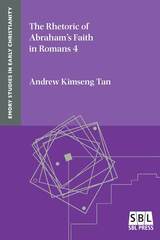 The Rhetoric of Abraham's Faith in Romans 4
Andrew Kimseng Tan
SBL Press, 2018 Explore Romans 4 from a sociorhetorical perspective
Andrew Kimseng Tan examines Romans using sociorhetorical interpretation to determine how Paul attempted to alleviate dissension between Judean (or “Jewish”) and non-Judean (or “gentile”) Christians. Through his analysis of Paul’s rhetoric, Tan reveals that Paul used Abraham’s faith in Genesis to demonstrate that the both groups were equally children and heirs of Abraham whose acceptance by God was through the same kind of faith that Abraham possessed, not through the Mosaic law, which Judean Christians claimed gave them a special honored status with God.
Features
- A model for the application of sociorhetorical interpretation for analyzing close readings of biblical texts
- A demonstration of the persuasive power of Romans 4 through the use of sociorhetorical interpretation
- Exploration of the relationships between important theological topics such as resurrection, the Mosaic law, the Holy Spirit, righteousness, ethical living, and eschatological salvation
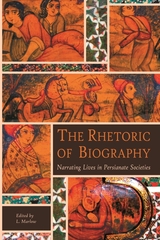 The Rhetoric of Biography: Narrating Lives in Persianate Societies
L. Marlow
Harvard University Press, 2011 In the context of a growing scholarly literature devoted to the topics of biography and autobiography, especially in the Arabic literary tradition, the essays in this volume explore the forms and meanings of these genres with particular reference to Persian writings, as well as to writings in Arabic and Turkish that were also composed in Persianate societies.
The authors address, among other topics, biographies and autobiographies of women; biographies of specific occupational groups, such as poets; the relation of traditional “lives of poets” to the reception of their literary works; intertextuality across biographical and autobiographical writings and across languages; and the processes involved in translating written biographies for the contemporary television screen.
Readers are invited to glimpse the lives of figures from the past and to appreciate the historical, cultural, and literary contexts that shaped their biographical and autobiographical narratives, and to reflect on the continuing significance of these narratives into the modern era.
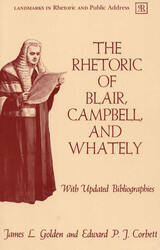 The Rhetoric of Blair, Campbell, and Whately, Revised Edition
James L. Golden and Edward P. J. Corbett
Southern Illinois University Press, 1990 Hugh Blair, George Campbell, and Richard Whately, whose works were first published in the late 18th and early 19th centuries, constituted the great triumvirate of British Rhetoricians. For 20 years, earlier printings of this book, which contains substantial excerpts comprising the most significant portions of their writings, have been widely used as textbooks in history-of-rhetoric courses. An increasing interest in rhetoric at the college level has created a renewed demand for reprints of such classic primary texts. The Preface places the three rhetoricians within the context of the rhetorical tradition, which began in 5th-century BCE Greece. The bibliographies have been updated to include 20th-century scholarly work on Blair, Campbell, and Whately, and on the 18th- and 19th-century rhetorical movement. Biographical sketches of Blair, Campbell, and Whately are also provided.
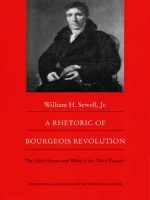 A Rhetoric of Bourgeois Revolution: The Abbe Sieyes and What is the Third Estate?
William H. Jr. Sewell
Duke University Press, 1994 What Is the Third Estate? was the most influential pamphlet of 1789. It did much to set the French Revolution on a radically democratic course. It also launched its author, the Abbé Sieyes, on a remarkable political career that spanned the entire revolutionary decade. Sieyes both opened the revolution by authoring the National Assembly’s declaration of sovereignty in June of 1789 and closed it in 1799 by engineering Napoleon Bonaparte’s coup d’état.
This book studies the powerful rhetoric of the great pamphlet and the brilliant but enigmatic thought of its author. William H. Sewell’s insightful analysis reveals the fundamental role played by the new discourse of political economy in Sieyes’s thought and uncovers the strategies by which this gifted rhetorician gained the assent of his intended readers—educated and prosperous bourgeois who felt excluded by the nobility in the hierarchical social order of the old regime. He also probes the contradictions and incoherencies of the pamphlet’s highly polished text to reveal fissures that reach to the core of Sieyes’s thought—and to the core of the revolutionary project itself.
Combining techniques of intellectual history and literary analysis with a deep understanding of French social and political history, Sewell not only fashions an illuminating portrait of a crucial political document, but outlines a fresh perspective on the history of revolutionary political culture.
|
|
